#not because of any moral high ground but because I feel like a fail film student if I don't pick up on these things
Text
Ignore tag venting about 20 year old pirate films </3
#I am tags rambling in 2023 but I've been analyzing myself about my selective watching of potc#and like why am I overlooking Davy's flaws and misogyny#and I think it's because after Barbossa's behavior in 1 the bar for misogyny became underground for these films#so everyone that didn't threaten women with assault like three times in the movies runtime (like Barbossa)#was already fine in my book#like when Barbossa set that bar Davy could clear it easily because he doesn't do anything like that despite being an abusive ass#its a matter of perspective#also in the deleted scene I feel like Wills like -choose the right woman- was a bit worse than like#what usually will does since will is the only non misogynistic char around#I don't know I spent the whole night lowkey thinking about this shit for no reason#not because of any moral high ground but because I feel like a fail film student if I don't pick up on these things#and let them slide bc of my own emotions#I am pretty sure I can tear into Davy's character and point out the shitload of unlikable qualities#but I just don't want to#and sadly I also wish Barbossa wasn't like that in 1 because I wanna like him and that's the only way I can
6 notes
·
View notes
Note
i feel kinda bad for shl cos all the fans of hyx and spl are blaming shl since their dramas are being delayed :(
LMAO I really don’t get that altho i can see that the timing might be a little back to back, and i’m not a SHL-only stan by any measure but:
For HYX especially,
Firstly it was already having problems since the end of last year with censorship and review. This is mostly due to the reason that 2ha is a pretty big fandom and is the cult fave in the danmei industry - what this means is that there are three types of fans basically right, (1) Normal fans who love the novel + show (2) Those who fanatically love the novel in some extreme ways haha (3) Those who hate it and/or are HYX-onlys - so you get it all in a bag.
The first type of fans is definitely the easier ones to deal with, but unfortunately in big fandoms you get a lot of (2) and (3). It’s not something that’s exclusive only to 2ha/HYX but because it’s a cult fave, and a controversial one at that, problems definitely arise.
(2) are the ones who head down to the filming scenes, take photos and footage despite crew telling ppl not to do it, not to sneak around filming sites and definitely not to leak photos or footage. They do it anyway. Yeah sure of course it’s a couple of photos every few weeks or a tiny video every few weeks but word gets out. They’re inevitably hurting the show and the fandom with their actions, because shit trends on Weibo really fast, and the censorship committee (not just for the film industry or shows) is always lurking on the site to catch any sign of you know, hate speech for the country etc. and more. Not related, but the point is that social media is watched very closely. It’s not a myth or an exaggeration, you really just got to be careful, and HYX is a show that, despite not having been broadcasted, has consistently trended on Weibo over the last few months. Not always because of leaks, but yeah, HYX is in everyone’s faces. Fans themselves put a fucking huge spotlight on the show BEFORE we even have any content at all, and of course this isn’t enough to like create huge trouble for the show but then we have-
(3), which I believe creates the most trouble - the thing is 2ha and meatbun who wrote the book, has a long line of haters and antis, way before HYX came into the picture. I shall not go into details of how I’ve seen some big accounts on Tumblr here spit vitriol at the book without even reading it just based on the content/trigger warnings and playing the morality card (and I think most ppl who’ve followed me for a while know just what I think about that). Like this was way before any footage or leaks or even HYX being a thing came about - as a cult fave it has its share of haters, and this share is a huge. There are those who get off on their moral high grounds XD and I think especially these ones are the most troublesome, all they have to do is report that HYX is immoral, bad for culture etc. etc. hahaha and yeah the censorship team is always ready to step in on reports, especially on BL stuff.
And of course the larger part is the change in censorship processes - honestly even way before SHL came out in end Feb, HYX was no closer to getting passed by the review committee than it is now. Maybe yes, SHL scenes may be now used as reference for comparison but seriously? People are deluding themselves if they thought pre-SHL HYX was going through the review process smoothly and only hit roadblocks after. I mean, we’ve all seen the leaks, some of them are truly like god-tier scenes that may be hard to explain away. It’s not like they can repackage the script especially because they have to submit everything to the review committee.
I mentioned this in a post yesterday but how SHL passed reviews is due to the fact that they didn’t have to submit a full script. They only had to submit a partial script, and that makes a world of difference. Basically a team, under these requirements, can repackage the script to include the more het looking parts even I feel, and of course some heavy misdirection by the team, it could work. Now that you have to put an entire script up for scrutiny.. I mean, it’s hard. This is just a game of probability.
And the last reason I think is still Tencent. Honestly, I’ve never seen a huge ass MNC like this handle a show this terribly.
1. No control over leaks - This is honestly the dumbest shit to do
2. Terrible crisis management response time - When fans leak footage, it’s standard and practical business sense to control it IMMEDIATELY. They shouldn’t just leave it up to the crew to put up notices and as the company that owns the rights to the show, it’s up to them to possibly threaten legal action as well. Basically a sterner stance would have helped a lot, but Tencent is a motherfucker of a company who only cares about free marketing and publicity without any considerations over impact to the show itself
3. Terrible at communicating with fans - Seriously, I’ve never seen a company or team that’s been this bad at confirming delays etc. and providing updates about a show. I understand that it’s mostly due to them not wanting to affect the review process or create more chaos within the fandom but lmao Tencent allowed the hype to build so much and then goes absolutely silent at crazy rumours. I mean we had to find out about a delay from Cai Bao, their cat mascot, like??? In a really veiled and poetic message that didn’t outright say the word ‘delay’ like damn these ppl have a lot of time
As for SPL,
Lol we don’t know anything about this show. We don’t know if they took out or left in the Yifu part that would supposedly make it less gay or whatever, we don’t know anything about how gay it should have been or could have, so this one might be a tad more ridiculous. I mean none of us have seen any good leaks, and we haven’t seen any of the script, we got ZERO idea about this. Maybe they really went hard on the bromance, how would any of us know hahaha so all the more it’s like people have zero basis to go on, to say that it’s because of SHL. Seriously, everyone’s shooting in the dark.
Technically if laws didn’t change last Feb, I think SPL/WIK should have been passed in the same way as SHL did, but it’s just inopportune time for them.
===
- So tl:dr HYX already had tons of problems, that I doubt were going to go away just because SHL didn’t air, honestly. For SPL, it’s really hard to tell what failed the review, because none of us know what’s going on in the script.
No one cared about SHL, even I only realized the show was airing on the day itself and then made a rec post after I watched the first 4 eps. And if it truly was anything to do with SHL, I’m telling you that the first thing the censorship committee will do is basically shut SHL down, get Youku to take it off sites etc. until it’s reviewed again etc. etc. That hasn’t happened yet, at least not before HYX and SPL were stalled.
===
ALSO!! Don’t have to feel sorry for SHl fans hahaha I’m telling ya a lot of us definitely weren’t OG SHL or TYK fans, seriously! All the bigger accounts I see on Twitter are a combination of CQL/SHL or MXTX/SHL, SPL/SHL and I am personally 2HA/HYX/SHL. The fight is all out on Twitter HAHAHAHA but it’s not that bad, we’ve all got practice. Seriously WHO ACTUALLY is an SHL only stan I’ve honestly not seen much?! HAHAHA the point is we’re all yelling on behalf of SHL as a cross fandom fan, easier for us to do so as well. We’re talking about 2ha/HYX/SPL/Priest dedicated accounts that delved deep into SHL championing for no-nonsense in the space hahaha
#asks#shl#hyx#spl#and while i've never worked for the chinese film industry#i was in film and production#so i half know what i'm talking about#and i did ask a friend who works in a chinese film company#and yep ;/#if you need to know how disastrous big companies are#tencent is a prime example
135 notes
·
View notes
Text
The Power of the Dog
A charismatic rancher inspired fear and awe in those who surround him. When his brother brings home a new wife and her son, his cruelty towards them takes an unexpected turn.
The Power of the Dog is a film that has been generating an insane amount of Award buzz over the past couple of months. The film is expected to be nominated for several Oscars from the Academy. After many critics called it a modern masterpiece, I decided to delve into this Oscar bait feature film. After my initial viewing, I would say that it was a masterpiece, but after thinking about the film for a bit, the more mixed my feelings become.
Director Jane Campion has crafted a very different modern western that feels like a breath of fresh air to the genre. From its story to its characters, so much of this film feels incredibly grounded. Unlike many others, I liked the slow-burn pace of this film. The pace really allowed me to sink into the world that these characters live in. Now in a good chunk of scenes, there was truly some clunky western dialog, and some pretty bad directing on Campions part that sticks out like a sore thumb in this film. In the quieter scenes is where Campion shines at directing. However, at the end of this film, it felt like I wanted more because the film kinda leaves you hanging there. I wanted to know more about our characters and the fallout of the events at the end of the film.
The acting in this film is overall very good and I am expecting a couple of Oscar nominations for some of the performances. However, it felt like for nearly everyone, while they were talking they were doing the best they can for the strange western dialog. Nevertheless, in the quiet moments, everyone's acting really shined through. The two outstanding performances of the film came from Benedict Cumberbatch and Kristen Dunst. Both of them truly shine in this film. I was quite unsure of Kodi Smit-McPhee's performance, up until the end of this film when his acting chops really shows. He was able to stand his ground against Cumberbatch and Dunst, and he truly deserves some recognition for it.
Everything, with the Power of the Dog, is incredibly immersive. The gorgeous prairie landscape is supposed to be Montana but is clearly New Zealand looks absolutely stunning. The cinematography is absolutely gorgeous and it perfectly captures the hostile life of a cattle farmer. The production design is outstanding. The costumes are beautiful and look period accurate. Furthermore, it was quite refreshing to see farmers being filthy, instead of squeaky clean. The score felt very repetitive at many points. It felt like the filmmakers thought that they needed it to create tension within a scene when in reality they already had it and the score became annoying.
What truly annoyed me with this film, was the leading up to its release, the filmmakers talked about how this film was going to conquer the topic of toxic masculinity. However, I was left wondering where was it because all I saw was a man who was a product of his time. I was expecting to see a man who was both physically and emotionally abusive to everyone around him, but he was not any of that. Does he have his bad moments, yes, but we all have our bad moments. Is Cumberbatch's character a good man, by today's standards, no not really, but in the 1920s this was acceptable behavior. It drives me nuts when we take a moral high ground when it comes to history when we fail to understand that they were a product of their time and that you would have done the same if you grew up back then. If the filmmakers decided not to make such a big deal about how their film was going to be centered on toxic masculinity, then I would be not making these comments.
Overall, the Power of the Dog is a good film. However, it is brought down by some awkward dialog moments and the film taking the moral superiority when it comes to history. If the film just focused on its story and its characters, then it would have been much better.
I am giving, The Power of the Dog, a B.
#film#cinema#movies#cinephile#cinematography#filmmaking#filmmaker#film community#cinephile community#film festival#adaptation#book adaptation#oscars#academy awards#western#modern western#lgbt#social commentary#the power of dog#film review#movie review#film critic#film criticism#benedict cumberbatch#kristen dunst#kodi smit mcphee#jane campion
13 notes
·
View notes
Note
So like I really like Steve and all and he's definitely got the right heart and that's what fandom likes about him, how he stood up to bullies and injustice with his fist raised. But recently I've rewatched avatar and Aang got me thinking, is going against the world fist ready really the right thing. Like Aang was no coward he still stopped Ozai but in most of his battles he tries for peace first. In fact Avatar as a whole talks about change in people.
Like Sokka turned from misogynistic to respecting women, and Iroh's love and patience redeemed Zuko. As much as I love Steve Rogers, fist fighting bullies and getting your ass handed to you or successfully beating them to a pulp isn't going to change them, and it sends a wrong message of fighting fire with fire and bullies don't learn when you punch them usually they get pettier. I agree Steve is right at not letting injustice go be it canon or fandom but Iove that scene in avatar when Aang got into a fire nation school and when a guy tried to fight him he was just like nooope but still managed to be on top as opposed to Steve (maybe just fan fic ver) who would try a punch. I mean I can see Steve screaming at the lies of the fire nation school instead of calmly informing the truth and throwing a dance party. Like Aang might be too pacific sometimes but is charging against people really a good lesson. Stand for what's right, but like in a chill way. And I'm not sure if this is just the fandom version of Steve but in TFS we did kinda see him in an alley fight against a just a ride guy. Sorry about the long rant but what do you think about Steve's fight me attitude being completely glorified in his fandom.
I apologize that I’m gonna gonna get a little long-winded here!
I agree with you that peaceful solutions are great to try first, but when it comes to this punch-happy version of Steve you reference, I think you’re kinda looking at a strawman version of the character, anon -- maybe from poorly-written fic or memes, but not exactly the Steve of film or comics.
Now, the respective approaches of both Aang and Steve are in part a product of the media they originated in. A show aimed at kids with a single overall plotline and arc is often going to aim for a peaceful solution and allow for linear character growth -- while comics, movies and shows developed around a character specifically designed to punch Hitler as a statement during WWII are less likely to have a core message of pacifism, and their structure and circular timelines make growth arcs more difficult to sustain. This doesn’t mean one character’s approach or the other is superior, just that they come from different contexts, narratively and in terms of medium. Plus, there are different kinds of fights, and not all are going to offer us the same options as solutions. Looking for ideological purity -- only ever opting for the ‘right’ solution -- can often lead to doing nothing when no ‘right’ solution presents itself, which can result in more harm than taking a less-than-perfect action.
Let us not forget that when an authoritarian army showed up to kill everyone and wipe out the North Pole, Aang does go all Koizilla with the ocean spirit and wipes out the Fire Nation fleet. Aang has fought people. Aang, albeit with the alibi of “a spirit was in charge”, indirectly kills people (Zhao ends up pretty dead as a direct result of Aang’s spirit rampage). This isn’t particularly glorified, but at the time there isn’t a better outcome presented. Doing nothing would have led to the massacre of the Northern Water Tribe.
That said, I LOVE ATLA and its messages of growth and compassion and I think it’s great to have a protagonist who opts to give people a way out.
...Which is what Steve does.
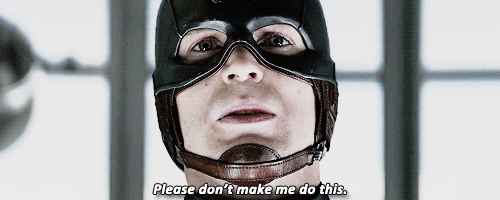
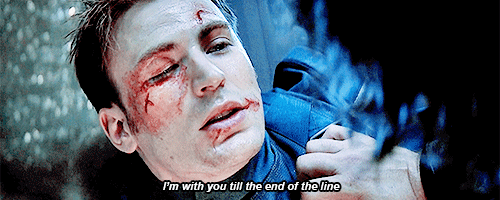
We see Steve do this more than once. In CA:TWS, Steve recognizes Bucky and tried to get through to him, to avoid a fight. One ensues, but Steve then refuses to fight him anymore once he’s disabled the helicarrier and saved everyone else, willingly putting his own life on the line to gamble on some part of Bucky’s inner self being in there and worth saving. He isn’t willing to put the lives of other innocents and noncombatants on the line -- protecting them is a priority, even if it means fighting Bucky -- but once that factor is out of the equation, he drops his shield and tries to reach him.

In the same movie, a few scenes earlier, Steve appeals to the personnel of SHIELD -- an organization that has labeled him a terrorist and been hunting him -- and paints out the reality of the situation, giving the good people within the opportunity to react and rebel against the element of HYDRA that has infiltrated -- which they do! But there isn’t a magical lionturtle showing up to tell him how to stop the helicarriers from taking off and murdering millions of people without any casualties, so, yanno. He does what he can.
Heck, Steve is occasionally teased by other characters for his speechifying -- not just to give pep talks, but to try to get through to people. He does this in the comics a lot. You’ve probably seen this page going around:
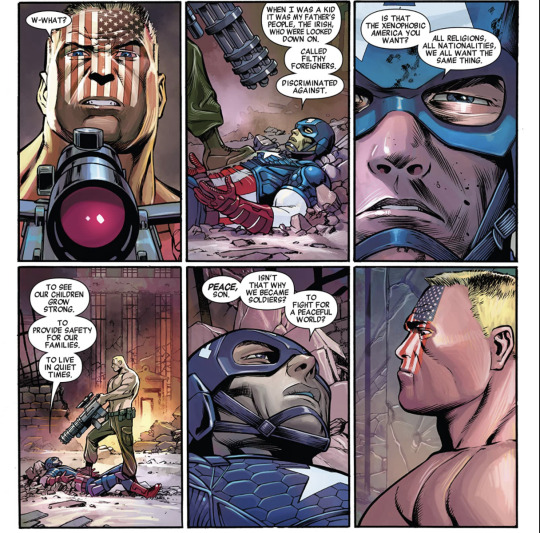
It doesn’t always work out. But he tries.
You suggest Steve would punch someone who was wrong in Aang’s Fire Nation School, but I don’t agree with that reading on the character based on what we see Steve do. Steve very rarely is the one to completely initiate a fight. Usually he is reactive. He sees a situation where someone is being a jerk, points out the injustice, and if the person is insisting on hurting someone, Steve inserts himself to make sure it’s him instead of anyone else. Whether the jerk in question is a single bully or an entire army.
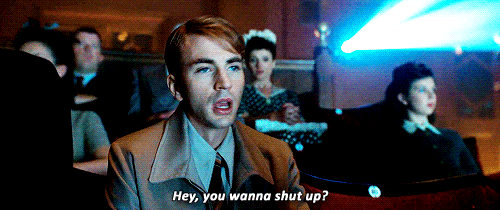
You bring this scene up, but when Steve confronts the guy heckling in the movie theater (who is making a woman cry, I’ll add), it’s clear from the man’s posture when he stands up and Steve’s look of dread that while Steve has spoken up, the escalation to violence is not his choice. When we see him a moment later in the alley, he’s fighting defensively -- drawing the man’s ire, keeping him distracted. Steve is reactive in this entire scenario -- not the instigator. (and I think if Steve had Aang’s airbending, he’d love to dodge more punches instead of getting his ass kicked!)
The fact that Steve’s primary weapon is a shield -- a symbol of defense, not offense -- speaks to the fact his entire MO is protection. Violence not for violence’s sake, but to intervene in existing violence when there is no other recourse.

But Steve also admittedly has a stronger sense of responsibility than Aang does at the series’ start. Aang dodges, but he also gets called out by other characters for running away from a lot of his problems instead of confronting them. Steve, if he were a bender, I think would likely be an Earthbender like Toph; solid, stubborn, listening and reacting (though ironically, he would lose his shit over the willful obliviousness and apathy of Ba Sing Se’s leadership). Steve feels a deep personal duty to always be in the thick of it where things are already at their worst.
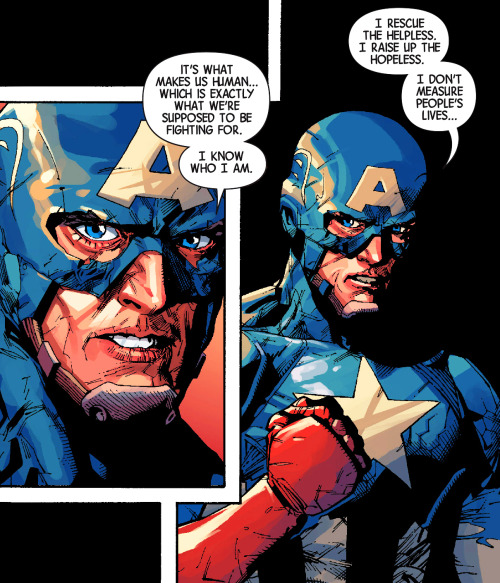
If there had been no deus ex machina energybending option presented at the eleventh hour, would it have been better for Aang to die and doom the world than to compromise his morals and kill the Fire Lord? It’s a question of hypothetical principles vs reality of harm in that instance. Aang as a character is allowed by the story to adhere to his principles and get a happy ending. Steve as a character does his best, but ultimately has to compromise with reality when he has to, when it’s not just his life at stake, but many others should he fail to act in time. In those high-stakes scenarios, his cards are often limited.
Steve as a character doesn’t arbitrarily start fights. But he goes to where the status quo is untenable, or where a fight is already raging, and he takes a stand. If he can convince someone to step down peacefully? That’s ideal! But usually by the time Captain America has shown up, there are megaweapons primed and loaded and fascists already hurting people or robots trying to destroy the planet or a Titan about to wipe everyone out, so the ideal option is rarely still on the table. No dance party is gonna be enough to change Red Skull’s crazy nazi mind about killing everyone (which is too bad, because I’d love to watch Steve do the lindy hop). There is no ‘chill way’ to stand for what’s right at that point.
And ultimately, I think we need both kinds of characters! I think it’s important to encourage diplomacy and compassion, to urge people to find common ground and to find nonviolent ways of diffusing and deescalating situations. To look at things from other perspectives, and to give people the option to learn and grow and be better than they were. I love a good rehabilitation arc, and think ATLA does this beautifully and has incredibly important messaging and philosophies.
But I also think we need stories that say, hey, when those options aren’t on the table? When no one is listening no matter what you try to say, when you’ve looked for a way around it and no lionturtles have showed up to save your ass? Sometimes, you have to put yourself in front of the guy swinging punches and raise you shield and stop him. Sometimes you don’t get the nice options that make you feel good; sometimes the world is messy and ugly; but sometimes, even if we can’t do the ideal thing, we can still do the right thing. Take action and put an end to the perpetuation of violence in the moment to protect the helpless. (Then work on rehabilitation and communication.)
#lena has thoughts#meta#avatar: the last airbender#steve rogers#captain america#Anonymous#lena answers things
253 notes
·
View notes
Text
tianshan drabble. 💞 on behalf of an anonymous donation to the BLMUK organisation, this was created (with permission) for Eylül @eed752. if you would like to donate to an organisation supporting black lives in return for a drabble, please see here for more information. 🌸
tags: chef!guan shan, media exec! he tian, reality TV.
tw: non-consensual kissing
///
‘I don’t need your fuckin’ help,’ Guan Shan says, teeth gritted. ‘I didn’t ask for it.’
On the other side of the resaurant’s foyer, Zhengxi lowers the camera. He’s familiar with Guan Shan’s belligerence, and he knows when to stop rolling without waiting for anyone’s call. He turns to He Tian, who’s already making his way over to Guan Shan while he rolls up the cuffs on his shirt sleeves. His smile is tight.
‘Do you want to say that off camera, hm?’ he says quietly, when he’s only a few feet away. There’s something sharp beneath his words that makes Guan Shan’s spine straighten. ‘Stop being a prima donna because you don’t want to follow my suggestions. You and I both know you couldn’t do this without the show.’
Guan Shan looks away. This. His father’s old restaurant had been an empty husk until he bought it, the inside like walking into a warzone. There was graffitti on the walls, smashed crockery covering the floor, burst pipes in the bathrooms and kitchen, some scene from an apocalypse movie.
The PAP had done nothing with it since they seized the property fifteen years ago; when it came to auction, Guan Shan bought it without thinking, emptying the savings he’d been stockpiling from his job as a waiter. He’d planned to give half to his mom and pay off her mortgage.
He doesn’t have the money to rennovate now, or to repair. He barely has the strength not to revisit the memory of the raid each time he walks through the restaurant doors, bile burning his throat, nausea rolling through him as if he’s at sea. Sometimes, it feels like it, the earth unsteady beneath his feet, his surroundings beginning to spin, a high-pitched ringing starting to keen in his ears—
‘Hey,’ He Tian says, brows drawn in. ‘Hey, did you hear me?’
Guan Shan mumbles something, and his expression must throw He Tian enough because he calls out for a break in the shooting. The crew lower their cameras and mic booms—Take five! someone shouts—and a caterers rolls out a trolley with cans of soft drinks and snacks.
Guan Shan doesn’t go to it; nor does he collapse into the fold-up chair that has his name printed across the back. Instead, He Tian grips him by the elbow and steers him, not ungently, out of the main restaurant and towards the kitchen.
It’s a building site still, most everything covered in sheets of plastic and a dusty layer of concrete residue. They’ll start filming this part of the show in a couple of weeks, and use a demo kitchen for now while they work on the recipes for the menu. It’s the nature of the show—Overhaul, it’s called, building someone’s business quite literally from the ground up.
You couldn’t do this without the show, He Tian had said. He’s right. Guan Shan couldn’t have afforded anything on the scale that He Tian is giving him. That’s the whole point of this fucking venture. The furniture, the esteemed clientelle, a Shanghai-based HR agency to find the staff. Some chef from SHIC will help him with the menu, and his contract promises the review of a Black Pearl critic who will visit a year after opening. The restaurant will be a success, by default of He Tian’s purview. He’ll allow nothing else to damage his name.
When the kitchen doors swing to a close behind them, He Tian releases Guan Shan and leans against an old counter with his arms folded. He’s frowning. In here, with the dust and the absence of windows, Guan Shan finds it difficult to breathe. He rubs at his chest, easing a pressure that refuses to dissipate. He’s trying to imagine himself running this place one day, cooking in here, where his father used to—and he fails.
‘You asked for my help,’ says He Tian, slowly. ‘You went to Jian Yi, who came to me. You signed the contract. You agreed to this.’
‘I know what I fuckin’ agreed to,’ Guan Shan mutters.
He Tian is unimpressed, and Guan Shan realises he hasn’t brought him away from the eyes of the crew because he pities him. He’s just making an attempt not to air any dirty laundry. He’s being professional.
He says, ‘Then you can stop with the chip on your shoulder and stop being a bitch to the rest of the crew. They’re not your enemy. Neither am I.’
‘I’m not—’
‘If you want sympathy, then play it up. Start crying. I don’t give a damn—the audience will love it.’ He Tian stares at him flatly. ‘Maybe at the end we can have a father-son reunion—’
‘Don’t you fuckin’ dare,’ Guan Shan growls. The thought sickens him. Already, he knows that his father might see this in the papers, or have access to the show on the prison’s communal TV’s. Guan Shan hasn’t told him. He hasn’t visited in over a year. By the time the show airs, He Tian’s name will be emblazoned in lights; it wasn’t written in the contract, but the restaurant will become He Tian’s has much as it has ever belonged to the Mos.
‘You’re in the entertainment business, Mo Guan Shan,’ He Tian reminds him coldly. ‘You should take what you can get and don’t stop.’
‘Is that what you’ve done?’ Guan Shan sneers.
‘Isn’t it obvious? Look at me.’
Guan Shan is looking. He’s spent two months looking, and he could spend even longer doing so, if only for the fact that he doesn’t want to. His preocuppation with the looks of a pretentious media executive worth millions is really fucking unfortunate. He hates himself for it.
Granted, sometimes things are good. Sometimes they joke with each other and have moments off-camera that make Guan Shan’s spine tingle. Sometimes he thinks He Tian’s hand touches him when it shouldn’t, and sometimes Guan Shan’s eyes linger longer when they shouldn’t, too. There have been no sordid, insidious rumours staining He Tian’s name as with other media execs in the industry, but that means nothing. He Tian has the money and charm to keep it quiet. Probably, He Tian plays this game with all his entreupeneurs. Probably, Guan Shan is being fucking stupid. He hates himself for that, too.
‘I don’t wanna be like you,’ Guan Shan tells him eventually. ‘You look at people like they’re ratings.’
‘Spare me,’ He Tian remarks dryly. ‘If you had enough of a moral backbone you wouldn’t be using me at all for this. You would’ve worked and worked until you had what it took to make this place work.’ He smiles, almost tenderly. ‘And even then it wouldn’t be enough.’
‘Fuck you.’
‘No, fuck you, Mo Guan Shan. You’re going to be whatever the camera makes tries to make you.’
‘You mean what you make—’
‘Shut up. Do you want to be the arrogant, angry chef with an overruling passion for food? The kid from a broken home with too-high dreams of running a business? Is this all some grand venture to repair your paternal relationship? Or maybe something else entirely. You have the opportunity of a life time. If I were you, I’d think about taking it.’
Guan Shan opens his mouth to argue, and He Tian swears—in frustration, in anger, in bemused disbelief that Guan Shan still won’t back down from the fight when he knows he’s lost. The outcome was pre-determined, and Guan Shan’s still wincing at new bruises and spitting blood onto the tarpaulin of the derelict kitchen.
He can only stare as He Tian marches forward, and he only thinks to take a step back when He Tian is a few feet from him— In front of him now— Grabbing his shoulders with two hands—
He Tian’s kissing him.
He Tian doesn’t wait for Guan Shan’s too-slow reaction. He takes what he wants, pillaging the intimacy, tongue forcing itself between Guan Shan’s lips—and lets him go. Immediately after, He Tian staggers back slightly, narrowly avoiding the fist that swings in his direction.
Guan Shan heaves. He doesn’t have the energy to try a second time. ‘You—’
‘There,’ He Tian says thickly. ‘File for harrassment. Put my name down in the mud and rebuild yourself from the ashes.’
‘You fuckin’... You...’ Words fail him. His head is reeling.
He Tian lifts his hand as if to wipe his mouth with the back of his hand, but his fingertips linger on his lips. His face is slightly flushed.
‘I’m giving you power over me.’
He says it like an apology.
‘I’d never win,’ Guan Shan chokes out. ‘Me against you in court? I’m nothin’.’
‘I’d agree with your story. If nothing else, I’ll pay out a settlement fee and you can do this whole thing yourself.’
Guan Shan shakes his head. His mouth feels bruised. The worst part is that he’d imagined this before. Different. Better. He’d wanted it. No, the worst part is that he wants it still.
‘Still dirty money,’ he whispers.
‘It doesn’t have to be,’ says He Tian. Guan Shan realises he sounds a little shocked—as if he hadn’t had control over his actions. As if he hadn’t expected its consequences. Guan Shan realises: He Tian hadn’t done this with the others. ‘Make your choice, Mo Guan Shan. You can quit, you can file a claim—or we can carry on and get this thing finished.’
‘Shit,’ Guan Shan breathes, dragging a shaking hand over his face. ‘How the fuck am I gonna just... carry on after you...’
He looks to He Tian, expecting some cool answer, something stemmed from exploitative experience, but He Tian only grimaces and says, ‘The same way I’ll have to.’
///
🌸 in the footsteps of @nightfayre’s wonderful initiative, i’m filling any drabble requests following a donation to causes in support of black lives. please read here if you would like more information! ✨
80 notes
·
View notes
Text
kdrama rec/review: into the ring
KDRAMA AND CDRAMA MASTER LIST OF REVIEWS
Series: into the ring
Episodes: 16
Genres: politics, comedy, romance, slice of life, some drama (not a ton)
Spoilers in the Rec: minor ones/for the set-up
If You Like, You’ll Like: parks and rec but if it was about 15% hornier and had inhaled a bunch of helium, women who top, and underdogs fighting for good causes or whatever
Rank: 9/10
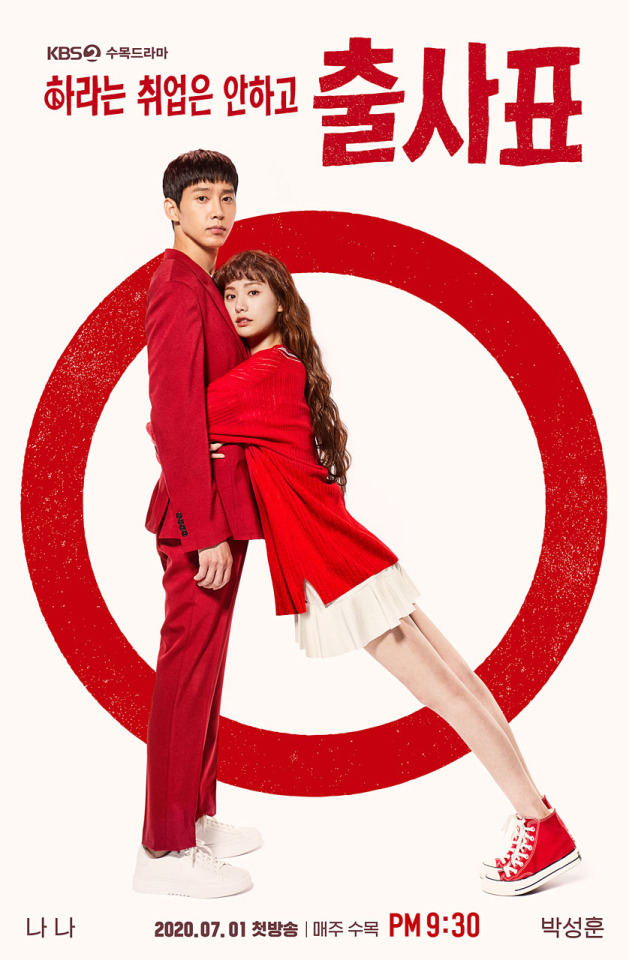
PREMISE
seo gong myung is a civil servant, punches in and out of work directly on time, and has the vibe of the kid in class who reminds the teacher that they forgot to collect the homework. initially part of the planning and finance division, he ruffled one too many feathers by holding the higher ups accountable and got demoted. now, he sits at a desk and answers civil complaints from an anonymous, online nemesis--who goes by the alias of The Tiger Moth.
goo se ra goes by the alias of the Tiger Moth and files constant civil complaints. unable to hold a job and lacking in Credentials, she spends a lot of her time getting riled up about lost causes, chasing down people who litter, and barking at civil servants because she’s an underdog, god damn it. finally, one job opportunity that lines directly with her interests appears: running for office to represent her district
inevitably gong myung and se ra’s paths cross. and they fight motherfucking crime
mostly through documents
but still
fighting motherfucking crime
MAIN CHARACTERS
goo se ra
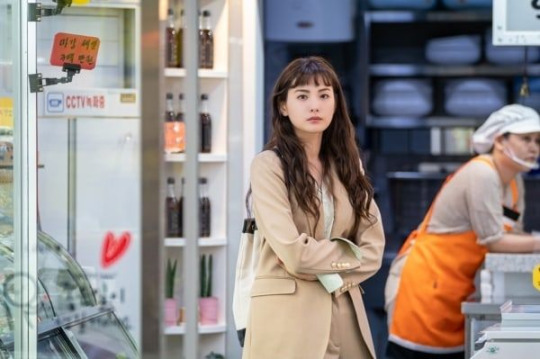
the main heroine of the story, se ra is the perfect candidate for public office: she’s passionate about civil affairs, stand her ground, and she really cant hold down any other job. motivated by the high yearly income (which amounts to about 50k in USD, the world is a nightmare), se ra sets out to secure her spot representing the district she’s lived in her entire life.
justice first, think later. living embodiment of do no harm but take no shit. tops. big time.
gong myung
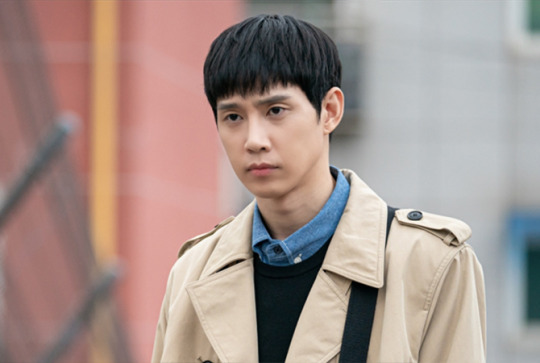
a mid-ranking civil servant, gong myung is seemingly content to live a straightforward, dry life while wearing a satchel until ser ra essentially bulldozes her way into it. very much a letter of the law type of guy, he gets caught up in se ra’s campaign and the chaos that follows it and finds his life changing because of it.
you think he’s going to be an asshole but he’s actually a precious little nerd man. will cradle se ra’s closed fist as gently as a baby bird because he is s o f t. overestimates his ability to seduce away someone’s financial records.
SOME SUPPORT CHARACTERS
jo maeng deok
a long-established politician and a classmate of se ra’s father. he’s got some backstory with other characters but i dont want to spoil. major asshole.
kim min jae
se ra’s boyfriend of 9 years who works as a secretary for jo maeng deok. puts work over love and willingly walked away from se ra’s sexy anniversary party so something’s clearly wrong with him, morally. his actor played the sweet, tragically dead boyfriend from be melodramatic which caused a lot of cognitive dissonance
yoon hee soo
fabulous councilwoman who is also an attorney who also has amazing hair. a little ambivalent about her own moral code, but i mentioned the hair, right? great hair.
goo young tae and kim sam sook
se ra’s parents. i feel like anything i say will ruin some pleasant surprises, so just know that they are awesome and i love them and it’s clear chaos is an inherited trait.
kwon woo young, jang han bi, and kim ja ryong
se ra’s #squad who become her campaign team and motivational support, consists of a young mother trying to get back into her finance career, a former judo champion with a tragic past sports match, and a literal child who just kind of hangs out with them after se ra stops being his babysitter
Drawbacks
this might just be a translation/cultural exchange issue, but there were points where i was completely lost as to what was happening with the #Politics side of things--mainly in the back half. sometimes the politics plot wasn’t as interesting to me because of that
Reasons to Watch.
it’s just so goddamn weird? the filming style is something i haven’t seen in a kdrama before, and it fits the tone and characters so well. there’s such a consistent style of humor throughout that i loved, and the reaction shots alone can be so A+++
the characters fail sometimes. but it’s not a desolate thing. it shows that they’re scrappy and they come back after every defeat. the tone/message of the show is consistent from start to finish in a way most shows don’t do
but really it’s about the otp. it’s all about the otp. here’s so many subversions of typical kdrama tropes. i will attempt to demonstrate with some examples, some spoilers ahead:
se ra sees gong myung with another woman late at night. sounds like it’s time for MISCOMMUNICATION. but no, he comes up to her and literally says “I don’t want to be misunderstood” at the end of his explanation (keep in mind they weren’t even dating yet)
despite being like 4 feet shorter, se ra pushes gong myung against the wall with sexual tension multiple times. lmao and his knees legit buckle. i love them
the couple gets together about halfway through, stays together, and are a gd team throughout
gong myun is willing to be her secretary, and there’s no drama about him feeling emasculated over it
also there’s just so many adorable things about their body language? se ra often stands in front of/physically shields gong myung from things or people and he does the same (although less often, because se ra #protects), and the aforementioned cradling of her fist like a baby bird. they’re just. real cute. real real cute. and it feels like an original dynamic.
Final Thoughts.
justice first, think later!!
43 notes
·
View notes
Text
Chapter 136.1
Hirotoshi says that a knocker took over Mimori’s body a year ago, that means that the knockers were around before Fushi woke up. Before I assumed that very few people in the present era are knockers, one or two beside the ones we’ve already seen, but now there could be hundreds.
Looking at her posture after Hirotoshi correctly guesses why she killed herself, it’s clear that Mimori regrets her decision, but she’s still chosen to let the knocker take her place because she feels she’s failed as a daughter. If that’s all there was to it, Mimori would have moved on already and not be hanging around as a ghost, since her mom is being looked after (sort of) there should be no problems, right? So although she thinks it’s what she and her family deserve, Mimori still has doubts about whether this is for the best.
I’m a bit interested in how Mimori’s knocker can always locate Hirotoshi. Does it just search all the places he might be or does it have some way of tracking him down? It’s always right on the scene whenever he goes somewhere, apparently, and I don’t know I just think that’s intriguing.
Mimori’s knocker talked about the responsibility one has to live well if they’ve been resurrected, which Fushi doesn’t understand at all, but it ties in directly to the situation they have with their friends in this era, where they may be unintentionally burdening them without knowing.
It also implies that it’s been making friends on behalf of Mimori, which would mean it’s at least been attempting to fulfill her wishes. That takes away any moral high ground Fushi has against it, especially given what happened with Tonari. Right now no one’s drawing any attention to it, but for some character development to happen someone’s going to have to shove this parallel in Fushi’s face.
This chapter didn’t have a lot to analyze, although I like Ooima’s direction with Mimori and her knocker. I don’t think Hirotoshi will be able to defeat Mimori’s knocker alone, but if Fushi helps then they might be able to figure out how to kill it permanently. The question is more “will they fuck up the body of a child if there are zero repercussions” (Mimori can just get poofed back into a fresh body and as long as they dispose of it properly no one will know).
Also Yuuki’s filming the fight and given how he is it’s likely the whole thing could end up online.
#fumetsu no anata e#to your eternity#to you the immortal#fnae#tye#fnae manga#fnae spoilers#fnae anime spoilers#fnae manga spoilers#present era#new world arc#volume 15#rejected life#chapter 136.1#hirotoshi#mimori#mimori's knocker#fushi#immo#original post#meta
7 notes
·
View notes
Note
How do you feel about the trope of the protagonist killing tons of people, like henchman or generic bad guys, only to spare the antagonist at the last minute because they realize killing is bad?
I’m torn on that trope, to be honest. Generally speaking I have three different reactions depending on the story’s goals and how well it’s achieving them:
1. The story has done a good job of keeping it ambiguous whether any goons ever died at all, or we’re straight up not supposed to apply real-world logic here. It’s not even that you have to assume the goons survived, we’re just not supposed to think about it period. ATLA is a decent example of this, as a funny text post going around points out. Yeah, technically the group’s attacks probably would have killed people in a “realistic” story, but ATLA isn’t realistic. Not in the sense of “It’s a literal fantasy world” but more along the lines of “It’s a story where the possibility of death in that manner is not a concern. People can get smashed between two rocks and it’s fine.” Thus, the group can toss people off mountains or whatever and Aang can simultaneously grapple with whether it’s okay to kill Ozai because we understand the rules that this story is abiding by (rules drawn largely from cartoons). That I’m totally fine with that.
2. The story has drawn enough attention to the differing powers across the cast that questions like these are (potentially) at the forefront of the viewer’s mind. It’s also not a story where the genre/target audience primes the audience to accept the contradiction of, “Yeah they fell off a cliff but they’re fine don’t worry about it.” This is the category RWBY falls into post-Volume 3. Despite its animated nature, it’s not a kids show - it doesn’t treat itself as a kids show anymore - and the story has done a lot of work to distinguish things like “With aura you’re pretty much invulnerable” and “Without aura you’re #screwed.” Which makes for great tension when a character like Winter is suddenly without her aura and fighting a Maiden... but has the (I assume unintended) consequence of inviting questions about how this applies to everyone else. If having no aura = a normal, non-fantasy person suffering this blow... what does that mean for the White Fang grunts who took Yang’s punch and then fell off a train? Or the two guards who get thrown out of an airship? When you imply that these characters don’t have aura because that’s a Huntsmen Thing and a Very Powerful Fighter Thing (groups which these people do not belong to) and simultaneously draw attention to how your story is Definitely Not a Kids Show Anymore where specific rules might change our reading of the content... you’re going to end up with viewers who go, “Okay so... they’re dead? They’re definitely dead.” Which in turn messes with any future “We can’t kill the bad guys. That would be wrong :( ” messages. We’ve already watched our main hero take a headshot at a woman who mildly pissed her off and the moral high ground is lost. That I’m not a fan of.
3. The story is - perhaps only subtly - acknowledging the issue here and working it into the character growth. If the character comes to the realization that killing is wrong, that’s different from ignoring - and asking the audience to ignore - all the killing the’ve done up until now. Realization could be a moment of change. It’s not the best example of this, but The Old Guard tackles this a bit by having Nile question whether the Guard are good guys and later telling Andy that she won’t be party to indiscriminate massacres. She draws attention to the problem of “We’re supposed to be the heroes and yeah they’re attacking us and yeah they’re just faceless goons in black... but how can we just murder them???” The first film doesn’t provide a neat resolution (as Nile herself realizes when she decides to kill for the Guard anyway) largely because killing these people is the only way they know of to keep themselves and their loved ones safe, but that acknowledgement opens up the possibility of new behavior when it is possible, without that behavior feeling hypocritical. The Guard going, “No. It would be wrong to kill you” when they feel like they can safely let someone go reads as satisfying because we’ve watched them acknowledge their own failings and moral conundrums. It’s not the sharp contrast of “*gasp!* I would never kill!” after seasons of watching them (probably) kill. That I love because it acknowledges the messiness of the world while likewise saying that people can still do better.
13 notes
·
View notes
Note
[1/2] Now this is an actual ask as in asking for help. 👀 I have a problem with Steve and Tony. I spent too much time too early on reading anti/not-friendly post-CW fics about 'Team Cap', and because of that I have been unable to see Tony as a flawed human or Steve as a good person. It's a pattern I've become too familiar with, and even recent stories are often going into that sense. I have been trying for some time now to do something about it, but either the method was bad, or I couldn't

(I tagged a couple people in this post – if you were tagged, the question directed to you is wayyyy at the bottom! Feel free to ignore of course.)
You really hit me with a doozy with this ask. I might offend someone for not thinking the exact same way as them with… everything this topic entails… Steve, Tony, anti-fics. Followers from last year know what happened last time I talked about poor and OOC characterization in fanfic, lmao. Beware The Easily Offended! This Is A Critical Thinking Of Your Hobby Zone! I Am Being Critical Of Specific Types of MCU Fanfic!
Please don’t click the read more button if you can’t handle an opinion that might not match yours. Really. I’m fine with discussing different opinions in a mature manner but if you have issues with people saying they don’t like a specific type of plot, this post is not for you. (The read more button doesn’t appear on the original post for followers using the mobile app, but it works on desktop and in all reblogs. If you don’t see a cut and don’t want to read, just skip it, please).
Yeah. Okay. Moving on. Can’t say folks weren’t warned.
I’ve had this in my drafts for several weeks because of the abuse I got the last time I wrote something critical about certain plot points used in fanfic. I was definitely a bit reluctant to look at this specific topic from an analytical and critical look as I remembered that, but hey, it’s really easy for a coward to use a sockpuppet account and throw abuse. It’s harder to be a minority voice with stark opinions contrasting the popular trend. I’m okay with having a minority opinion amongst the MCU fandom.
(PS - you’re welcome to disagree with my opinions, so long as you’re respectful about it. Remember there are individuals behind the screens!)
Concerning Character Flaws
So the thing about really well-written characters is that they are flawed in some manner. Anyone who thinks Tony or Steve exist without flaws – and I mean real flaws, like arrogance, believing they’re always right, short tempers, and other *real* character flaws that both of these characters have – well, if they don’t think they exist with these flaws, how well do they know the character?
You don’t have to know a character well to be a fan of said character – there’s no rules about that – but if you’re going to write fanfic, and that fanfic entails the character you love against a character you don’t particularly like, I’d say any writer looking to do anything resembling a good job would do their due diligence in figuring out the strengths and weaknesses of both characters before writing the characters themselves. These mental lists of characteristics should be equal for both characters. No, “good abs” is not a character strength if you have no physical aspects in the other character strength column. You don’t have to like a character to still write them well.
Even professionals don’t follow this rule when, say, shows get new writers or comics get different writers, so you might consider me silly expecting those dabbling in fan fiction. But yeah, if an author wants me to take a story seriously as something with quality, I expect the characters to resemble themselves in some manner.
(This level of resemblance varies when you purposefully choose for the protagonist to be evil, be in a completely different time period, etc, but authors who do this *well* still get core personality traits solid, even if morality is out the window or the profession is entirely different. I have a lot of examples from the Sherlock fandom of total AUs that pull this off well – haven’t read nearly enough AUs in the MCU to have a good collection here).
But a resemblance of character, of capturing the three-dimensionality of a character, is what anti-fics simply fail to achieve. The characters they’re anti against usually suffer cases of Flanderization, if they’re not completely out of character altogether in showing traits that were never displayed in the canon, ever. I don’t know why anyone would be interested in such stories, myself, and remain baffled at their popularity. Is there some sort of enjoyment in seeing such a 2D rendition of a character in what is otherwise meant as a serious work and provides absolutely no sense of proper conflict between two characters? Not for me; it immediately takes me out of the story and when it gets too much, I abandon the story. It’s just not enjoyable for me. Turning a canon protagonist into a strawman is just lazy writing and offers nothing to the writer’s favorite, preferred character.
Concerning Steve’s and Tony’s Flaws
Every real human being has some sort of personality flaw that is decidedly unattractive. Some people are really good at showing it very rarely (and are some of the best human beings), but with these two characters we see them at their greatest heights and lowest of lows. Ironically, they actually share a lot of the same flaws, but display them in different manners in canon:
Both men believe they are the best man for the job and will do it without consulting someone who could actually fight against it - or go completely against them. Tony with Ultron is the easy example here. He’s the smartest man in the world and can tackle the issue of protecting it on its own. Steve, same issue, and his job is “helping Bucky”. *He’s* the one who can handle Bucky, the only one who can handle him - big thing in both WS and CW. If both of them had utilized their friends and allies a lot more, a lot of issues could have been avoided.
Both men are sometimes hypocritical. Steve promotes teamwork in all his speeches but again with the Bucky situation. Just… everything Bucky, man. Tony signs the Accords and immediately goes against them with what he gives to Peter, who most assuredly did not sign them (tangent: if he HAD joined the Avengers at the end of Homecoming, I have no idea how that would have gone since Peter would have had to reveal his identity to the UN and then there’s the whole ‘still a minor’ thing, and yeah, Homecoming’s end scene just makes me go nuts). But anyway, their occasional hypocrisy is one of the most realistic aspects of them because most human beings are hypocritical sometimes.
Both men are sometimes arrogant. Tony’s self-explanatory with his genius-playboy-philanthropist-billionaire. One thing he does not suffer from is low self-esteem in regards to his abilities. His arrogance comes from his genius. Steve’s arrogance lies more in his deep-seeded belief that he is on the moral high ground – and one reason I think a lot of people dislike him so much, because moral superiority is very much a faux pas in this day and age for some millennials and many Gen Z folk. He has a very, very solid sense of what is right and what is wrong, and that rubs some folks the wrong way. Tony is more morally fluid – but he is not by any means immoral.
Both of them have a really solid list of strengths as well. As this ask specifically is looking to find the good in Steve, I specifically Googled pro-Steve articles for you to click at your leisure (and one with both). If you need to go back to canon, I highly recommend rewatching The First Avenger and The Winter Soldier, which introduces Steve brilliantly and then lets Steve grow further in the second film.
(Note: I actually prefer Tony to Steve in terms of personal favoritism, but how a very loud segment of Tony fans have treated other characters has led me to be more vocal about the strengths of others, especially Steve and Wanda. So Tony might be in my top 5, but mean-spirited Tony fans have moved me to be a champion of other characters, if only to show other fans that there are indeed Tony fans that do like the other characters and treat them – and their fans – with respect).
Bringing Balance (to the Universe…) Fanfic-Style
This addresses the second part of your ask in regards to the fanfics. And this is where I started running into trouble, too, mostly because, well, just how many Stephen and Steve fics are there? Yeah, exactly. Stephen’s my main guy. So I did some research, outsourcing, and reading.
Here’s two I knew of before cuz Stephen’s in them in some capacity:
Identity Theft by KitKat992 - it stars Peter and both Tony and Steve play integral parts from what I recall. Good story too, very engaging.
A Dysfunctional Senior Year (series) by ApolloLoki97 - this also stars Peter and has a large Team As Family aspect, so it shows the entire Avengers team as just decent people. My favorite part is naturally part 3 because Stephen comes in that one, haha.
And to find other stories, I went into the Anti-Accords tag. It was nice to find fics that didn’t have such a love of hypocritical authoritarianism. Aannyyyyway.
Making Sense of Chaos by SparkedtoLife - mind the tags. Seriously, it’s heavy duty. Yet another Peter fic because he’s way more popular than my favorite character, qq. Lots of Netflix Marvel characters too! Anyway, deals with not only Tony and Steve really well (and has a different dynamic with Tony that isn’t IronDad, so that was a nice change of pace), it also deals with the Accords situation very realistically. And none of those are even main plot points. If you can handle the very serious, sensitive subject that is the main plot point, I highly recommended it. It’s a very masterfully done work.
Atlas by nanasekei - Stony. Treats all characters with respect and both Tony and Steve as three-dimensional, flawed humans with some serious self doubts. Also highly agree with the author that Thaddeus Ross sucks and is basically one of the biggest people to blame for Everything Going To Shit.
Homecoming by an orphaned account - Some Stucky. This is a lovely one-shot of things I basically wanted to happen when the team got together again but didn’t. Sigggghhh. Everyone is definitely in character in this one, traumas and healing and all. And look, another person realizes that trusting Ross is a really horrible idea.
Locks Not Replaced by Riverdaughter - first this writer has a Tolkien-based username so yay. Anyway, the fic starts off by Tony realizing that he almost killed Steve during the fight with his repulsors, and it was only Bucky that stopped him. Do people seriously think he’d survive a shot to the face with that power? This is one reason the ‘Steve tried to kill Tony’ people piss me the fuck off. What do you think those repulsors shoot, fucking rainbows? Honestly, guys. Anyway, mini rant over. This fic is great. Author comes in with a Cap favoritism but treats Tony well, and honestly Tony turning a blind eye to everything and ignoring Ross is what I like to think happened in canon (he clearly dislikes the guy). And also I love the Robin Hood parallels. Love love love. I think this fic is my favorite of the ones listed in this section.
Meeting Your Heroes by Riverdaughter - naturally after reading that fic I went to explore more and found this gem. She’s not incorrect in saying Tony wasn’t a good mentor at the beginning - I think he had his own growth after Peter’s actions in Homecoming especially (though even through Homecoming he was trying, just… not always successfully lmao). Anyway love these two together. It’s great.
Photograph by slytherclaw420 - A scene we deserved in Endgame and didn’t get. Sigh. Definite IronDad feels here. Hopeful Steve, rebuilding of a friendship.
And uh, an honorable mention of sorts:
Balancing the Scales by MoonFire1 - I’m not recommending this fic for good characterization or plot. It really doesn’t have either. The fic was written in retaliation for the nasty Tony fans completely trashing Steve’s character. You should only read this if you want to see the argument from “the other side” and if you want to see an anti-Tony fic like you’ve seen anti-Steve fics. Don’t harass the author though. This is presented as a counterargument to anti-Steve fiction, for those interested to read the other sides arguments. I don’t like the nature of the fic, but I loathe that “not Steve friendly” has 30 fucking pages of works with tens of thousands of kudos, so one anti-Tony fic (with a comparatively small three pages under that tag) really doesn’t compare. Ugh. I hate the anti culture in this fandom so much. Loathe it. It’s such a nasty energy! Why would you indulge in such negativity? But as I’ve mentioned before, I appreciate authors aware enough to tag it so I can avoid it. I wish that part of fandom culture didn’t exist, but well, can’t change it. Just can criticize the fuck out of it on my blog. Maybe encourage people to think less one-sided in the process if I’m lucky.
But there’s probably more good characterization Steve fics to be found, so I am forcefully recruiting two people via tag:
If you’re looking to dabble into Stony fics with good-guy-Steve, if anyone would know of any, I’d imagine it’d be @babywarg.
You don’t know this person, but @cairistiona7 has actually known me the longest of anyone here on tumblr (half my life! HALF! She even knows my real name :P She betaed a LOTR work of mine a decade ago I ended up never fully publishing… thanks again for all your help there…). Anyway, she’s a big Bucky fan, and Bucky friendships is the best thing. So if anyone would know any wholesome Bucky and Steve stories, it’d be her. (Or really I’d take any of your recs, Cair, as I’ll probably enjoy them as well).
I hope this was helpful to you md, and that I didn’t piss off too many of my followers in the process of answering this lol.
#mdcbd#tony stark critical#steve rogers critical#meta#the sokovia accords#character analysis#tony stark#steve rogers#peter parker#since he's in a lot of the fics#fic rec#ask#answered#anti culture
63 notes
·
View notes
Text
Following Orders.
Rating: E
Warning: Gore, blood, body horror, Mentioned attempted suicide, Holocaust mentions, civilians getting shot by nazi soldiers (the usual awful things).
Right so I recently got into The Magnus Archives so I had to contribute something :D blame @imbeccablee she introduced me to it. You should check it out it’s REALLY fun if you into horror and podcasts and horror podcasts :D
Anyway enjoy!
"Statement of; Johan Hess. Regarding an encounter in France during his time in the German army around the Normandy landings.
Statement Originally taken: December 15th, 1981
Recording by Jonathan Sims, head archivist of the Magnus Institute.
Statement begins;"
-_-
The phrase "I was just following orders" is the emptiest thing a soldier could say. It is a pathetic, cowardly attempt to dodge responsibility by pinning it on your superiors. You throw away your choice, the option that you could have done different, by claiming you had no choice at all from the moment you placed yourself in uniform and became just another face in a firing line.
Of course I shot those civilians, I was following orders.
Of course I burned that house down, I was following orders.
Everyone was following orders, everyone was shooting each other and walking in lockstep as they were told to march, march forward onto hell and onto death and onto the enemy's bullets and bayonets without a thought.
We were all just. Following orders.
It's the excuse, and that it all it will ever be, an excuse, given by soldiers in the Great War when questioned about the mustard gas in the trenches. It's the answer you'll get from the soldiers that came back from Vietnam with mud between their fingers and blood in their teeth.
And it was the excuse I used, every single day of my life, from the moment I joined the German Military during World War Two. It is the excuse I use to get up from my bed in the morning, the one I used when I hugged my wife and had to convince myself I had the right to say that I loved her, the one I used day in and day out even after the true scope of what the Fuhrer had done to the morals of my country and the values we held dear.
I know it is a lie, that the cause for that war was corrupt and cruel from the very beginning, I have always known, but that lie is the only reason I managed to keep the barrel of my gun out of my mouth after we saw the...footage.
Have you ever seen pictures of the survivors of the death camps? Those gaunt figures with their bones nearly sticking out of their skin? Bodies, dressed in filthy rags, so emaciated that they barely appeared to be human? Their eyes filled with pain and fear?
How about film? Even in black and white, the way they moved, as if struggling against the wind lest it folded them in two, spoke to the depth of the horror and cruelty those people endured.
My people did that, my countrymen did that to those people. My neighbors and friends dragged them out of their homes, shaved them bald, starved them, beat them, put them into rooms filled with death, stripped them of everything that made them human until all was left was a massive hole in the ground filled with meat and blood.
And I allowed it to happen, me and every other soldier in that army when we put on those uniforms. As we swept through Europe like a hive of locusts, stripping the land bare and dragging people kicking and screaming from their homes and gave Hitler and his sycophants more power and territory. I was not one of those animals, those soulless demons of the SS, but the blood on my hands was the same as the blood on theirs.
Both of us allowed those terrors to happen. The only difference between them and I is that they did of that all directly, with full knowledge of what would happen to those poor Jews and Blacks and anyone deemed lesser. I was a fool, placing my fingers in my ears and refusing to see things as they were.
My fellow soldiers were the same, high on patriotic fervor that blinded them to what our fatherland had become. I didn't join the Wehrmacht to kill people, though I knew that it would be asked of me, I joined because the thought of my friends and family dying out there alone made me sick. I wanted to do my part, and every article in the newspaper and every poster on the streets and every speech on the radio convinced me that my part was to hold a gun and shot until I was either dead or we won.
Even as we turned on the Russians and operation Barbarossa failed miserably, even as the Americans started landing on the beaches of France, even as more and more of my fellow soldiers died around me, I was convinced that I needed to do my part.
That all changed in a single night.
I was stationed in France, near the Eawy forest, on June 13, a week after the Allies began landing on Normandy. I was sent to France almost as soon as I finished my training, almost two years previous, and had been to many places in that time. France is a beautiful place, its cities gleamed and its nature spanned wide and far in many places.
It pained me in a way I refuse to say out loud to have to visit this place with guns and tanks.
I was a part of a unit made to combat partisans and French rebels hiding in the forest, rooting out encampments between the trees and keeping the local population in line and stop them from thinking to do anything as foolish as fighting back.
My unit passed through many villages in the forests of France, burning and pillaging as we went. Our commander, Heinrich Werner, was a vicious man who believed the word of Hitler down to his bones. He ordered us to take every Jewish civilian we could find in every village we passed, gather them in the town square, and shoot them were they stood.
He often complained aloud at how unsatisfied he was at his position and placement, only growing louder as news of the Americans landing on the beaches reached us and we all stayed put. I suspect he exercised this cruelty to prove himself in some way, to show he should be fighting the allies instead of hunting in the forest for rebels with rusty weapons. If that was true than he failed miserably, and only grew more and more cruel as time wore on.
Man, woman, child, elder, Werner wanted them all dead to the last. It mattered not that they screamed or begged, his voice was calm and steely as he ordered us to bring our rifles to bare.
And no matter how they screamed and pleaded and cried, we all did as he said, we all followed our orders.
None of us hesitated, none of us questioned, none of us were shot for disobedience. Every time, we lined up our rifles, steadied our grip, and pulled our triggers as one. You never appreciate how loud a gunshot could be until you put your hands on an actual firearm. Movies will try, but the sheer noise a gun makes when you tell it to help you take a life is something that can't be replicated.
Imagine a wall of noise, slamming into the center of your chest. For a split second, every single one of your bones rattle inside your flesh. The liquid in your eyes shivers from the shock, blurring your world for a long moment.
And then, nothing. Your shot echoes out, slowly dying in the air, but all you hear is nothing. The world is a void of sound and noise, the shot ringing in your ears is gone almost as soon as it arrived. When you are part of a firing line, you not only have to suffer the shock from your own weapon, but the weapons to your sides as well, walls of the noise crushing you from all directions at once.
It deafens you, even after your ears either adjust to the noise or are so damaged by constant gunfire that it no longer stings, those walls of noise steal every sound from the world for a few moments.
Just long enough for you to hear the bodies of your targets fall to the earth. You shot someone while they stand and they fall apart from the bottom up. First their legs give out, lacking the strength to hold up the weight, and then they slump forward or backwards, laying on the ground as if their strings were cut.
The thud of flesh hitting the ground, be it mud or cobblestone or bricks, is unavoidable. You can't escape it. Even if you fill the air with so much noise and fire and death that you can't even hear your thoughts from the lead all around you, you can always feel the moment someone hits the ground and begins staining it with blood.
And if your bullet is the one that caused it, the thud echoes. It reverberates through your chest and lodges itself between your lungs, and for a long time after you hear it with every breath you manage to pull.
The nights after we raided a village were always quiet after that, each of us making sure not to look each other in the eyes as we ate our rations and crawled into our sleeping bags.
Until one night, when Werner started screaming at us to get up, "On your feet! Everyone in uniform! NOW! EVERYONE OF YOU GET UP!" I remember those words exactly, even after all those years, like he had just shouted them right in my ear. It was the first time I ever heard anything other than cold satisfaction or cruel excitement from the man. This time, every single word he spoke was quivering with shock, even as he tried to hide it with his orders.
It was a rush of people in the dark, elbowing me and hissing at me to hurry up as I shook the sleep from my bones and put my uniform on in a near blind panic. I was the last to get ready and follow the rest of the soldiers to the center of our makeshift camp.
I was not very close with many of the soldiers in my unit, despite how long we spent together. I was never an overtly social person even back home, so I exceled at making sure I never stepped on anyone's toes, but suffice it to say no one there considered me a friend and I extended them the same courtesy.
None of that made the sight of a mangled pile of body parts any less shocking to me. Least of all because I recognized the soldier it had once been. It was Karl, one of the riflemen that always seemed to be the most eager to file into a firing line when Werner started barking orders.
He was pulled apart like an old doll, each of his limbs bleeding profusely from ragged stumps on the torso they were arranged on, with his head on the very top of the pile as some sort of vicious centerpiece.
And his face. His face was the worst of it, instead of a blank stare like that of a drowning fish, or the twist of dying agony and terror I had so grown used to over the two years of my service, instead his face was the very picture of fathomless sorrow. His eyes were as if on the verge of weeping, his mouth closed in a mournful grimace.
I felt myself drawn into those eyes, the clear blue of it glinting in the moonlight as I stared. I could swear they were filling up with unshed tears as I continued to gaze in numb horror and felt a deep, shredding dread cutting up the pit of my stomach.
I could hear more than a few of my fellows retching at the sight, and I was barely able to hold back my own bile as Karl's blood continued to pool around the flesh of his mangled corpse.
Werner was pacing back and forth, breathing heavily through his nose as he glared at us. "Who did this?" He asked us, voice trembling with some mix of anger and fear. "One of you must have heard something, did anyone see?"
We all looked at each other uneasily, none of us having heard a thing before Werner had started screaming. He started shouting at us again, calling us all idiots, pathetic excuses for soldiers if someone could just walk into our camp and kill one of our own and get away with it.
He continued shouting meaningless insults for another full minute, wildly gesturing with every word as he seemed to try and wring out his own fear, before he stopped abruptly, leaning his ears towards the deep, dark woods.
We did the same, and all of us flinched at once when a deep, loud noise rumbled from between the tree trunks. Nothing human could have made that sound, and I heard no animal capable of anything like it either. It was something between the growl of a bear and the dying gasp of our many victims, echoing with a mix of anger and hate, and it made the dread in my stomach burn more and more brightly.
Werner snapped at us once more, barking at us to gather our rifles and flashlights, and to march with him into the woods to hunt down whatever was, "making a fool of him." His face was twisted with anger and denial, as if the murder of his soldier and the noise was accusing him of something, and his pride was refusing to take it laying down.
It said something of German Military discipline when there was only a short moment of hesitation before we all began to gather our equipment, all of us defaulting to the one thing our basic training had drilled into our heads in the face of this horror.
We followed our orders.
Again, I had fallen a bit behind, only one of the other soldiers, Wilhelm, waiting for me for a moment before continuing on to the group gathering in front of the woods with Werner. My hands were still shaking from the pile of body parts, unable to stop myself from stealing glances at it as I gathered my things.
As I finished attaching the bayonet to my rifle, something caught my eye near what was once Karl. A piece of paper, resting on the palm of one of the hands, not flying off in the breeze despite the fingers being spread open.
I walked over to the paper almost without thinking, the sounds of Werner shouting orders and warnings to the other soldiers sounding muffled, as if through water. With every step I took towards it, Werner sounded further and further away, finally falling silent as I stood right next to the outstretched, severed palm of my fellow soldier.
It was a note, on it a single word, scrawled in French, the letters scratched and thin.
I learned more than a little French back at home, my mother being from Paris, and the word on that note was unmistakable.
In the beginning, the Jews we executed merely whimpered at us, begging for their lives. As time wore on, as the French people became more emboldened by the resistance and the allies pushing us back, they began shouting at us in rage and anger.
They shouted many things, but one word kept repeating, over and over, the children screaming first, before their parents joined in. The word echoing in my ears even as the gunshots died on the wind.
The same word on that note, the letters changing color from ink black to a familiar red as I stared at it, burning themselves in my mind as the note started to bleed from them.
Monsters.
I was suddenly wrenched from my trance when I heard Wilhelm calling out to me, the rest of the unit, 29 men in all including myself, Wilhelm and Werner, already deep in the woods. I looked back at Karl's palm for a moment, and saw that it was empty.
I shook my head and followed Wilhelm's call, barely hearing Werner shouting marching orders at the head of the party. I took a breath and marched forward with clenched teeth, feeling the woods swallow me whole.
Forests at night were a terrible thing. Without the sunlight filtering through the canopy, they were utterly pitch black in every direction, only the occasional ray of light from the moon piercing through to barely illuminate anything.
You could hear every little sound in the night, owls flying between branches, insects and lizards scrabbling up the bark, the trees attempting to deafen you while you were blind. Only the solid footfalls of my unit walking together gave me some sense of place, and whenever I looked away, the dark seemed to stretch out for miles.
The Eawy Forest is one of the largest in France, over six and a half thousand hectares of forest, a border of trees on the northern edge of Pays de Bray. You could literally walk for miles, hours, weeks in these woods if you got turned around. And in the dark, the trees stretch out into the abyss no matter how hard you look.
You could hide a body in these woods, and it would be months before anyone found what was left of it. There could be an enemy hiding behind every trunk, every errant bush, and the possibility of that seemed to finally enter Werner's head as we walked on and into the woods.
More than once, a loud snap would sound from a direction, and every one of us would whip our rifles to shot whatever made the foolish decision to be alive and moving within our sight. Every time, there was nothing, and Werner would growl at us to keep our wits and keep marching, his voice losing more and more of its edge with each repetition.
I don't know how long we moved through those pitch black trees, at some point my mind was panicking over why we hadn't seen the sun yet, thinking we must have walked for hours now.
Me feet ached, but I dared not complain, not even as a matter of discipline, but more that the thought struck me that if something in these woods heard me admit a weakness, it would be the last thing I would ever do.
And so we walked, deeper and deeper, almost in a trance, not a single one of us daring to speak a word, fingers tight around our weapons. In that silence, I noticed the sounds of the woods stopped as well. Wilhelm looking over his shoulder at me, a ray of moon light illuminating his face just enough for me to catch the worry in his pinched brow.
I could only shrug helplessly at whatever silent question he threw at me, and he turned away with a silent grimace.
All of a sudden, we stopped, Werner having apparently seen something and ordered a halt. One by one, the unit began to spread out wide and forward, with me at the very back I could only see why when the motion reached me about a minute or so later.
We reached a clearing, large enough to fit all thirty of us and still leave room to spread our arms out. The moon was shining brightly, perfectly lighting up the clearing even though it had almost completely waned.
I looked around at the rest of the unit, seeing them all stare ahead at something at the far end of the clearing, all of them still perfectly silent with Werner the furthest in. I leaned my head up to see what it was, not trusting my voice enough to risk breaking whatever heavy silence had fallen on us all with a question, and then felt the bile rise again in my throat as I caught the smell.
The acrid scent of old, stagnant blood filled the air. Every breath I took was laced with the pungent odor of rotting, fetid meat, and the source was right in front of me, but I could not see. Images of torn city streets flashed in my mind, bodies strewn about haphazardly and left to bleed and rot in the sun, crows and maggots picking at their flesh.
Some force of morbid curiosity pulled me forward, the same mindless walk that led me to the note in Karl's hand, and I was about 10 feet away from Werner when I saw what he was staring at.
And saw him shaking like a leaf in the wind, whimpering like a child.
It was a pool, about 30 feet wide and stretching out into the dark of the forest, it's surface calm and smooth as glass, and the moon light blooming in the clearing reflected of it perfectly.
The smell, fetid and stagnant and rotten, was the strongest right at the lip of the pool, and the moonlight made it impossible to miss the deep, red color of the water.
No, not water, the more I looked the more I was certain that not a single drop of water was in that pool. The bile rose in my throat and burned it as I stared at this huge pool of blood, smelling of decay and sorrow so strongly it nearly knocked me off feet, and so thick I could not see through it.
I desperately wanted to look away, to hold my nose and turn on my heel and flee from this place with all my might, but I was rooted to the spot. Despite my horror, something else rose in my chest, a crushing feeling of guilt stuck itself between my lungs and stopped me from breathing, and tears started welling up in my eyes as I continued to stare at this massive pool of red.
A Knowing grew in my head, a certainty that would have dragged me to my knees had I been able to move. I spilt this blood, I filled this pool to the brim with every trigger I pulled, I couldn't look away, I had no right to look away. All I could do was weep and feel the bile I could not vomit churn in the back of my throat.
I could vaguely hear the soldiers around me whimpering along with Werner and myself, some of them whispering desperate apologies and gagging on their own vomit as we stared at this pool of gore we all made.
After what felt like an eternity of begging for forgiveness and staring unblinking at that pool of blood, the glass like surface of the pool began to ripple outwards from the center, something moving just below the blood.
The ripples began inching closer and closer to the edge of the pool, closer to us, before stopping dead and vanishing all at once. We all fell silent and held our breaths as we stared at where the ripples were, waiting for…something.
Almost without warning, an arm shot out of the crimson pool, and started clawing at the grass. Before we could fully understand what we were seeing, a second arm joined the first, and together they started pulling at the ground, dragging something, someone, out of the blood.
It stood up slowly, painfully, blood dripping off in rivulets and pooling near its feet instead of sinking into the ground. It was barely the size of a child, limbs thin and muscles emaciated. They wore bloody rags, the cloth sticking to its skin, through which I could see bones nearly bulging out, bent at odd angles.
Its hair was shaved in irregular patterns, and what hair it had was soaked with blood like the rest of it. It kept its head down, taking deep, ragged breaths. Every inch of me was screaming at me to run, that what I was seeing was wrong, that staying where I was meant death in every sense.
But I did not move, the Knowing that told me I made the pool told me that this is where I needed to be, and I could do nothing but stay, and wait.
It raised its head, and it wore the face of a child, the face of every child. The face of every child I saw while I went to school, the face of every child I saw dragged kicking and screaming to the trains, the face of every child I saw at the far end of my rifle.
Its eyes were a deep brown flecked with red, mud on a rainy battlefield, and the sheer depth of hatred in its eyes made me feel like someone was ripping me in two. It hated us, this thing from the pool, hated us all, personally, on the deepest level possible. It hated me, for everything that I was, everything that I am, for everything that I ever did in that pointless, cruel war.
Its jaw started twitching, wrenching open with a sickening sound of stretching flesh, and a sound began coming out of its throat, slowly forming into a word.
I knew the word before it said it, before it scowled at us and its face twisted into an overwhelming expression of sheer rage. I could feel the word burning in my mind as it took a deep, wet breath between its blood stained, jagged, broken teeth.
Monsters.
It spoke with the voice of a little girl, word dry and ragged in the air like it hadn't had a drop of water for years, and it echoed deep into the woods and deep in my bones and I could not argue with it at all.
It said it again, and again, and again, the same word, the same accusation, over and over and over.
It called us monsters, in French, in German, in Hebrew, and more and more and even when it spoke in a language I had never heard before I knew what it said, knew every implication and every nuance and every inch of hate in the words it used.
And I knew, know, that it, that she, was right.
We were monsters, every single one of one of us, and we had earned the hate in her eyes. Every. Last. Inch of it.
I felt myself fall to my knees, tears of shame and fear and sorrow running down my face as the words flowed through my blood and strangled my heart. I heard the soldiers around me do the same, their whimpers replaced with broken sobbing as the words sank into the trees behind us and went on, on into the wind until all was silent again.
She stood there for a moment, sweeping a hateful, furious scowl all around the clearing as she took us all in. And she scoffed, but said nothing in response to the weeping and sobbing of the men, cowards, monsters, around her.
She began walking forward, her steps landing in a loud squelch of wet dirt, the blood dripping off her form never seeming to end as she closed the distance between her and the sobbing mess that was Heinrich Werner.
She stood in front of the bawling man for a long moment, staring down at him as he fell apart under her burning hateful gaze. He said nothing intelligible, all he could manage was a long string of blubbering and tear soaked pleas for mercy. His voice went on and on, growing more and more hoarse until I was sure I started to see blood mix with his spit from the strain and yet he kept begging her. Begging her to spare him.
Even as she ripped off his right arm, gripping it with boney fingers and slowly ripping the flesh away from him he continued to beg.
She ripped off his other arm, his legs, cut open his stomach to let his entrails spread across the grass, and yet he kept begging.
She grabbed his head with both hands, her broken teeth grinding together as she started to pull, and only then did he stopped begging, and started screaming.
His head screamed and screamed, even as the last strips of flesh connecting his neck to his skull snapped away with a wet sound. It screamed and screamed and screamed, the sound ringing in my ears and rattling the teeth in my head, before she crushed it between her palms, the gore of Werner flying off in odd directions, spraying me and the other soldiers in blood and liquids I dare not name.
She grabbed the body parts she pulled from Werner, and dragged them to the pool, tossing them into the deep, dark red with a careless gesture. The ripples died almost as soon as they started, the opaque blood swallowing the meat ravenously until nothing remained.
And then she went to Wilhelm, and the begging, the tearing, the screaming, it all started again.
And again with the next.
And the next.
And the next.
All around me the soldiers begged and then screamed and then were devoured by the pool as she ripped them apart one by one. I could not move, not to run, not to look over my shoulder to see her claiming her pound of flesh from us. All I could do was sit on my knees, the tears continuing to fall down my face, and wait.
Soon, the last soldier screamed their last behind me, and she walked passed me to TOSS the meat into the pool. She stood in front of it for a long moment, the wind whispering between us as I waited.
Slowly, painfully slowly, she turned to face me, the hate in her eyes burning just as brightly as when she first emerged. She pinned me down, stopping my shaking and crying and even my breathing as her face twisted into a soundless snarl.
I blinked and she was right in front of me.
She waited, waited for me to beg, to scream, to plead.
I opened and closed my mouth, trying to say the same as the rest of my unit, but my voice refused to leave my throat to say them. I was a monster, just like they were, I deserved no less and no more than what she did to them.
But when I finally spoke, when my voice finally formed into words, all I could manage was a sob.
I took one last breath, and using strength I did not have, by the force of a will I did not deserve, I looked right into her eyes, her burning, piercing eyes, and said, "I'm sorry."
No excuses, no begging, no pleading for mercy or cries of fear. Nothing more than apology, weightless and pointless in the face of my sins, but it was all I could manage to say.
For a moment, for a single second, the hate in her eyes were replaced with shock, her face dropping the burning scowl she's had from the beginning. I could see her for the first time, truly see the young girl behind the gore and blood that called us all monsters with such conviction. And the guilt sunk in my chest again, and the Knowing came back and told me that I did this to her, and more tears fell again.
As soon as that Knowing passed through my mind, the hate returned to her eyes, twice hot and making my heart drop to the bottom of my stomach, before I could say another word, a plea or another worthless apology, her fingers clenched the flesh of my shoulder and pulled, ripping my arm without a hint of resistance.
The pain blitzed through every inch of me, burning so bright I couldn't even scream, but the urge to do so blared in my mind so brightly it nearly blinded me. Before I could even fully comprehend the pain, she grabbed me by the collar of my uniform shirt, and started beating me furiously about the head and face.
She did so soundlessly, no grunts of exertion, no growls of anger, but in the brief moment before she landed each blow, I could see her face. The scowl was still there, still as accusing and raging as it had been since the beginning. But between her beating my face to a pulp I could see something reflecting the moon light off her cheeks, and in the delirium of pain I realized they were tears.
The beating went on for what felt like hours, but soon she dropped my bloodied form on the grass. She looked down at me like I was a piece of filth stuck to her shoe, face impassive as I spat red stained spit and teeth on the ground.
My vision began to blur, but before oblivion could embrace me fully, she grabbed me by the shortened hair on my bleeding scalp and began dragging me towards the pool. I dared not struggle, knowing, Knowing, that she was pulling me to a fate I deserved.
I think I managed one more blood soaked apology before I blacked out, but I was never sure.
Next thing I remember; I was in a field hospital in the village of Ventes-Saint-Remy, with a missing arm and nearly my entire body covered in bandages. My head especially was heavily wrapped in gauze with the exception of a single eye.
A nurse was the first thing that I was able to focus on, she was speaking to me in calming, gentle French, asking for my name.
Without thinking, I answered in French, and she smiled at me with kindness I will never deserve.
I did not tell her I was a German soldier, and she did not think I was. Apparently I was found in the woods by a couple of young boys, naked as the day I was born and covered in wounds. That was months ago.
It was December, she told me with a grateful and tearful smile, and the Germans were losing.
If you asked me why I didn't tell her who I truly was, or what had happened to me, the only answer I could give you is that I was a coward. That I am a coward. But whatever the reason was, I spent the rest of the war in that hospital, slowly regaining my strength under the care of that nurse.
Her name was Irene, and her kindness and heart were more than I will ever deserve.
As the war ended, I found my way back to Germany, and saw my home in ruins. I did not live in Berlin or anywhere that far east, so I was somehow spared having Stalin and his Soviets watching my every move.
But I never forgot that night in the forest, where my whole company payed the price they owed for being monsters. I spent years waiting for a court martial, or for someone to unearth some document that proved I was the unit that burned lives and towns in France and for an angry mob to demand my head.
But it never came, it was like I never fired a gun or served in the army a day in my life. Whenever I asked my parents about it, they acted like I spoke nonsense, that I never spent a day in France, much less as a member of the Wehrmacht. They said my injuries were because of some car accident, or the result of a building fire, every time I asked they were confused as to why I didn't remember and refused to speak further of the matter.
I started to believe that perhaps I imagined it all, that perhaps my nightmare in the French forest was just that. A nightmare.
Years passed, I started a family, had children, and tried to ignore that alien feeling of guilt that sliced up my stomach whenever I passed a Jewish temple. It was a nightmare, it had to be, and that was what I was able to convince myself.
Until the pictures started coming out, until the trial in Israel began appearing in the newspapers. Until footage of the full scale of what would be known as the Holocaust became public knowledge.
I went to a newly opened museum in my home town, and with every display, with every picture, with every frame of film, the terror I remember from that night returned to me in full force.
Gaunt figures, broken teeth, shaved heads, every one of them a reminder of that blood filled night in the forest.
I can still remember that moment, that instant where I recognized a face in a group photo, a young girl in rags. The face nearly made me vomit in the hall, but when I saw the caption of the picture, saying it was taken in France, I collapsed then and there and rushed to a hospital.
I never told my family the truth that I could no longer deny. Not my wife, not my children, not my grandchildren. Even as I had irrevocable prove of the punishment I had suffered, I could never find the courage to admit to the ones I loved that I was a monster.
I spent the last few years applying myself to charities for the survivors of what my people did. I spent back breaking hours in soup kitchens and rallies, I devoted every second I had to make the apology I breathed in the forest air mean something.
It was never enough, even as people received help and money and hugged me so fiercely I thought they would snap me in half it was never enough. And I never told a soul that I wore the same uniform as those that treated them like animals.
Until today.
Understand, I did not come here for absolution, or aide, this was simply a long needed confession from me. It is getting harder and harder to get out of bed, my wife passed away years back, and my children and their children barely keep in touch with me anymore.
I have run out of excuses, I can no longer hide behind the orders that told me to commit such horrible sins. I will forever be a monster, no amount of charity or apologies will change that, but me being a coward? That is something firmly within my control.
I do not expect you to find anything, or even believe this crazy, one armed man who suddenly appeared on your doorstep. That's okay, giving me a chance to write this story down, even if no one will ever read it, was more than enough.
Thank you, all the same. And for the tea.
It may seem small to you, but to a monster like me? It's more than I will ever deserve.
-_-
"Statement ends. Johan Hess died two months after giving this statement, so any chance of a personal follow up is impossible as this point.
Further, considering that he recounted events that happens forty years previous, even Gertrude could not find much with what little investigation she did. According to German Military records that have survived from the French Occupation, no unit such as the one that Hess claimed he belonged to ever existed, at least not anywhere near Eawy Forest.
In fact, there is indeed no document stating that Mr. Hess served during the war at all, so nobody remembering he went to France is no big surprise.
There is a picture of him included in the statement, which does show an extensive amount of injuries to his face along with a missing left arm, but that hardly proves anything. Finding anything about any building fires or car accidents that could have given him those injuries have also turned up nothing.
He didn't lie about his contributions to charity work to support Holocaust survivors, and there was a report of him being rushed to the hospital after collapsing in a museum, but that's where anything solid about what is said in this statement stops.
I would dismiss this report entirely, if not for one thing regarding his death. The death itself was not as…visceral as what had allegedly happened to his unit, simply a heart attack in his sleep. But his neighbor, who had reported his death to the police and called an ambulance, found something clenched in his hand.
It was a note, written in French. The neighbor, as well as the rest of the tenets in the building where Mr. Hess was staying, does not speak a word of French, and handwriting analysis determined that Mr. Hess did not write it himself. Translated, it reads as follows:
Not a monster. Not anymore.
End Recording."
13 notes
·
View notes
Text
Devil’s Trust pt2
Warnings: Strong language, Moblord styling warlords.
Masterlist
---
Chapter 2
Rumour mills were in full production. The gossip circles were tapping out messages on the underground jungle drums throughout the city and word was out … The Ghost was here!
“Beware the shadows and its moving shade. Be mindful of your actions and the repercussions made. Judgement comes to those who don’t. Beware the Ghost.”
Every family with ties to the underground knew the stories. They were told and passed on generation to generation. Tales the grown-ups told the children the same way the ordinary everyday people would recite a fairy tale. Except these were different.
Fairy tales were edited narratives, sugar-coated and glossing over the gory details to give the next generation growing up in the world a little moral guidance. When it came to the stories about the Ghost there was nothing sweet about them. Even in the dark underbelly of the world, there were lines you didn’t cross, rules you obeyed and when that was ignored it was the Ghost that took you.
It was because nothing about it was hidden and all of it was true that is struck fear into the hearts of all those living in the underworld. The Ghost was the avenging angel in their world. The Judge, jury and executioner at your final supper. They were responsible for making the unrepentant pay the price owed. Every detail behind the stories of the Ghost could be easily found in the lines of text written by the coroner; if they found the body at all. The question hanging in the air… who was the Ghost targeting now?
---
Two minutes, it was all he could claw back from the time given to him by Sasuke. He had to get out of the main flow of traffic. The road opened up after a few sharp turns, the wheels of his car were smoking as he pulled hard on the handbrake and went down some roads that were so narrow, they could take the wing mirrors off the car had he not been more aware of the space provided.
His engine as it raced through the old cobblestone routes of the old city filled the air with a monstrous roar even as the vibrations threatened to shake the chassis from the rest of the car. The other vehicles had not given up the pursuit but were now forced to follow him in single file. He wanted to get them out of town but that would be asking for too much. He followed the labyrinthine roads following a map in his own head and decided drawing them out to the dockyard was the best option. You’re in my playground. Don’t presume you can back me into a corner when I know all the short cuts.
The smile on his face grew deeper as his focus on the road ahead cleared. He was not so much the vision of a man being pushed in a murderous pursuit through the twisting veins of the city but that of one that was simply out for a drive on a long weekend. Yes, this was his city. The dark side streets and alleys were his bread and butter, all the old roads the jam that just served to make his nightlife all the sweeter for his hunt.
As the front of his car exited the alleyway like a bullet from a shotgun. The cobbles under his wheels gave way to slick dirt. The moisture from the water in the air here meant the ground was never what you could call dry. The natural clay content of it meant it was like skating on an icy pond. The other cars exited behind him and began to separate up to cover as many routes behind him as they could.
It was laughably predictable and he couldn’t avoid the dry chuckle that left him as he glanced in his rear-view mirror and once more pulled on his hand brake causing his car to spin on the ground under it so he could come face to face with his pursuers. The salt clogged mud slick sprayed in arcs by his rear bumper before falling still on the ground once more. He could almost feel the hesitation from them as he changed the game from cat and mouse into one of chicken.
Mitsuhide put his hand up to the handle on the roof clicking a hidden button that slid back a small compartment there revealing a primed and loaded gun. Now then, who’s first?
---
Stepping foot back into HQ Nobunaga was almost immediately accosted by a highly strung Hideyoshi. The man had been sitting in a chair by reception and practically pounced the second he saw his Boss’s highly polished shoes touch the tiles.
“You’re back!” The man blurted out as if in shock. Warm caramel brown eyes searched Nobu from top to toe as if he were expecting some sort of mortal wound to be present.
“Naturally.” Nobu replied rather lazily as he fixed his right-hand man with a nondescript look. He was a little amused but mostly thankful that it was past office hours and there were no clients that would be in need of explanations as to why the Vice President was acting like someone had put itching powders in his boxers.
“You didn’t answer your phone. I was worried.” Hideyoshi spoke with panic still clear in his voice and slightly shaking. You really would make someone a fine wife one day Yoshi. Still, for all your fussing I can’t deny you have been a dependable ally during some of the darker times.
“When are you never worried?” Nobu replied in exasperation failing to suppress the sigh that was building inside him.
“Why didn’t you answer?” Hideyoshi appeared hurt by being ignored and it was obvious it had been yet another thing he deemed life-threatening or at the very least major enough that could yet again bring down the foundations of their company that were already standing on rocky terrain.
He didn’t know if it was the lingering effects of his time at the Birdcage or if he had simply found the eye of the emotional storm that had been raging inside him. He was reluctant to dwell too long on such a thing but he couldn’t keep his newfound amusement from escaping him.
Nobu smirked slightly and replied. “I left for a few hours. I fail to see what disasters could have befallen during that time that could not be easily handled by the men I left in my place. A fact that was confirmed when I turned my phone back on and was bombarded with several messages one of which was our new resident tech expert informing me that the matter was in hand.”
Hideyoshi stood where he was mouth agape at the succinct rundown of events. A surge of satisfaction washed over Nobu as he succeeded in rendering the other man speechless. The doors to the underground car park opened revealing a spectacled arrival carrying a bag printed with a grocery store logo.
“You fixed that?” Having found his voice again Hideyoshi stated more in shock than as a question as he turned his attention on the new arrival. Sasuke quickly looked between the two men noting that they were both showing polar opposite levels of the emotional spectrum and made the connection to the only incident of interest for the day.
“Yes. It did take a little bit of creative hacking to do it but I was able to shut down the news drone and have the incident written off as a scene being filmed for a new movie. Hardly something out with my skill set.” Sasuke pushed up his glasses causing them to glint in a way that made him look even more like a casual superhero than normal.
“You think people will buy that?” Hideyoshi stammered at the unbelievable ease with which Sasuke replied. Nobunaga stood silently watching the two converse. He plunged his hand deep into his trouser pocket his fingertips finding the edge of his key that would allow him to escape to his rooms.
“They already have.” Sasuke flashed his smartphone with a still image of the street view below the drone and the new headline “High-Speed preview of new action movie – was the Director’s choice of using the real world refreshing or irresponsible?” Nobunaga’s lips tugged into a large satisfied smile and chuckled with the amusement of the audacious plan as well as the apparent effect, it had on Hideyoshi.
“You don’t exactly look shocked by any of this.” Hideyoshi stated trying to figure out why he seemed so lax about the events. Ever since the companies had merged, he had to confess he had a hard time getting a read on this young man. His expressionless face gave nothing away and it was unsettling to not even be able to detect a real shift in tone as he spoke. Hideyoshi was a people person or as Mitsuhide had pointed out on more than one occasion a people pleaser. To be unable to get even subliminal guidance from someone as to how to assist them or what they are even thinking unnerved him.
“Kenshin is my Boss. Being asked to shut down a few cameras and changing a few things on the city grid to redirect attention is nothing.” Sasuke replied in a calm manner with a little shrug that only seemed to frustrate Hideyoshi even more.
---
The sound of tape being pulled from a roll and placed over cardboard almost seemed to echo in the almost empty rooms as the last of their things was finally packed. Her cat sat by the window where it had claimed a place for itself the second Mitsuhide had retrieved it from Takahiro’s loft space. Swishing its tail unhappily, as its blissful time enjoying the sunlight was being disturbed by the sounds of moving.
It had been a whirlwind experience coming back to Azuchi HQ after everything that happened. She had thought to try to explain everything at the church about her living arrangements but it seemed Mitsuhide already knew that she no longer had her apartment. He could have left her to return to Takahiro’s apartment but it seemed that was not an idea he wished to entertain. All of the familiar faces welcomed her regardless of the tension that was present in the air. Something had clearly been happening but it was going to be a few days before anyone explained the current situation to her.
Staying in his rooms at Azuchi was only ever supposed to be temporary. He was pulling strings and taking late-night phone calls trying to secure somewhere new. He wanted her to be safe it was key and his number one priority. Whilst it was safe at HQ Mitsuhide hadn’t felt entirely comfortable leaving her there on a permanent basis. [Name] was effectively a magnet for danger, as far as he could work out. Whilst they had survived a lot, he had no liking for the idea of leaving her in a place where she could easily become embroiled in yet another “plan”. On top of that if the others discovered [Name] was related in some distant way to the enemy he really didn’t like the idea of what might happen to her.
She took another look around the room just in case she had missed something they needed. Thinking that it looked just as empty as it had done when she first came here. Mitsuhide wasn’t exactly minimalist by choice it was something to do with his work. The less you have the fewer things people can use against you, but the lack of luxury items or things you might expect as a common standard of living somewhere were also not present in the apartment. He was never really at home to notice that an electric kettle or a microwave might actually help him a little in the mornings or late evenings. The longer she stayed the more she noticed little things she had taken for granted, like a hairdryer. She had taken to picking up these missed items on her way home from work.
Mitsuhide said nothing to the accumulation of objects appearing in his apartment. He knew what they all were and how to use them just had never seen a need to have them. They were together and would be for a long time. His small isolated little hole had been filled with something far closer to a kind of peace than he ever thought someone like him would even have a hope of seeing. It was a form of culture shock that was not entirely unpleasant. Despite his home being taken over with progressively more acquired bric-a-brac and miscellaneous goods, he felt comfortable and at ease. She had turned his place into the same warm and inviting area her apartment was, and he found he sort of liked it.
“Hey Kitten, you got any more ready to go?” A lively voice called out before the person attached to it had even managed to make it into the room.
“Think this is the last one.” [Name] called back turning to smile at the men who had been helping shift most of the belongings.
“Good because I’m not making any more trips.” Ieyasu huffed cracking open the lid on a bottle of mineral water and chugging half of it in one go.
“It was nice of you to help out Yasu.” [Name] smiled sweetly unaffected by the salty blonde’s attitude.
“I’m only doing it to shut Hideyoshi up and to get you and the body collector out of my hair.” Ieyasu hastily started to make an excuse desperate to hide the redness he felt breaking out on his face. He wasn’t exactly a stranger to interacting with women but there were certain types of them that seemed to trigger him to fluster badly. Masa often teased him that it looked like he was a teenager having a short circuit because a pretty girl spoke to them.
“Body collector?” She inclined her head a quizzical expression replacing that beaming smile.
“Best not to ask Lass. Yasu’s still a little salty over having to deal with what is left of your fella’s… whatever he does.” Masa chuckled and put his hand on her head. [Name] pulled herself back swatting the hand from her and met his smile with a brief glare that was rendered powerless by the man’s lack of concern.
“It’s strange to think I’m leaving here again.” She rolled her eyes and glanced about again.
“It’s not too late you know Kitten. Just have to say the word and I could steal you away…” Masa moved like a cat sliding up closer and leaning over to whisper in her ear. Failing spectacularly as his volume control was definitely off.
“My-my, someone is feeling confident despite his lack of depth perception.” A teasing voice came some somewhere behind them carrying a chilling edge to it. All three of them turned to see Mitsuhide propped up against the doorway, one hand in his trouser pocket. The smile on his face at first glance appeared pleasant but didn’t reach his eyes at all, it could send a shiver up anyone’s back.
---
It had taken some time to secure a residence for them but after conducting some final checks he was finally back at HQ. That little diversion from earlier had been interesting but he was still thankful for it to have reached its conclusion swiftly. He parked his car alongside the van that stood there with its loading doors wide open revealing box after box piled up methodically, each one labelled in her delicate handwriting. Looks like I’m a little late to the party on this one. I wonder who got the job of assisting the Princess. I could see Hideyoshi doing that, the man never knows when to stop smothering.
Moving from the car park to the elevator in the lobby he was hit with a feeling of something a little nostalgic. He had never really taken the time to appreciate the building. It was a base of operations, somewhere to work out of and run back too. It was also naturally a legitimate business and on a weekday was as busy as an anthill at a picnic. Today though it was quiet and as he stepped into the lift, he realised that the significance of the place was about to shift for him. He would be here but it was only going to be for work. He would maintain a room but it would only be for use on occasion. Is this what a normal life feels like? Working and then going home somewhere else?
The closer he got to his rooms the more he was aware of activity. And then just before he entered, he heard the unmistakable voice of Masa.
“It’s not too late you know Kitten. Just have to say the word and I could steal you away…”
“My-my, someone is feeling confident despite his lack of depth perception.” He stopped in the doorway adopting an air of nonchalance when he was, in fact, feeling anything but. The familiar tease in his voice didn’t manage to cover for him either. Of all the people why him? It’s not as bad as Shingen I suppose but still…
“I knew you were there.” Masa snorted meeting Mitsuhide’s smile with a knowing grin of his own. It was like watching a cat and dog in a face-off about to have a scuffle.
“Then you are also lacking in your sense of personal preservation.” Mitsuhide slowly moved closer to [Name] pushing himself between her and Masa forcing the other man back. Masa was chuckling and looking at Mitsuhide as if he had just found something brand new and shiny to play with. Don’t try to play games with me. You can only imagine what I will do and even then, I would easily surpass your delusions. Wait a minute why am I so annoyed right now?
“Have you met Masa? The guy is a walking disaster who is basically a pain in my ass.” Ieyasu spoke up disrupting the atmosphere enough to dissipate some of the friction.
“Haha, I’m going to miss you guys.” Her laughter from behind him snuffed out the last of his rising turmoil. She was a miracle balm to his fraying nerves. He was still not used to this thing called “love” they shared. It still threatened to be an all-consuming fire he would happily die in.
“No need to pull that face [Name].” Masa adjusted himself and pulled back. He had amused himself enough and didn’t wish to upset Mitsuhide further. It was so easy to see the emotions playing in the usually unreadable man. He had seen them clear as day in his friend after that fake funeral incident and the only one oblivious to it was apparently the man himself.
“He’s right, not like you are going so far away you can’t visit. I will probably be busy but you will no doubt find a way to disturb me.”
“Wouldn’t hurt you to be a bit more honest there Yasu.” Masa laughed and roughly rubbed his knuckles over the top of the fluffy blonde’s head, before picking up the last sealed box. “Anyway, I’ll take this down to the van.”
“I’ll hold the door for you.” Ieyasu leapt forward and barged past Masa nearly knocking him over in a rush to escape the room.
“Being awfully friendly today aren’t you Yasu?” Masa looked a little shocked at the sudden show of enthusiastic helpfulness.
“Not really I just don’t want to stay around here and play gooseberry.”
“Those two make a good pair.” [Name] said wistfully as she watched the others leave. It made him feel like he wanted to make her look at him.
“They do have an extraordinary ability to make up for each other’s deficiency.” He turned around locking her small frame in his arms. “Now then little one whatever shall I do with you?” I never had myself pegged for a possessive man. You really do have a curious power little mouse. The things you do to me.
“Me? What did I do now? I haven’t done anything.” [Name] startled and her blue eyes began to flicker around wandering the room attempting to remember anything that might have incurred punishment.
“You are very guilty my dear, you just haven’t realised it yet.” He dipped low and sealed her lips shut with his. I will never get bored with watching you, my love. If this is a dream I don’t want to wake up.
“Mmfph… Mitsuhide! Don’t tell me you’re jealous.” She placed her hand on his chest pushing him back. Her upturned eyes looking at his searching for answers he didn’t wish to give. Jealous? Ah, so that’s what that was…
“Alright… I won’t tell you.” His lips curved into a wolf-like grin as he claimed her mouth again.
---
The stars in the sky were obscured by that sickly glow from the city. He could only very faintly pick out one or two points of light above him. The air felt heavy but he was unsure whether that was an omen of rain or the echo of his own discomfort.
His time at the club had been a welcome distraction even if he hadn’t been able to completely let go. The carefully crafted world of his was becoming more unstable. Voices carried in the wind, not wanting to openly admit the facts. They were concerned once more and it all had a negative impact on the trust, they had in Azuchi. A trust they had in him. The firm hand he once held the city with was being pried open and he could feel it slipping like sand through his fingers. But who the hell is it? Who is still pulling strings?
He sighed and lowered himself down onto the bench in the pavilion. His gaze moved from a fixed point in the past to the present and he frowned. Nobody liked change, but that is exactly what was happening. Esshu should have collapsed but didn’t. There was one reason for that, the only one that made any logical sense and it was that there was more than one head running the show. Wheels and cogs began to turn in his mind as he thought through various proposals and suggestions that he could use to secure a foot in the door at the other company. Anything I offer would be much harder to refuse if I could just find the focal point. That weak link in the chain that holds all the strings. Who do I know that could find that?
---
14 notes
·
View notes
Text
I wrote this like 3 weeks ago and actually got over it since but @tardigradedeathposture wanted to read it, so here’s the lightly edited rant.
---
I was going to not write about how crap I thought the Witcher TV show was but it keeps bugging me and whatever here’s my rant.
So as my followers might know, I played the games (yes even the first) and mostly liked them, especially the second, which I think is a great game and actually better than the third, which I still enjoyed. The first, well, had its moments. I’ve read the first book about 5 years ago after playing the second game for the second time but couldn’t really get into it, I watched the old Polish TV adaptation and found it sort of quaint but nothing special. So of course I was skeptical of the prospect of a TV show but also sort of interested.
Well good things first. I thought Henry Cavill played Geralt pretty well actually. People hated him when he was first introduced but I think most were won over by his performance. He isn’t quite like the Geralt I know, but that might be due to the script. Second good thing, Jaskier isn’t quite as incredibly annoying as he is in the games, though still annoying. But at least he isn’t a pimp here. Third good thing, Chireadan, because Elves <3
But apart from these aspects, I think I haven’t watched such a stupid show since Once upon a time (which was so terrible that it caused my gallbladder to ache non-stop, so I had to stop after the first half of season 1. Witcher didn’t do that, so I guess it wasn’t quite as bad as OUAT). I know the series follows the story laid out in the books, and actually my problem isn’t even what happens, but how it’s presented, in that story and characterization manage to be tepid and tropey and also illogical and self-contradictory.
Take Yennefer for example, because her character annoyed me the most.
Now I’m not a fan of her in the third game either but at least she has a consistent (terrible) personality and a will of her own there. I read that she’s a better character in the books, so okay. Maybe they butchered her on the show. I honestly don’t remember the book I read very well anymore, as I said, I couldn’t get into it.
She is explicitly said and shown to do very badly during her mage training and to be bad at court politics, she’s barely even shown doing magic before the last episode, but she gets to “ascend”, whatever that means, while the other (far more deserving?) students get turned into eels. Later her teacher says she was the best student she’d ever had (?? when? where?) and gives her trust and responsibility for zero reason and Yennefer goes on to save the day, sort of.
She gets, in one of the most unrealistic scenes on the show, cosmetic surgery that involves an extensive spinal operation and the removal of her uterus WITHOUT NARCOTICS and half an hour later she wows everyone at the prom ball. IIRC, in the books and the games the sorceresses and sorcerers alter their appearance using, uh, magic instead of having some guy rip out their spine. And the sorceresses explicitly make themselves beautiful because “that’s what their clients expect”, just like the sorcerers make themselves appear as “venerable” old men - because it’s the pre-conception their clients have. It’s subversive, John-Karen, because the mages somewhat cynically show themselves to be genre-savvy by exploiting the... why am I explaining this. It’s obvious to everyone except the idiots who wrote the show. The point is, it’s not about their personal empowerment, but they could have done something with Yennefer’s “ugly to beautiful” transformation and they didn’t, so that sucks too.
From the whole way she’s presented, it becomes clear that she would be a terrible mother (”happy childhoods make for boring conversation”), yet we’re supposed to feel sympathy for her quest for fertility. And she’s constantly bitter about her lack of it - when the surgeon told her very clearly that she’d be losing her fertility as a side-effect of the operation and she explicitly agreed to it. This wasn’t something that was forced upon her yet she acts like it was.
Just like in the game, she has zero concern for other people’s wishes or boundaries. I mean she cast magic upon a bunch of people and made them sexually assault each other, and the show just frames it as “sexy lady hosts an orgy”. Then she accuses Geralt of not paying attention to other people’s boundaries because he made a wish she doesn’t even know the specifics of (lol).
Yennefer is a pretty terrible person, which would be fine in terms of character, if she were actually presented as terrible. Yennefer actually has pretty exactly the personality of Cersei Lannister, but Cersei was intentionally portrayed as vicious, power-hungry, dishonest and irrational. We weren’t supposed to see her as a good person and that made her a great character. Watching Cersei was fun and interesting. Watching Yennefer is grating because in any sane universe, a woman like that would not be the hero. That’s also why I think it’s absolutely false to call TW “the new GoT”. TW is worse than even late seasons GoT.
However, the show loves her so much that it randomly gives her super-powers whenever it suits. In the fight in front of the dragon cave, she’s as good with a sword as Geralt, even though she has no training and no muscles and he’s literally been mutated to become a better fighter. In the last episode, she easily deters the attack by Nilfgaard and then destroys their camp (??) with magic when up until then she was only ever shown to be very bad at magic. (Unleash *~the chaos inside you~* god who wrote that script?)
But in the end, almost her whole story is determined by the effect she has on men. Despite all her qualities that we’re supposed to blindly believe she has, it’s her looks and the fact that some men like her constant pointless insults that determines what happens to her. The archeologist guy in the beginning is the only one who stops her from totally failing at mage training. The king she wows with her good looks and her early 21st century dress becomes her employer. Geralt and the Elf guy falling for her. The knight guy she manipulates into going to dragon mountain with her. Her only skill that she is somewhat consistently proven to actually possess is the ability to charm and seduce men with her beauty and her sparkling personality.
Unfortunately, this characterization is somewhat common among “strong female characters”. All the important female characters on American Gods are that way as well. Wonder Woman is (in the film, I haven’t read the comics) close to it as well. Random pointless superpowers, but her story is actually determines by everyone being head over heels for her because she’s pretty. I don’t really know why this counts as “feminist”, but for the media industry apparently it does. I think it’s rather the opposite.
But, god, Yennefer wasn’t the only terrible character. I also hated the way they portrayed what were apparently supposed to be Scoia’tael adjacent Elves in the first episode. Can you imagine Iorveth or Yaevinn make common cause with those planless caricatures? I absolutely love the clearheadedness and ruthlessness of the Scoia’tael in the games. They rebel against human oppression with the decisiveness of people with nothing left to lose. The Elves are portrayed as a mentally somewhat superior race who see themselves as the rightful owners of the land and are absolutely furious at humans using brute force to disinherit them. I love the absolute lack of moral high ground and of “virtuous victimhood”. I love the elitism turned to bitterness. I love the way they frame things like telling Elvish legends as acts of resistance (which is something that has plenty of real-life parallels). I love (since it’s fictional and all) the vicious treatment of human civilians, since, you know, from the Elves’ perspectives there are no civilians among the humans. In the games, you’re clearly made to understand that both the Scoia’tael and their opponents have committed terrible acts, and then, because this is war, you’re expected to pick a side anyway. Which was both easy and fun for me as a huge Elf stan in general, but I love that it’s not supposed to be an easy choice.
So I’m just talking about a short scene in the first or second episode, because that was the only time we see Elves who have Elf-specific problems, but I just hated that scene, because it steps into exactly the tropes that the games avoided. They complain, act irrationally and are portrayed as helpless, morally pure victims who won’t actually do anything that will do more than just slightly inconvenience humans. Toothless! Exactly as Hollywood would like oppressed peoples to be, righteous in their suffering, maybe stealing some bread but that’s all they will do.
Another thing that really bothered me was how unpolished it was. Hahaha! Terrible pun alert. They took everything Polish out of the story, see what I did there? I would have loved to see those houses with the flowers painted on them for example that are based on a real Polish village. What we got was just a bland Medieval(TM) world that could be anywhere and had no discernible features. It also obliterated the charm of the costume design. I found myself longing even for King Henselt’s unbelievably stupid belt because at least it had some character. And the weird and awesome creature design as well. None of it was on the show. Can you imagine that in a million years creatures like the three Crones from TW3 would show up on the show? Of course not, because a female character who won’t give the viewer a boner is obviously not worth showing.
And I don’t even understand how they managed to include Geralt being aware of his outsider status and thinking about it and to somehow make it boring anyway. But I’m really tired of writing and thinking about this now, so this is the end of my rant about like... half the things that annoyed me about the show.
#the witcher#netflix witcher#yennefer#WARNING don't read if you liked the show you'll only hate the text and be unhappy the whole time#you've been warned
6 notes
·
View notes
Note
For the ask game marvel
Thanks for asking! ^^
Top 5 favourite characters: Tony Stark, Peter Parker, Janet van Dyne, Okoye, Carol Danvers
Other characters you like: Ororo Munroe, Gwen Stacy, Miles Morales, Darcy Lewis, Hope van Dyne
Least favourite characters:MCU!W@nda
Otps: Loki/Tony, Bucky/Tony, Thor/Tony
Notps: Tony/Pepper, Peter/Michelle, MCU!Steve/Tony, Steve/Bucky, Valkyrie/Carol, honestly it’s actually a pretty long list so we’ll leave it at a Top Five
Favourite friendships: TONY AND RHODEY!!! Also Peter and Miles in a “they’re the same age”-setting
Favourite family:THE IRON FAM
Favourite episodes: doesn’t have episodes
Favourite season/book/movie: listen, it may be basic but Avengers. The first one. Like, that was all the MCU was about. Forming that team. It may not be the best movie by various definitions, but it’s my favorite because it sums up what Marvel should be all about for me
Favourite quotes: not really a quote-kinda-gal. Like, there are these often quoted quips and stuff from the MCU but nothing that I’d really say means a lot to me
Best musical moment: an Avengers musical would be awesome :O
Moment that made you fangirl/boy the hardest: That hero shot. In the first Avengers when after all these years, those heroes all came together and we got that shot of them all together
When it really disappointed you: *cough* so often. But the worst offenders are Age of Ultron and Thor Ragnarok. Like. Just. Everything about these two movies. AoU’s only redeeming quality was Vision and Ragnarok just flat-out didn’t have any redeeming qualities.
Saddest moment: WHEN TONY DIED. I CRIED. A LOT ;-;
Most well done character death: If I am allowed to use the deleted scene instead of the one that ended up in the movie, then Tony’s death. Because him dying and everyone kneeling before him was amazing??
Favourite guest star: JARVIS. JARVIS IN THAT ENDGAME
Favourite cast member: Kat Dennings
Character you wish was still alive: ANTHONY EDWARD STARK
One thing you hope really happens: that Captain Marvel makes Carol/Maria canon, because Marvel promised more LGBT rep, with new AND existing characters and if you wanna retcon anyone into being rep, genuinely NONE from the MCU offer it better than the two women who raised a child together, lived together and spent the entire movie being each other’s anchor??
Most shocking twist: that Captain America was wrong in his own movie :D man I was dreading Civil War because if it’s Civil War but Captain America then surely they will give Steve the moral high ground and have Tony be in the wrong - and then they just made Steve the fuck-up and Tony the reasonable one and it still feels like a blessing (though I still think this shouldn’t have been a Captain America movie. It should have been an Avengers movie...)
When did you start watching/reading?: I watched it when Iron Man first came out, but like... casually. I only started caring - and caught up with the ones I was missing - when Avengers came out
Best animal/creature: are... are there animals in this franchise...? Because I just genuinely do not recall any, aside from Valkyrie’s outta-nowhere pegasus in Endgame...
Favourite location: ooof Wakanda probably?
Trope you wish they would stop using: miscommunication and distrust. Like. The Avengers movies were supposed to be about a team, but we didn’t have A SINGLE actual Avengers movie where they were just a team. Every single one had miscommunication, distrust and betrayal among the team and it was tiresome and stupid. There should have been at the very least ONE proper Avengers movie where it’s the Avengers, united as one team, facing a threat together
One thing this show/book/film does better than others: the interwoven universe. I mean, these phases lined up pretty well while so many other franchise attempts fail because they can’t build it up and rush it too much
Funniest moments: the majority of things Tony Stark says :D and also Okoye, just her being a whole mood
Couple you would like to see: I’d be over the moon if, once they introduce the X-Men, T’Challa/Ororo could become canon? Also the further above mentioned Carol/Maria. And when they’re giving Valkyrie a girlfriend next Thor, I really hope it’s gonna be Sif
Actor/Actress you want to join the cast: Freema Agyeman as Ororo Munroe. She’d be the perfect age to be with Chadwick’s T’Challa, she is a gorgeous badass and I really want to see her in it??
Favourite outfit: that Infinity War nanotech Iron Man suit
Favourite item: the Cloak of Levitation
Do you own anything related to this show/book/film?:uuuhm... Huh. No, I actually don’t...
What house/team/group/friendship group/family/race etc would you be in?: I would be a human. Maybe working for Darcy? :D
Most boring plotline: ...Ant-Man and the Wasp, like I genuinely can’t remember what that movie was about, beyond getting Janet out...??
Most laughably bad moment:ooof there were so many, most of them in Ragnarok, really. That movie was one laughably bad moment after the other
Best flashback/flashfoward if any: mh, I don’t know??
Most layered character: Tony Stark, unsurprisingly so considering who you asked xD
Most one dimensional character: the majority of villains
Scariest moment: not really scary
Grossest moment: can’t think of one?
Best looking male: M’Baku
Best looking female: Gamora? Sif? Okoye? Hope? Why would you make a weak-minded lesbian choose
Who you’re crushing on (if any): Hope and Okoye
Favourite cast moment: I don’t really care for these things ^^°
Favourite transportation: flying with the Iron Man suit?
Most beautiful scene (scenery/shot wise): I don’t know
Unanswered question/continuity issue/plot error that bugs you: I mean there are probably a ton, to be quite frank, and most are linked to the flusterfuck of timetravel Endgame put in there :D
Best promo: I don’t really follow these things; I don’t even watch trailers if I can avoid them
At what point did you fall in love with this show/book: Avengers, that team-shot
IN DEPTH FANDOM QUESTIONS
4 notes
·
View notes
Text
Against Innocence Race, Gender, and the politics of Safety
Saidiya V. Hartman: I think that gets at one of the fundamental ethical questions/problems/crises for the West: the status of difference and the status of the other. It’s as though in order to come to any recognition of common humanity, the other must be assimilated, meaning in this case, utterly displaced and effaced: “Only if I can see myself in that position can I understand the crisis of that position.” That is the logic of the moral and political discourses we see every day — the need for the innocent black subject to be victimized by a racist state in order to see the racism of the racist state. You have to be exemplary in your goodness, as opposed to ...
Frank Wilderson: [laughter] A nigga on the warpath!
While I was reading the local newspaper I came across a story that caught my attention. The article was about a 17 year-old boy from Baltimore named Isaiah Simmons who died in a juvenile facility in 2007 when five to seven counselors suffocated him while restraining him for hours. After he stopped responding they dumped his body in the snow and did not call for medical assistance for over 40 minutes. In late March 2012, the case was thrown out completely and none of the counselors involved in his murder were charged with anything. The article I found online about the case was titled “Charges Dropped Against 5 In Juvenile Offender’s Death.” By emphasizing that it was a juvenile offender who died, the article is quick to flag Isaiah as a criminal, as if to signal to readers that his death is not worthy of sympathy or being taken up by civil rights activists. Every comment left on the article was crude and contemptuous — the general sentiment was that his death was no big loss to society. The news about the case being thrown out barely registered at all. There was no public outcry, no call to action, no discussion of the many issues bound up with the case — youth incarceration, racism, the privatization of prisons and jails (he died at a private facility), medical neglect, state violence, and so forth — though to be fair, there was a critical response when the case initially broke.
For weeks after reading the article I kept contemplating the question: What is the difference between Trayvon Martin and Isaiah Simmons? Which cases galvanize activists into action, and which are ignored completely? In the wake of the Jena 6, Troy Davis, Oscar Grant, Trayvon Martin, and other high profile cases,1 I have taken note of the patterns that structure political appeals, particularly the way innocence becomes a necessary precondition for the launching of anti-racist political campaigns. These campaigns often center on prosecuting and harshly punishing the individuals responsible for overt and locatable acts of racist violence, thus positioning the State and the criminal justice system as an ally and protector of the oppressed. If the “innocence” of a Black victim is not established, he or she will not become a suitable spokesperson for the cause. If you are Black, have a drug felony, and are attempting to file a complaint with the ACLU regarding habitual police harassment — you are probably not going to be legally represented by them or any other civil rights organization anytime soon.2 An empathetic structure of feeling based on appeals to innocence has come to ground contemporary anti-racist politics. Within this framework, empathy can only be established when a person meets the standards of authentic victimhood and moral purity, which requires Black people, in the words of Frank Wilderson, to be shaken free of “niggerization.” Social, political, cultural, and legal recognition only happens when a person is thoroughly whitewashed, neutralized, and made unthreatening. The “spokesperson” model of doing activism (isolating specific exemplary cases) also tends to emphasize the individual, rather than the collective nature of the injury. Framing oppression in terms of individual actors is a liberal tactic that dismantles collective responses to oppression and diverts attention from the larger picture.
Using “innocence” as the foundation to address anti-Black violence is an appeal to the white imaginary, though these arguments are certainly made by people of color as well. Relying on this framework re-entrenches a logic that criminalizes race and constructs subjects as docile. A liberal politics of recognition can only reproduce a guilt-innocence schematization that fails to grapple with the fact that there is an a priori association of Blackness with guilt (criminality). Perhaps association is too generous — there is a flat-out conflation of the terms. As Frank Wilderson noted in “Gramsci’s Black Marx,” the cop’s answer to the Black subject’s question — why did you shoot me? — follows a tautology: “I shot you because you are Black; you are Black because I shot you.”3 In the words of Fanon, the cause is the consequence.4 Not only are Black men assumed guilty until proven innocent, Blackness itself is considered synonymous with guilt. Authentic victimhood, passivity, moral purity, and the adoption of a whitewashed position are necessary for recognition in the eyes of the State. Wilderson, quoting N.W.A, notes that “a nigga on the warpath” cannot be a proper subject of empathy.5 The desire for recognition compels us to be allies with, rather than enemies of the State, to sacrifice ourselves in order to meet the standards of victimhood, to throw our bodies into traffic to prove that the car will hit us rather than calling for the execution of all motorists. This is also the logic of rape revenge narratives — only after a woman is thoroughly degraded can we begin to tolerate her rage (but outside of films and books, violent women are not tolerated even when they have the “moral” grounds to fight back, as exemplified by the high rates of women who are imprisoned or sentenced to death for murdering or assaulting abusive partners).
We may fall back on such appeals for strategic reasons — to win a case or to get the public on our side — but there is a problem when our strategies reinforce a framework in which revolutionary and insurgent politics are unimaginable. I also want to argue that a politics founded on appeals to innocence is anachronistic because it does not address the transformation and re-organization of racist strategies in the post-civil rights era. A politics of innocence is only capable of acknowledging examples of direct, individualized acts of racist violence while obscuring the racism of a putatively colorblind liberalism that operates on a structural level. Posing the issue in terms of personal prejudice feeds the fallacy of racism as an individual intention, feeling or personal prejudice, though there is certain a psychological and affective dimension of racism that exceeds the individual in that it is shaped by social norms and media representations. The liberal colorblind paradigm of racism submerges race beneath the “commonsense” logic of crime and punishment. This effectively conceals racism, because it is not considered racist to be against crime. Cases like the execution of Troy Davis, where the courts come under scrutiny for racial bias, also legitimize state violence by treating such cases as exceptional. The political response to the murder of Troy Davis does not challenge the assumption that communities need to clean up their streets by rounding up criminals, for it relies on the claim that Davis is not one of those feared criminals, but an innocent Black man. Innocence, however, is just code for nonthreatening to white civil society. Troy Davis is differentiated from other Black men — the bad ones — and the legal system is diagnosed as being infected with racism, masking the fact that the legal system is the constituent mechanism through which racial violence is carried out (wishful last-minute appeals to the right to a fair trial reveal this — as if trials were ever intended to be fair!). The State is imagined to be deviating from its intended role as protector of the people, rather than being the primary perpetrator. H. Rap Brown provides a sobering reminder that, “Justice means ‘just-us-white-folks.’ There is no redress of grievance for Blacks in this country.”6
While there are countless examples of overt racism, Black social (and physical) death is primarily achieved via a coded discourse of “criminality” and a mediated forms of state violence carried out by a impersonal carceral apparatus (the matrix of police, prisons, the legal system, prosecutors, parole boards, prison guards, probation officers, etc). In other words — incidents where a biased individual fucks with or murders a person of color can be identified as racism to “conscientious persons,” but the racism underlying the systematic imprisonment of Black Americans under the pretense of the War on Drugs is more difficult to locate and generally remains invisible because it is spatially confined. When it is visible, it fails to arouse public sympathy, even among the Black leadership. As Loïc Wacquant, scholar of the carceral state, asks, “What is the chance that white Americans will identify with Black convicts when even the Black leadership has turned its back on them?”7 The abandonment of Black convicts by civil rights organizations is reflected in the history of these organizations. From 1975-86, the NAACP and the Urban League identified imprisonment as a central issue, and the disproportionate incarceration of Black Americans was understood as a problem that was structural and political. Spokespersons from the civil rights organizations related imprisonment to the general confinement of Black Americans. Imprisoned Black men were, as Wacquant notes, portrayed inclusively as “brothers, uncles, neighbors, friends.”8 Between 1986-90 there was a dramatic shift in the rhetoric and official policy of the NAACP and the Urban League that is exemplary of the turn to a politics of innocence. By the early 1990s, the NAACP had dissolved its prison program and stopped publishing articles about rehabilitation and post-imprisonment issues. Meanwhile these organizations began to embrace the rhetoric of individual responsibility and a tough-on-crime stance that encouraged Blacks to collaborate with police to get drugs out of their neighborhoods, even going as far as endorsing harsher sentences for minors and recidivists.
Black convicts, initially a part of the “we” articulated by civil rights groups, became them. Wacquant writes, “This reticence [to advocate for Black convicts] is further reinforced by the fact, noted long ago by W.E.B. DuBois, that the tenuous position of the black bourgeoisie in the socioracial hierarchy rests critically on its ability to distance itself from its unruly lower-class brethren: to offset the symbolic disability of blackness, middle-class African Americans must forcefully communicate to whites that they have ‘absolutely no sympathy and no known connections with any black man who has committed a crime.’”9 When the Black leadership and middle-class Blacks differentiate themselves from poorer Blacks, they feed into a notion of Black exceptionalism that is used to dismantle anti-racist struggles. This class of exceptional Blacks (Barack Obama, Condoleeza Rice, Colin Powell) supports the collective delusion of a post-race society.
The shift in the rhetoric and policy of civil rights organizations is perhaps rooted in a fear of affirming the conflation of Blackness and criminality by advocating for prisoners. However, not only have these organizations abandoned Black prisoners — they shore up and extend the Penal State by individualizing, depoliticizing, and decontextualizing the issue of “crime and punishment” and vilifying those most likely to be subjected to racialized state violence. The dis-identification with poor, urban Black Americans is not limited to Black men, but also Black women who are vilified via the figure of the Welfare Queen: a lazy, sexually irresponsible burden on society (particularly hard-working white Americans). The Welfare State and the Penal State complement one another, as Clinton’s 1998 statements denouncing prisoners and ex-prisoners who receive welfare or social security reveal: he condemns former prisoners receiving welfare assistance for deviously committing “fraud and abuse” against “working families” who “play by the rules.”10 Furthermore, this complementarity is gendered. Black women are the shock absorbers of the social crisis created by the Penal State: the incarceration of Black men profoundly increases the burden put on Black women, who are force to perform more waged and unwaged (caring) labor, raise children alone, and are punished by the State when their husbands or family members are convicted of crimes (for example, a family cannot receive housing assistance if someone in the household has been convicted of a drug felony). The re-configuration of the Welfare State under the Clinton Administration (which imposed stricter regulations on welfare recipients) further intensified the backlash against poor Black women. On this view, the Welfare State is the apparatus used to regulate poor Black women who are not subjected to regulation, directed chiefly at Black men, by the Penal State — though it is important to note that the feminization of poverty and the punitive turn in non-violent crime policy led to an 400% increase in the female prison population between 1980 and the late 1990s.11 Racialized patterns of incarceration and the assault on the urban poor are not seen as a form of racist state violence because, in the eyes of the public, convicts (along with their families and associates) deserve such treatment. The politics of innocence directly fosters this culture of vilification, even when it is used by civil rights organizations.
WHITE SPACE
[C]rime porn often presents a view of prisons and urban ghettoes as “alternate universes” where the social order is drastically different, and the links between social structures and the production of these environments is conveniently ignored. In particular, although they are public institutions, prisons are removed from everyday US experience.12
The spatial politics of safety organizes the urban landscape. Bodies that arouse feelings of fear, disgust, rage, guilt, or even discomfort must be made disposable and targeted for removal in order to secure a sense of safety for whites. In other words, the space that white people occupy must be cleansed. The visibility of poor Black bodies (as well as certain non-Black POC, trans people, homeless people, differently-abled people, and so forth) induces anxiety, so these bodies must be contained, controlled, and removed. Prisons and urban ghettoes prevent Black and brown bodies from contaminating white space. Historically, appeals to the safety of women have sanctioned the expansion of the police and prison regimes while conjuring the racist image of the Black male rapist. With the rise of the Women’s Liberation Movement in the 1970s came an increase in public awareness about sexual violence. Self-defense manuals and classes, as well as Take Back the Night marches and rallies, rapidly spread across the country. The 1970s and 1980s saw a surge in public campaigns targeted at women in urban areas warning of the dangers of appearing in public spaces alone. The New York City rape squad declared that “[s]ingle women should avoid being alone in any part of the city, at any time.”13 In The Rational Woman’s Guide to Self-Defense (1975), women were told, “a little paranoia is really good for every woman.”14 At the same time that the State was asserting itself as the protector of (white) women, the US saw the massive expansion of prisons and the criminalization of Blackness. It could be argued that the State and the media opportunistically seized on the energy of the feminist movement and appropriated feminist rhetoric to establish the racialized Penal State while simultaneously controlling the movement of women (by promoting the idea that public space was inherently threatening to women). People of this perspective might hold that the media frenzy about the safety of women was a backlash to the gains made by the feminist movement that sought to discipline women and promote the idea that, as Georgina Hickey wrote, “individual women were ultimately responsible for what happened to them in public space.”15 However, in In an Abusive State: How Neoliberalism Appropriated the Feminist Movement Against Sexual Violence, Kristin Bumiller argues that the feminist movement was actually “a partner in the unforeseen growth of a criminalized society”: by insisting on “aggressive sex crime prosecution and activism,” feminists assisted in the creation of a tough-on-crime model of policing and punishment.16
Regardless of what perspective we agree with, the alignment of racialized incarceration and the proliferation of campaigns warning women about the dangers of the lurking rapist was not a coincidence. If the safety of women was a genuine concern, the campaigns would not have been focused on anonymous rapes in public spaces, since statistically it is more common for a woman to be raped by someone she knows. Instead, women’s safety provided a convenient pretext for the escalation of the Penal State, which was needed to regulate and dispose of certain surplus populations (mostly poor Blacks) before they became a threat to the US social order. For Wacquant, this new regime of racialized social control became necessary after the crisis of the urban ghetto (provoked by the massive loss of jobs and resources attending deindustrialization) and the looming threat of Black radical movements.17 The torrent of uprisings that took place in Black ghettoes between 1963-1968, particularly following the murder of Martin Luther King in 1968, were followed by a wave of prison upheavals (including Attica, Solidad, San Quentin, and facilities across Michigan, Tennessee, Oklahoma, Illinois, West Virginia, and Pennsylvania). Of course, these upheavals were easier to contain and shield from public view because they were cloaked and muffled by the walls of the penitentiary.
The engineering and management of urban space also demarcates the limits of our political imagination by determining which narratives and experiences are even thinkable. The media construction of urban ghettoes and prisons as “alternate universes” marks them as zones of unintelligibility, faraway places that are removed from the everyday white experience. Native American reservations are another example of a “void” zone that white people can only access through the fantasy of media representations. What happens in these zones of abjection and vulnerability does not typically register in the white imaginary. In the instance that an “injustice” does register, it will have to be translated into more comprehensible terms.
When I think of the public responses to Oscar Grant and Trayvon Martin, it seems significant that these murders took place in spaces that the white imaginary has access to, which allows white people to narrativize the incidents in terms that are familiar to them. Trayvon was gunned down while visiting family in a gated neighborhood; Oscar was murdered by a police officer in an Oakland commuter rail station. These spaces are not “alternate universes” or void-zones that lie outside white experience and comprehension. To what extent is the attention these cases have received attributable to the encroachment of violence on spaces that white people occupy? What about cases of racialized violence that occur outside white comfort zones? When describing the spatialization of settler colonies, Frantz Fanon writes about “a zone of non-being, an extraordinary sterile and arid region,” where “Black is not a man.”18 In the regions where Black is not man, there is no story to be told. Or rather, there are no subjects seen as worthy of having a story of their own.
TRANSLATION
When an instance of racist violence takes place on white turf, as in the cases of Trayvon Martin and Oscar Grant, there is still the problem of translation. I contend that the politics of innocence renders such violence comprehensible only if one is capable of seeing themselves in that position. This framework often requires that a white narrative (posed as the neutral, universal perspective) be grafted onto the incidents that conflict with this narrative. I was baffled when a call for a protest march for Trayvon Martin made on the Occupy Baltimore website said, “The case of Trayvon Martin – is symbolic of the war on youth in general and the devaluing of young people everywhere.” I doubt George Zimmerman was thinking, I gotta shoot that boy because he’s young! No mention of race or anti-Blackness could be found in the statement; race had been translated to youth, a condition that white people can imaginatively access. At the march, speakers declared that the case of “Trayvon Martin is not a race issue — it’s a 99% issue!” As Saidiya Hartman has asserted in a conversation with Frank Wilderson, “the other must be assimilated, meaning in this case, utterly displaced and effaced.”19
In late 2011, riots exploded across London and the UK after Mark Duggan, a Black man, was murdered by the police. Many leftist and liberals were unable to grapple with the unruly expression of rage among largely poor and unemployed people of color, and refused to support the passionate outburst they saw as disorderly and delinquent. Even leftists fell into the trap of framing the State and property owners (including small business owners) as victims while criticizing rioters for being politically incoherent and opportunistic. Slavoj Žižek, for instance, responded by dismissing the riots as a “meaningless outburst” in an article cynically titled “Shoplifters of the World Unite.” Well-meaning leftists who felt obligated to affirm the riots often did so by imposing a narrative of political consciousness and coherence onto the amorphous eruption, sometimes recasting the participants as “the proletariat” (an unemployed person is just a worker without a job, I was once told) or dissatisfied consumers whose acts of theft and looting shed light on capitalist ideology.20 These leftists were quick to purge and re-articulate the anti-social and delinquent elements of the riots rather than integrate them into their analysis, insisting on figuring the rioter-subject as “a sovereign deliberate consciousness,” to borrow a phrase from Gayatri Chakravorty Spivak.21
Following the 1992 LA riots,22 leftist commentators often opted to define the event as a rebellion rather than a riot as a way to highlight the political nature of people’s actions. This attempt to reframe the public discourse is borne of “good intentions” (the desire to combat the conservative media’s portrayal of the riots as “pure criminality”), but it also reflects the an impulse to contain, consolidate, appropriate, and accommodate events that do not fit political models grounded in white, Euro-American traditions. When the mainstream media portrays social disruptions as apolitical, criminal, and devoid of meaning, leftists often respond by describing them as politically reasoned. Here, the confluence of political and anti-social tendencies in a riot/rebellion are neither recognized nor embraced. Certainly some who participated in the London riots were armed with sharp analyses of structural violence and explicitly political messages — the rioters were obviously not politically or demographically homogenous. However, sympathetic radicals tend to privilege the voices of those who are educated and politically astute, rather than listening to those who know viscerally that they are fucked and act without first seeking moral approval. Some leftists and radicals were reluctant to affirm the purely disruptive perspectives, like those expressed by a woman from Hackney, London who said, “We’re not all gathering together for a cause, we’re running down Foot Locker.”23 Or the excitement of two girls stopped by the BBC while drinking looted wine. When asked what they were doing, they spoke of the giddy “madness” of it all, the “good fun” they were having, and said that they were showing the police and the rich that “we can do what we want.”24 Translating riots into morally palatable terms is another manifestation of the appeal to innocence — rioters, looters, criminals, thieves, and disruptors are not proper victims and hence, not legitimate political actors. Morally ennobled victimization has become the necessary precondition for determining which grievances we are willing to acknowledge and authorize.
With that being said, my reluctance to jam Black rage into a white framework is not an assertion of the political viability of a pure politics of refusal. White anarchists, ultra-leftists, post-Marxists, and insurrectionists who adhere to and fetishize the position of being “for nothing and against everything” are equally eager to appropriate events like the 2011 London riots for their (non)agenda. They insist on an analysis focused on the crisis of capitalism, which downplays anti-Blackness and ignores forms of gratuitous violence that cannot be attributed solely to economic forces. Like liberals, post-left and anti-social interpretive frameworks generate political narratives structured by white assumptions, which delimits which questions are posed which categories are the most analytically useful. Tiqqun explore the ways in which we are enmeshed in power through our identities, but tend to focus on forms of power that operate by an investment in life (sometimes call biopolitics) rather than, as Achille Mbembe writes, “the power and the capacity to decide who may live and who must die” (sometimes called necropolitics).25 This framework is decidedly white, for it asserts that power is not enacted by direct relations of force or violence, and that the capitalism reproduces itself by inducing us to produces ourselves, to express our identities through consumer choices, to base our politics on the affirmation of our marginalized identities. This configuration of power as purely generative and dispersed completely eclipses the realities of policing, the militarization of the carceral system, the terrorization of people of color, the institutional violence of the Welfare State and the Penal State, and of Black and Native social death. While prisons certainly “produce” race, a generative configuration of power that minimizes direct relations of force can only be theorized from a white subject position. Among ultra-left tendencies, communization theory notably looks beyond the wage relation in its attempt to grasp the dynamics of late-capitalism. Writing about Théorie Communiste (TC), Maya Andrea Gonzalez notes that “TC focus on the reproduction of the capital-labor relation, rather than on the production of value. This change of focus allows them to bring within their purview the set of relations that actually construct capitalist social life – beyond the walls of the factory or office.”26 However, while this reframing may shed light on relations that constitute social life outside the workplace, it does not shed light on social death, for relations defined by social death are not reducible to the capital-labor relation.
Rather than oppose class to race, Frank Wilderson draws our attention to the difference between being exploited under capitalism (the worker) and being marked as disposable or superfluous to capitalism (the slave, the prisoner). He writes, “The absence of Black subjectivity from the crux of radical discourse is symptomatic of [an] inability to cope with the possibility that the generative subject of capitalism, the Black body of the 15th and 16th centuries, and the generative subject that resolves late capital’s over-accumulation crisis, the Black (incarcerated) body of the 20th and 21st centuries, do not reify the basic categories that structure conflict within civil society: the categories of work and exploitation.”27 Historian Orlando Patterson similarly insists on understanding slavery in terms of social death rather than labor or exploitation.28 Forced labor is undoubtedly a part of the slave’s experience, but it is not what defines the slave relation. Economic exploitation does not explain the phenomena of racialized incarceration; an analysis of capitalism that fails to address anti-Blackness, or only addresses it as a byproduct of capitalism, is deficient.
SAFE SPACE
The discursive strategy of appealing to safety and innocence is also enacted on a micro-level when white radicals manipulate “safe space” language to maintain their power in political spaces. They do this by silencing the criticisms of POC under the pretense that it makes them feel “unsafe.”29 This use of safe space language conflates discomfort and actual imminent danger — which is not to say that white people are entitled to feel safe anyway. The phrase “I don’t feel safe” is easy to manipulate because it frames the situation in terms of the speaker’s personal feelings, making it difficult to respond critically (even when the person is, say, being racist) because it will injure their personal sense of security. Conversation often ends when people politicize their feelings of discomfort by using safe space language. The most ludicrous example of this that comes to mind was when a woman from Occupy Baltimore manipulated feminist language to defend the police after an “occupier” called the cops on a homeless man. When the police arrived to the encampment they were verbally confronted by a group of protesters. During the confrontation the woman made an effort to protect the police by inserting herself between the police and the protesters, telling those who were angry about the cops that it was unjustified to exclude the police. In the Baltimore City Paper she was quoted saying, “they were violating, I thought, the cops’ space.”
The invocation of personal security and safety presses on our affective and emotional registers and can thus be manipulated to justify everything from racial profiling to war.30 When people use safe space language to call out people in activist spaces, the one wielding the language is framed as innocent, and may even amplify or politicize their presumed innocence. After the woman from Occupy Baltimore came out as a survivor of violence and said she was traumatized by being yelled at while defending the cops, I noticed that many people became unwilling to take a critical stance on her blatantly pro-cop, classist, and homeless-phobic actions and comments, which included statements like, “There are so many homeless drunks down there — suffering from a nasty disease of addiction — what do I care if they are there or not? I would rather see them in treatment — that is for sure — but where they pass out is irrelevant to me.” Let it be known that anyone who puts their body between the cops and my comrades to protect the State’s monopoly on violence is a collaborator of the State. Surviving gendered violence does not mean you are incapable of perpetuating other forms of violence. Likewise, people can also mobilize their experiences with racism, transphobia, or classism to purify themselves. When people identify with their victimization, we need to critically consider whether it is being used as a tactical maneuver to construct themselves as innocent and exert power without being questioned. That does not mean delegitimizing the claims made by survivors — but rather, rejecting the framework of innocence, examining each situation closely, and being conscientious of the multiple power struggles at play in different conflicts.
On the flip side of this is a radical queer critique that has recently been leveled against the “safe space” model. In a statement from the Copenhagen Queer Festival titled “No safer spaces this year,” festival organizers wrote regarding their decision to remove the safer-space guidelines of the festival, offering in its place an appeal to “individual reflection and responsibility.” (In other words, ‘The safe space is impossible, therefore, fend for yourself.’) I see this rejection of collective forms of organizing, and unwillingness to think beyond the individual as the foundational political unit, as part of a historical shift from queer liberation to queer performativity that coincides with the advent of neoliberalism and the “Care of the Self”-style “politics” of choice).31 By reacting against the failure of safe space with a suspicion of articulated/explicit politics and collectivism, we flatten the issues and miss an opportunity to ask critical questions about the distribution of power, vulnerability, and violence, questions about how and why certain people co-opt language and infrastructure that is meant to respond to internally oppressive dynamics to perpetuate racial domination. As a Fanonian, I agree that removing all elements of risk and danger reinforces a politics of reformism that just reproduces the existing social order. Militancy is undermined by the politics of safety. It becomes impossible to do anything that involves risk when people habitually block such actions on the grounds that it makes them feel unsafe. People of color who use privilege theory to argue that white people have the privilege to engage in risky actions while POC cannot because they are the most vulnerable (most likely to be targeted by the police, not have the resources to get out of jail, etc) make a correct assessment of power differentials between white and non-white political actors, but ultimately erase POC from the history of militant struggle by falsely associating militancy with whiteness and privilege. When an analysis of privilege is turned into a political program that asserts that the most vulnerable should not take risks, the only politically correct politics becomes a politics of reformism and retreat, a politics that necessarily capitulates to the status quo while erasing the legacy of Black Power groups like the Black Panthers and the Black Liberation Army. For Fanon, it is precisely the element of risk that makes militant action more urgent — liberation can only be won by risking one’s life. Militancy is not just tactically necessary — its dual objective is to transform people and “fundamentally alter” their being by emboldening them, removing their passivity and cleansing them of “the core of despair” crystallized in their bodies.32
Another troublesome manifestation of the politics of safety is an emphasis on personal comfort that supports police behavior in consensus-based groups or spaces. For instance, when people at Occupy Baltimore confronted sexual assaulters, I witnessed a general assembly become so bogged down by consensus procedure that the only decision made about the assaulters in the space was to stage a 10 minute presentation about safer spaces at the next GA. No one in the group wanted to ban the assaulters from Occupy (as Stokely Carmichael said, “The liberal is afraid to alienate anyone, and therefore he is incapable of presenting any clear alternative.”)33 Prioritizing personal comfort is unproductive, reformist, and can bring the energy and momentum of bodies in motion to a standstill. The politics of innocence and the politics of safety and comfort are related in that both strategies reinforce passivity. Comfort and innocence produce each other when people base their demand for comfort on the innocence of their location or subject-position.
The ethicality of our locations and identities (as people within the US living under global capitalism) is an utter joke when you consider that we live on stolen lands in a country built on slavery and genocide. Even though I am a queer woman of color, my existence as a person living in the US is built on violence. As a non-incarcerated person, my “freedom” is only understood through the captivity of people like my brother, who was sentenced to life behind bars at the age of 17. When considering safety, we fail to ask critical questions about the co-constitutive relationship between safety and violence. We need to consider the extent to which racial violence is the unspoken and necessary underside of security, particularly white security. Safety requires the removal and containment of people deemed to be threats. White civil society has a psychic investment in the erasure and abjection of bodies that they project hostile feelings onto, which allows them peace of mind amidst the state of perpetual violence. The precarious founding of the US required the disappearance of Native American people, which was justified by associating the Native body with filth. Andrea Smith wrote, “This ‘absence’ is effected through the metaphorical transformation of native bodies into pollution of which the colonial body must constantly purify itself.”34 The violent foundation of US freedom and white safety often goes unnoticed because our lives are mediated in such a way that the violence is invisible or is considered legitimate and fails to register as violence (such as the violence carried out by police and prisons). The connections between our lives and the generalized atmosphere of violence is submerged in a complex web of institutions, structures, and economic relations that legalize, normalize, legitimize, and — above all — are constituted by this repetition of violence.
SEXUAL VIOLENCE
When we use innocence to select the proper subjects of empathetic identification on which to base our politics, we simultaneously regulate the ability for people to respond to other forms of violence, such as rape and sexual assault. When a woman is raped, her sexual past is inevitably used against her, and chastity is used to gauge the validity of a woman’s claim. “Promiscuous” women, sex workers, women of color, women experiencing homelessness, and addicts are not seen as legitimate victims of rape — their moral character is always called into question (they are always-already asking for it). In southern California during the 1980s and 1990s, police officers would close all reports of rape and violence made by sex workers, gang members, and addicts by placing them in a file stamped “NHI”: No Human Involved.35 This police practice draws attention to the way that rapeability is also simultaneously unrapeability in that the rape of someone who is not considered human does not register as rape. Only those considered “human” can be raped. Rape is often conventionally defined36 as “sexual intercourse” without “consent,” and consent requires the participation of subjects in possession of full personhood. Those considered not-human cannot give consent. Which is to say, there is no recognized subject-position from which one can state their desires. This is not to say that bodies constructed as rapeable cannot express consent or refusal to engage in sexual activity — but that their demands will be unintelligible because they are made from a position outside of proper white femininity.
Women of color are seen as sexually uninhibited by nature and thus are unable to access the sexual purity at the core of white femininity. As Smith writes in Conquest: Sexual Violence and American Indian Genocide, Native American women are more likely to be raped than any other group of women, yet the media and courts consistently tend to only pay attention to rapes that involve the rape of a white woman by a person of color.37 Undocumented immigrant women are vulnerable to sexual violence — not only by because they cannot leave or report abusive partners because of the risk of deportation, but also because police and border patrol officers routinely manipulate their position of power over undocumented women by raping and assaulting them, using the threat of deportation to get them to submit and remain silent. A Mexican sociologist once told me that women crossing the border often take contraceptives because the rape of women crossing the border is so normalized. Black women are also systematically ignored by the media and criminal justice system. According to Kimberle Crenshaw, “Black women are less likely to report their rapes, less likely to have their cases come to trial, less likely to have their trials result in convictions, and, most disturbingly, less likely to seek counseling and other support services.”38 One reason why Black women may be less likely to report their rapes is because seeking assistance from the police often backfires: poor women of color who call the police during domestic disputes are often sexually assaulted by police, criminalized themselves, or have their children taken away. Given that the infrastructure that exists to support survivors (counseling, shelters, etc) often caters to white women and neglects to reach out to poor communities of color, it’s no surprise that women of color are less likely to utilize survivor resources. But we should be careful when noting the widespread neglect of the most vulnerable populations by police, the legal system, and social institutions — to assume that the primary problem is “neglect” implies that these apparatuses are neutral, that their role is to protect us, and that they are merely doing a bad job. On the contrary, their purpose is to maintain the social order, protect white people, and defend private property. If these intuitions are violent themselves, then expanding their jurisdiction will not help us, especially while racism and patriarchy endures.
Ultimately, our appeals to innocence demarcate who is killable and rapeable, even if we are trying to strategically use such appeals to protest violence committed against one of our comrades. When we challenge sexual violence with appeals to innocence, we set a trap for ourselves by feeding into the assumption that white ciswomen’s bodies are the only ones that cannot be violated because only white femininity is sanctified.39 As Kimberle Crenshaw writes, “The early emphasis in rape law on the property-like aspect of women’s chastity resulted in less solicitude for rape victims whose chastity had been in some way devalued.”40 Once she ‘gives away’ her chastity she no longer ‘owns’ it and so no one can ‘steal’ it. However, the association of women of color with sexual deviance bars them from possessing this “valued” chastity.41
AGAINST INNOCENCE
The insistence on innocence results in a refusal to hear those labeled guilty or defined by the State as “criminals.” When we rely on appeals to innocence, we foreclose a form of resistance that is outside the limits of law, and instead ally ourselves with the State. This ignores that the “enemies” in the War on Drugs and the War on Terror are racially defined, that gender and class delimit who is worthy of legal recognition. When the Occupy movement was in full swing in the US, I often read countless articles and encountered participants who were eager to police the politics and tactics of those who did not fit into a non-violent model of resistance. The tendency was to construct a politics from the position of the disenfranchised white middle-class and to remove, deny, and differentiate the Occupy movement from the “delinquent” or radical elements by condemning property destruction, confrontations with cops, and — in cases like Baltimore — anti-capitalist and anarchist analyses. When Amy Goodman asked Maria Lewis from Occupy Oakland about the “violent” protestors after the over 400 arrests made following an attempt to occupy the vacant Henry J. Kaiser Convention Center in Oakland, I was pleased that Maria affirmed rather than excised people’s anger:
AMY GOODMAN:Maria Lewis, what about some of the reports that said that the protesters were violent?
MARIA LEWIS:Absolutely. There was a lot of anger this weekend, and I think that the anger that the protesters showed in the streets this weekend and the fighting back that did take place was reflective of a larger anger in Oakland that is boiling over at the betrayal of the system. I think that people, day by day, are realizing, as the economy gets worse and worse, as unemployment gets worse and worse, as homelessness gets worse and worse, that the economic system, that capitalism in Oakland, is failing us. And people are really angry about that, and they’re beginning to fight back. And I think that that’s a really inspiring thing.
While the comment still frames the issue in terms of capitalist crisis, the response skillfully rearticulates the terms of the discussion by a) affirming the actions immediately, b) refusing to purify the movement by integrating rather than excluding the “violent” elements, c) legitimizing the anger and desires of the protestors, d) shifting the attention to the structural nature of the problem rather than getting hung up on making moral judgments about individual actors. In other words, by rejecting a politics of innocence that reproduces the “good,” compliant citizen. Stokely Carmichael put it well when he said, “The way the oppressor tries to stop the oppressed from using violence as a means to attain liberation is to raise ethical or moral questions about violence. I want to state emphatically here that violence in any society is neither moral nor is it ethical. It is neither right, nor is it wrong. It is just simply a question of who has the power to legalize violence.”42
The practice of isolating morally agreeable cases in order to highlight racist violence requires passively suffered Black death and panders to a framework that strengthens and conceals current paradigms of racism. While it may be factually true to state that Trayvon Martin was unarmed, we should not state this with a righteous sense of satisfaction. What if Trayvon Martin were armed? Maybe then he could have defended himself by fighting back. But if the situation had resulted in the death of George Zimmerman rather than of Trayvon Martin, I doubt the public would have been as outraged and galvanized into action to the same extent.
It is ridiculous to say that there will be justice for Trayvon when he is already dead — no amount of prison time for Zimmerman can compensate. When we build politics around standards of legitimate victimhood that requires passive sacrifice, we will build a politics that requires a dead Black boy to make its point. It’s not surprising that the nation or even the Black leadership have failed to rally behind CeCe McDonald, a Black trans woman who was recently convicted of second degree manslaughter after a group of racist, transphobic white people attacked her and her friends, cutting CeCe’s cheek with a glass bottle and provoking an altercation that led to the death of a white man who had a swastika tattoo. Trans women of color who are involved in confrontations that result in the death of their attackers are criminalized for their survival. When Akira Jackson, a Black trans woman, stabbed and killed her boyfriend after he beat her with a baseball bat, she was given a four-year sentence for manslaughter.
Cases that involve an “innocent” (passive), victimized Black person also provide an opportunity for the liberal white conscience to purify and morally ennoble itself by taking a position against racism. We need to challenge the status of certain raced and gendered subjects as instruments of emotional relief for white civil society, or as bodies that can be displaced for the sake of providing analogies to amplify white suffering (“slavery” being the favored analogy). Although we must emphasize that Troy Davis did not kill police officer Mark MacPhail, maybe we also should question why killing a cop is considered morally deplorable when the cops, in the last few months alone, have murdered 29 Black people. Talking about these murders will not undo them. Having the “right line” cannot alter reality if we do not put our bodies where our mouths are. As Spivak says, “it can’t become our goal to keep watching our language.”43 Rejecting the politics of innocence is not about assuming a certain theoretical posture or adopting a certain perspective — it is a lived position.
1 This article assumes some knowledge of race-related cases that received substantial media attention in the last several years. For those who are unfamiliar with the cases:
The Jena 6 were 6 Black teenagers convicted for beating a white student at Jena High School in Jena, Louisiana, on December 4, 2006, after mounting racial tensions including the hanging of a noose on tree. 5 of the teens were initially charged with attempted murder.
Troy Davis was a Black man who was executed on September 21, 2011 for allegedly murdering police officer Mark MacPhail in Savannah, Georgia, though there was little evidence to support the conviction.
Oscar Grant was a Black man who was shot and killed by BART police officer Johannes Mehserle in Oakland, California on January 1, 2009.
Trayvon Martin was a 17 year-old Black youth who was murdered by George Zimmerman, a volunteer neighborhood watchman, on February 26, 2012, in Sanford, Florida. 2 This was a real situation that I heard described by Michelle Alexander when I saw her speak at Morgan State University. While she was working as a civil rights lawyer at the ACLU, a young Black man brought a stack of papers to her after hearing about their campaign against racial profiling. The papers documented instances of police harassment in detail (including names, dates, badges #s, descriptions), but the ACLU refused to represent him because he had a drug felony, even though he claimed that the drugs were planted on him. Later, a scandal broke about the Oakland police, particularly an officer he identified, planting drugs on POC. 3 Frank Wilderson, “Gramsci’s Black Marx: Whither the Slave in Civil Society?” Social Identities 9.2 (2003): 225-240. 4 Frantz Fanon, The Wretched of the Earth, Uniform Title: Damnés De La Terre (New York: Grove Press, 1965). 5 Saidiya V. Hartman and Frank B. Wilderson, III, “The Position of the Unthought,” Qui Parle 13.2 (2003): 183-201. 6 H. Rap Brown, Jamil Al-Amin, Die, Nigger, Die! : A Political Autobiography (Chicago: Lawrence Hill Books, 2002). 7 Loïc Wacquant, “Social Identity and the Ethics of Punishment,” Center for Ethics in Society, Stanford University, 2007. Conference presentation. 8 Ibid. 9 Loïc Wacquant, “Deadly Symbiosis: When Ghetto and Prison Meet and Mesh,” Punishment & Society 3.1 (2001): 95-134. 10 Ibid. 11 Cassandra Shaylor, “‘It’s Like Living in a Black Hole’: Women of Color and Solitary Confinement in the Prison Industrial Complex,” New England Journal on Criminal and Civil Confinement 24.2 (1998). 12 Jessi Lee Jackson and Erica R. Meiners, “Fear and Loathing: Public Feelings in Antiprison Work,” Women’s Studies Quarterly 39.1: ( 2011) 270-290. 13 Georgina Hicke, “From Civility to Self-Defense: Modern Advice to Women on the Privileges and Dangers of Public Space,” WSQ: Women’s Studies Quarterly 39.1 (2011): 77-94. 14 Mary Conroy, The Rational Woman’s Guide to Self-Defense (New York: Grosset & Dunlap, 1975). 15 Hickey, “From Civility to Self-Defense.” 16 Kristin Bumiller, In an Abusive State: How Neoliberalism Appropriated the Feminist Movement against Sexual Violence (Durham: Duke University Press, 2008). 17 Wacquant, “Deadly Symbiosis.” 18 Frantz Fanon, Black Skin, White Masks (New York: Grove Press, 1967). 19 Hartman and Wilderson, “The Position of the Unthought.” 20 Zygmunt Bauman described the rioters as “defective and disqualified consumers.” Žižek wrote that, “they were a manifestation of a consumerist desire violently enacted when unable to realise itself in the ‘proper’ way – by shopping. As such, they also contain a moment of genuine protest, in the form of an ironic response to consumerist ideology: ‘You call on us to consume while simultaneously depriving us of the means to do it properly – so here we are doing it the only way we can!’ The riots are a demonstration of the material force of ideology – so much, perhaps, for the ‘post-ideological society’. From a revolutionary point of view, the problem with the riots is not the violence as such, but the fact that the violence is not truly self-assertive.” 21 Gayatri Chakravorty Spivak and Harasym Sarah, The Post-Colonial Critic: Interviews, Strategies, Dialogues (New York: Routledge, 1990). 22 Riots erupted in LA on April 29, 1992 after 3 white and 1 Hispanic LAPD officers were acquitted for beating Rodney King, a Black man, following a high-speed chase. 23 Zoe Williams, “The UK Riots: The Psychology of Looting,” The Guardian, 2011. 24 “London Rioters: ‘Showing the Rich We Do What We Want,’” BBC News, 2011 (Video). 25 Biopolitics and necropolitics are not mutually exclusive. While the two forms of power co-exist and constitute each other, necropolitics “regulates life through the perspective of death, therefore transforming life in a mere existence bellow every life minimum” (Marina Grzinic). Writing about Mbembe’s conceptualization of necropower, Grzinic notes that necropower requires the “maximum destruction of persons and the creation of deathscapes that are unique forms of social existence in which vast populations are subjected to conditions of life conferring upon them the status of living dead.” Though Mbembe focuses primarily on Africa, other examples of these deathscapes may include prisons, New Orleans in the wake of Hurricane Katrina, Palestine, and so forth. 26 Maya Andrea Gonzalez, “Communization and the Abolition of Gender,” Communization and Its Discontents: Contestation, Critique, and Contemporary Struggles (New York: Autonomedia, 2012). 27 Frank B. Wilderson, “The Prison Slave as Hegemony’s (Silent) Scandal,” Social Justice: A Journal of Crime, Conflict & World Order 30.2 (2003): 18-28. 28 Orlando Patterson, Slavery and Social Death: A Comparative Study (Cambridge: Harvard University Press, 1982). 29 This tactic is also used to silence and delegitimize other people, such as femmes who are too loud, or queers who engage in illegal actions. 30 In “Fear and Loathing: Public Feelings in Antiprison Work,” Jessi Lee Jackson and Erica R. Meiners offer the following definition of affect: “Affect is the body’s response to the world—amorphous, outside conscious awareness, nondirectional, undefined, full of possibility. In this framing, affect is distinct from emotion, which is understood as the product of affect being marshaled into personal expressions of feeling, as shaped by social conventions.” Affect is useful to think of the way ‘the criminal’ and ‘the terrorist’ become linked to certain racialized bodies, and how people viscerally respond to the presence of those bodies even when they consciously reject racism. Jackson and Meiners, “Fear and Loathing.” 31 Post-leftists, perhaps responding to the way we are fragmented and atomized under late-capitalism, also adamantly reject a collectivist model of political mobilization. In “Communization and the Abolition of Gender,” Maya Andrea Gonzalez advocates “inaugurating relations between individuals defined in their singularity.” In “theses on the terrible community: 3. AFFECTIVITY,” the idea that the human “community” is an aggregate of monad-like singularities is further elaborated: “The terrible community is a human agglomerate, not a group of comrades. The members of the terrible community encounter each other and aggregate together by accident more than by choice. They do not accompany one another, they do not know one another.” To what extent does the idea that the singularist (read, individualist) or rhizomatic (non)-strategy is the only option reinforce liberal individualism? In The One Dimensional Woman, Nina Power discusses how individual choice, flexibility, and freedom are used to atomize and pit workers against each other. While acknowledging the current dynamics of waged labor, she shows how using the “individual” as the primary political unit is unable to grapple with issues like the discrimination of pregnant women in the workplace. She asserts that thinking through the lens of the individual cannot resolve the exploitation of women’s caring labor because the individualized nature of this form of labor is a barrier to undoing the burden placed on women, who are the primary bearers of childcare responsibilities. She also discusses how the transition from a feminism of liberation to a feminism of choice makes it so that “any general social responsibility for motherhood, or move towards the equal sharing of childcare responsibilities is immediately blocked off.” Gonzalez, “Communization and the Abolition of Gender.” Nina Power, One-Dimensional Woman. (Winchester: Zero Books, 2009). 32 Fanon, The Wretched of the Earth. 33 Stokely Carmichael, Stokely Speaks: Black Power Back to Pan-Africanism (New York: Random House, 1971). 34 Andrea Smith, Conquest: Sexual Violence and American Indian Genocide (Cambridge: South End Press, 2005). 35 See Amy Scholder, Editor, Critical Condition: Women on the Edge of Violence, (San Francisco: City Lights Books, 1993) and Elizabeth Sisco, “NHI—No Humans Involved,” paper delivered at the symposium “Critical Condition - Women on the edge of violence,” San Francisco Cameraworks, 1993. 36 New Oxford American Dictionary gives a peculiar definition: “the crime, committed by a man, of forcing another person to have sexual intercourse with him without their consent and against their will, esp. by the threat or use of violence against them.” To what extent does this definition normalize male violence by defining rape as inherently male? 37 Ibid. 38 Kimberle Crenshaw, “Mapping the Margins: Intersectionality, Identity Politics, and Violence against Women of Color,” Stanford Law Review 43.6 (1991): 1241-99. 39 Because the sexuality of white women derives its value from its ability to differentiate itself from “deviant” sexuality, such as the sexuality of women of color. 40 Crenshaw, “Mapping the Margins.” 41 Early rape laws focused on the “property-like” aspects of women’s sexuality that liberal feminists are today attempting to reclaim. Liberal feminists frame debates about women’s health, abortion, and rape around a notion of female bodies as property. But using bodily self-ownership to make our claims is counter-productive because certain bodies are more valued than others. Liberal feminists also echo arguments for free markets when they demand that the State not intervene in affairs relating to our private property (our bodies), because as owners we should be free to do what we want with the things we own. In order to be owners of our bodies, we first have to turn our bodies into property—into a commodity—which is a conceptualization of our corporeality that makes our bodies subject to conquest and appropriation in the first place. Pro-choice discourse that focuses on the right for women to do what they want with their property substitutes a choice-oriented strategy founded on liberal individualism for a collectivist, liberationist one. (Foregrounding the question of choice in politics ignores the forced sterilization of women color and the unequal access to medical resources between middle class women and poor women.) While white men make their claims for recognition as subjects, women and people of color are required to make their claims as objects, as property (or if they are to make their claims as subjects, they must translate themselves into a masculine white discourse). In the US, juridical recognition was initially only extended to white men and their property. These are the terms of recognition that operate today, which we must vehemently refuse. Liberal feminists try to write themselves in by framing themselves as both the property and the owners. 42 Carmichael, Stokely Speaks. 43 Spivak and Harasym, The Post-Colonial Critic.
8 notes
·
View notes
Text
the itsv commentary is so full of great facts and bts info so i wanted to write down all my favorite parts, but i just ended up writing down anything that was interesting, which was honestly most of it. four thousand words later i ended up with their commentary on practically half the movie. i’ve put the interesting or funny bits that i jotted down behind a cut if anyone is interested.
this commentary audio had Phil Lord (co-writer, producer), Chris Miller (producer), Bob Persichetti (co-director), Peter Ramsay (co-director), Rodney Rothman (co-director, co-writer), but it was kind of difficult to tell who was talking most of the time, so i didn’t include names on who said what, unless I knew for certain who was talking.
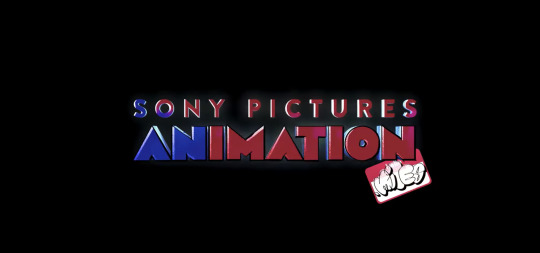
The first Miles sticker in the film is a “glitch” flashing on the Sony Pictures Animation logo. “Already putting his stamp on the movie.”

RIPeter is meant to be an amalgamation of all the Spider-Man we know, “good and bad” (as the dance happens, someone corrects him:) “Good and GREAT.”

(“I’ve got an excellent theme song, and a... so-so popsicle.”)
“That joke saved the movie.”
“The dance move or the popsicle?”
“The dance move. I resisted that dance joke and Rodney pushed hard for it (…) It told the audience what movie they were watching.”
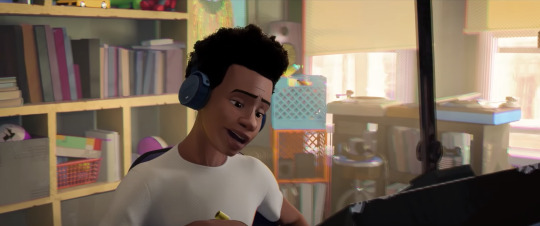
“It was Rodney who was really pushing for him to be in this relatable idea of [Miles] not knowing the lyrics to this song but singing along.”
“We started animating before the song was finished. It was really easy to not know the words then.”

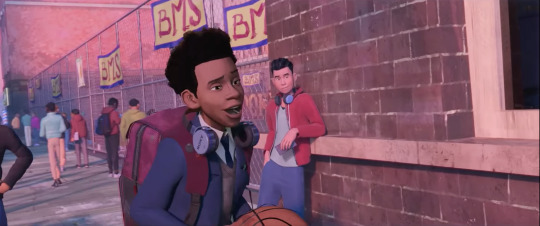

“There are three very long shots that introduce Miles.” (The shot at home, the shot of him walking past Brooklyn Middle, the shot of him entering Visions.) “That was a deliberate choice, to open with a big crazy Spider-Man montage, and then with Miles, start a different pace, long shots, and just watch him and how he is, and don’t get too fancy with it. Although ironically these shots are really fancy.” The shot of him walking past Brooklyn Middle and the one of him walking into Visions are meant to directly contradict each other: his comfort zone vs him out of place in new surroundings. (Megan’s note: My take is that with these shots they might have been trying to represent his home, his past, and his future.)
“Everything [in this scene from color to sound] is meant to go from a very heightened experience with Peter to a very naturalistic experience with Miles.”
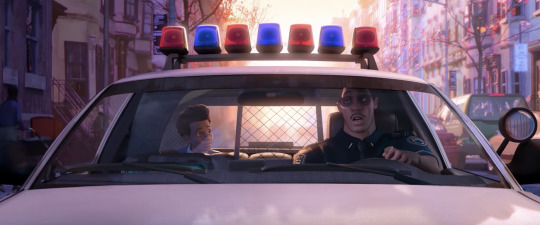
For the scene in the car, Shameik and Brian sat in chairs to set up in a car, with microphones and a rearview mirror.
“Brian might have even been a little annoyed at Shameik a couple of times, and I think you can feel it in here, in a really wonderful way.”
(Talking about the chromatic aberration)
“Sometimes it looks like you’re watching a 3D movie without the glasses on.”
“That was on purpose.”
“Every frame is supposed to feel like a piece of printed art.”
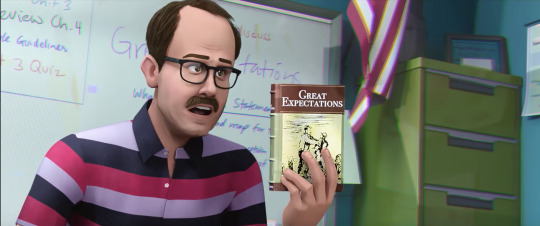
“On the cover of Great Expectations, there’s an image of Magwitch grabbing Pip’s shoulder in a cemetery.”
“Foreshadowing!”
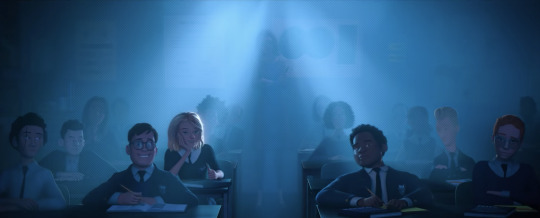
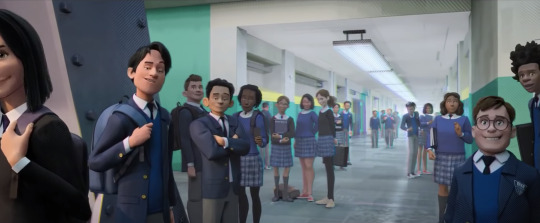
A side character named “Smiley Kid” is in several shots of miscellaneous Visions students.
“Because he’s not a real person, I think we can say he is our least favorite person.”
“I think he comes around. He’s great, then he’s bad, then he’s great again.”
“He’s like the extra in every live action who worms his way to the front of every shot.”
“He just almost always looks in the camera.”
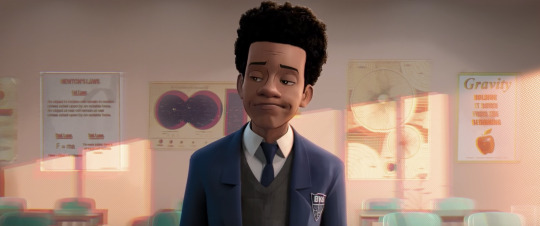
Miles’s expression when the teacher calls him out at trying to fail was “completely ripped off of President Barack Obama.”

Benson Avenue was meant to call back to where one of their fathers grew up in Bensonhurst, Brooklyn.
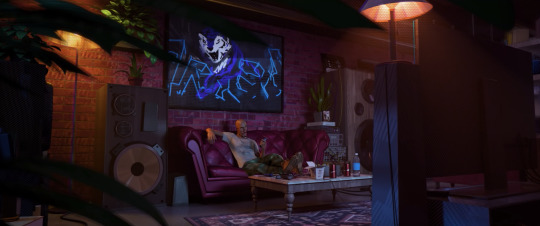
(“Hypnotize” by Notorious BIG playing on Aaron’s stereo)
“Biggie Smalls in an animated Spider-Man movie. In what universe?”
“This is the ideal timeline that we’re living in.”
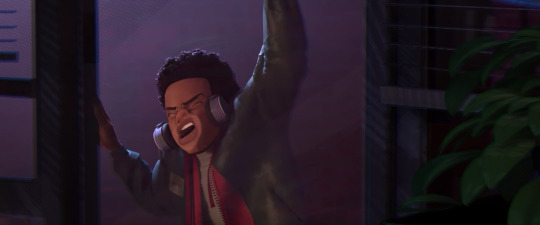
(This comment is said as Miles presses his face on the glass:) “That changed people’s perceptions of the movie. When we had this in, it really lit people up.” (To be honest, I can’t tell if this comment was made in response to Biggie Smalls, or to Miles pressing his face on the glass.)
They all loved Mahershala Ali. “The shoulder touch would work if your voice sounded like Mahershala’s.”
Everyone was in awe every time they recorded with him. “He makes you want to be a better person when you’re around him.”
“He’s got a high bar.”
“Then he goes away and it kinda wears off.”

The subway Aaron brings Miles to was a place he and Jeff used to paint in when they were young, which adds another layer to him talking about/missing Jeff when he mentions it to Miles. The age difference probably means Aaron was younger than Jeff, and now he’s the older one with Miles here.
There’s a bigger history between Jeff and Aaron that’s only hinted at, and part of it is the reason why Miles has his mother’s last name, not his father’s. It’s implied Jeff was worried his bad history would follow Miles if he took his last name. Also because “then he would be named Miles Davis.”

They were excited to depict a spider-man experiencing spider-sense for the first time.
“We did the most expensive thing. In all choices.”
“People ask, How does Miles with a cop and nurse parents afford Jordans? And the answer is, they were a gift from his uncle.”

(On Kingpin’s animation possibilities.)
“We always had this idea that he was the living expression of a black hole. The right for him is this floating head on a body that we could scale up and down depending on the shot with hands at the end of arms.”
“While creating a black hole, he is a black hole.”

Someone felt very passionate about including the dimensional map showing the other universes the collider was connecting with. “It felt so important to me.”
(Paraphrasing this one)
“Once Phil and Lord gave the MO to push convention, the gauntlet had been thrown, we started getting crazy stuff back. And a lot of the time our art direction would just be like, ‘Yeah! COOL!' ‘Do more of that!’”

(Peter rolls his eyes as the Prowler menacingly steps forward)
“I like that [RIPeter] is exhausted at the idea of being killed.”
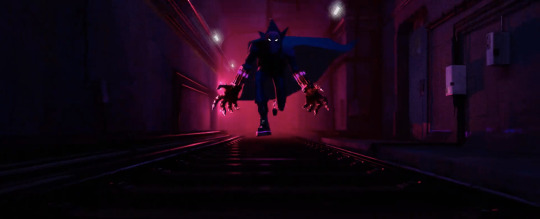
“The Prowler chase sequence was the first sequence that went through the whole pipeline.” (This and the cemetery scene were the first.)

(The burst card of Miles jumping over the subway tracks)
Bob Persichetti: “I had such high hopes to do a lot of burst cards, I think that’s the only one I actually did.”
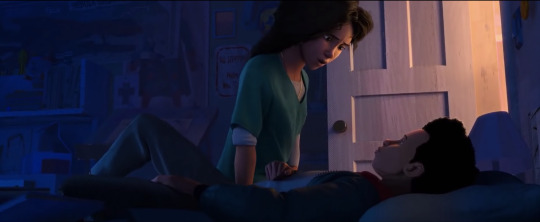
(as Rio comforts Miles in Spanish)
“We never translated on screen (…) The idea being, this is the fabric of Miles’s life.”
“This was inspired obviously by Brian Michael Bendis” (co-creator of Miles Morales and his longtime writer) “and Miles’ bicultural background. But also Phil Lord grew up in a bilingual house.”
“And I took Spanish in high school.”
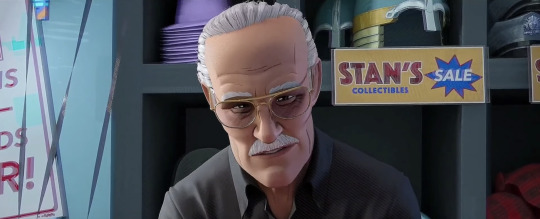
(Stan Lee cameo)
“[Stan is] the only performer in the movie who we went to. Everyone else came into recording studios, but Stan Lee, we dispatched the microphone to him.”
“Everybody wanted to animate Stan.”
“If you hit pause any time a train goes by, because everyone wanted to animate Stan, he’s in almost every single train.”
“He’s an extra in a lot.”
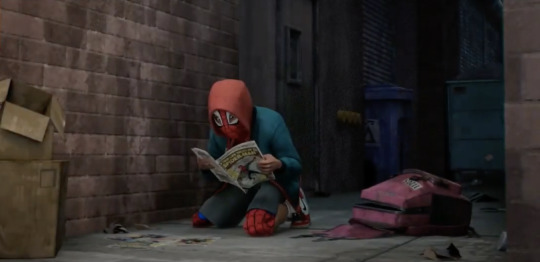
(Miles reading comics before jumping off the building)
“If you notice in that comic book, it’s True Life Tales of Spider-Man, and to keep his cover, his name is not Peter Parker. In the comic book, his name is Billy Barker.”
“Great.”
“Who could ever figure that out, right?”

A bunch of drawings around the grave of Peter Parker’s tombstone were all done by different kids of people on the show.
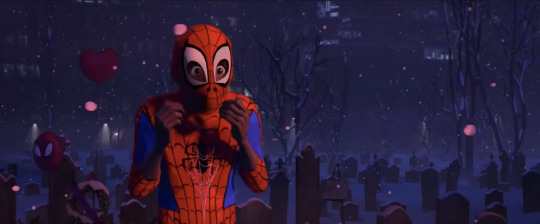
They mention the cemetery scenes was one of the first ones finalized. When they were still trying to figure out how to bring Miles to life, “you can see that his performance evolved from this [cemetery] scene.”
“It’s super expressive.”
There was lots of debate on how much paunch should be on Peter B’s stomach. There are something like 3-5 different body models used throughout the movie.
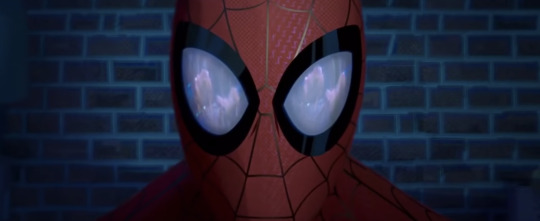
They all loved the scenes of Peter B in his apartment: the cut to him crying in the shower, to pinned to the bed with his butt out, to his pose on the futon flipping through channels. Someone really liked “[his] little quivering [spidey] eyes on the seahorse shot.”
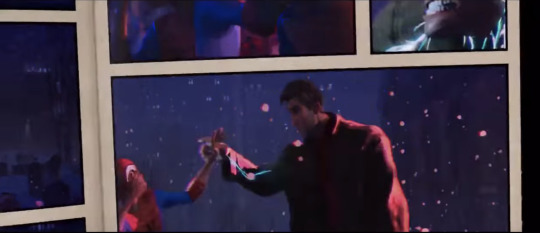
The comic book page-flipping device was a “late breaking” realization of how to transition between flashbacks and present day.
Chris Miller did the voice of the cop dispatcher on the radio saying the “Child dressed like Spider-Man dragging a homeless corpse behind a train” line.
“The role I was born to play.”
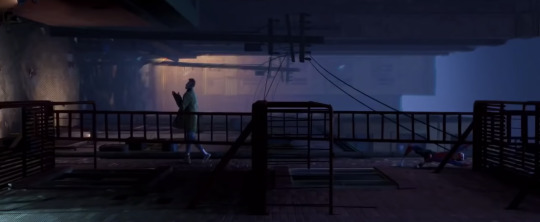
In the walk-and-talk scene in the alley, they felt inspired to take a lot of crazy shots.
“We were passionate that a Spider-Man movie needed to be shot from their point of view, where every surface can be the ground.”
“Because of questions on the internet, we took of one of Miles’s shoes. Just in case anybody wanted to know why he was sticking.”
“Another thing that I was passionate about but nobody cared about but me.”
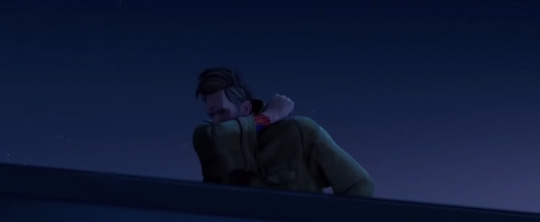
“One of the big tricks of this sequence and of this relationship was to let you believe that Peter was a good guy even though he was being a real… turkey… to Miles.”
(Peter saying “No, does it look like it’s working? No! No, it’s not…”)
“This was one of the few moments that we added kind of late just to know that he was a sweet pea underneath it all.”
“Finding the right level for his not caring about Miles, and then learning to care about Miles, finding the right level from the beginning all the way through to the end, was something that took a lot of nuance.”
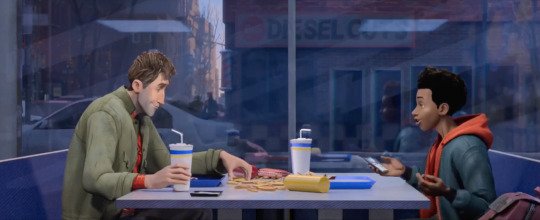
The interrogation/alley and burger scenes probably went through the most amount of reworks and rewriting than any others, because there was so much exposition and “you got tired” watching two heavy information scenes in a row. And given how often they said “this scene went through so many iterations” in this commentary, these two scenes must have been a LOT of rewrites. (Some of the alternate burger scenes can be seen in the film’s trailers and alternate universe cut.)
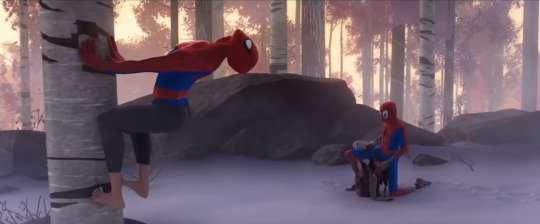
“I still kind of miss the unfinished version of this shot, where his feet… He had no toes for a really long time for some reason.”
“You had to say like fifty times, ‘We’re gonna add toes right?’”
“‘We’re gonna get his toes on there, right?’”

“One of the things about Kingpin is that he just magically appears outside of the car. Because there’s no way he could get actually get through the doorway.”
“Maybe in the future where you guys are watching this ten years from now, someone will have figured out how to animate that. But in 2018 it’s still impossible.”
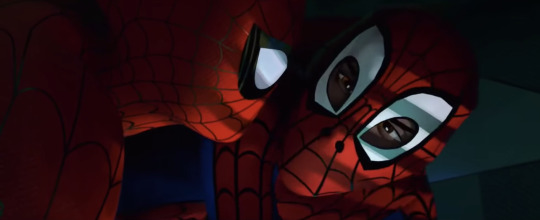
(Miles finding Peter in the vents)
“These moments were really when you started to feel the relationship between the two of them develop.”
“I love that Miles has to fight to occupy the same space and become an equal to Peter.”
(Peter mockingly blah-blahing as Doc Ock explains the danger of the collider, then saying afterward “Oh nevermind, that is bad.”)
“For the sake of a laugh, we undercut the stakes, and then immediately had to buy the stakes back.”

“We went through probably 70 different version of what Miles would look like while invisible … and I like how how he comes in and out of invisibility was stylized to some degree.”
They say the Doc Ock/Peter scene was “really really bad at one point” and now it’s “one of the most wonderful surprises.”
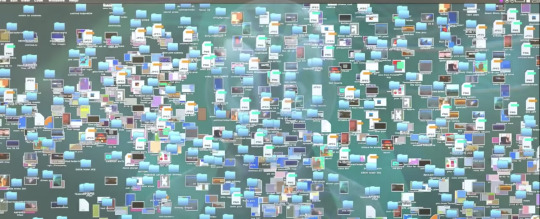
Ock’s computer is based off of Phil Lord’s actual desktop. Some files are cut off the edges of the screen because they just dragged things off of the internet.
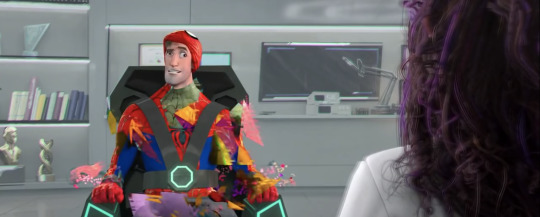
(Peter glitching in the chair)
“I’m remembering all of the conversations that determined that it was funniest if you left Peter’s head unglitched.”
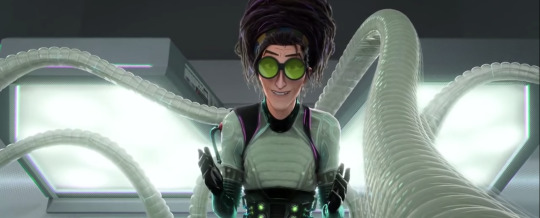
It was Justin Thompson’s idea to use soft robotics for this version of Dock Ock’s tentacles.
Everyone, from animation to the sound team, saw Doc Ock’s tentacles about 3 months before completion, went (exasperated) “Oh THAT’S what they look like? We’ll have to redo X Y Z whole thing…”
You can tell they loved the monitor joke. “Very silly things happening around very cool things.”

The Bagel! text was added last minute.
“That was a joke pitch by Justin that was taken seriously.”
“Everyone felt empowered to pitch crazy ideas, and that’s why it felt so rich and deep.”

“It’s no understatement to say that this look in the forest is one of the hardest things in a movie like this. To make something look realistic is something we know how to do pretty well. But to make it look graphic and illustrative is almost impossible.”
“Especially when you’re close and far to trees within the same shot at times.”
“We had so many conversations with Danny, our V Effects supervisor, like, ‘But, you guys, we’re going to be in a forest, you really don’t want the leaves to rustle in the wind?' ‘No, we’ll be okay!’”
(Later, when Peter and Miles swing off together, the leaves rustle:)
“See, the leaves can move, guys!”
“We just CHOSE for them not to.”
“It was an absolute creative choice.”
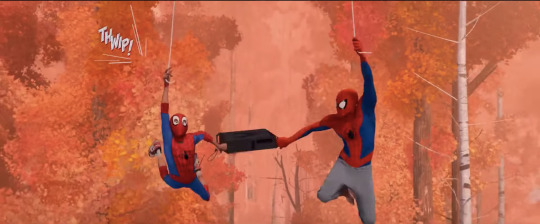
“This is another moment in the story when we really open this beat up to let Peter and Miles have a victory together and cement their bond, that you really were rooting for their relationship. We breezed through this quickly and you didn’t have the same connection with the two of them.”
“One of the things in the screenplay that we discovered really late is that you needed to have a lot of smaller, positive accomplishments throughout the center of the movie to have it work right.”
“(…) This middle section of the movie is about Peter and Miles learning to fall for each other, basically.”
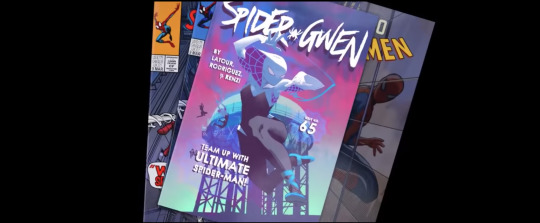
(During Gwen’s intro)
“We give just enough to hopefully tease you guys into being really into each one of these characters’ origin story.”



“One week of days and nights just passed in that one shot.”
“She hit a time anomaly on her way to this dimension.”
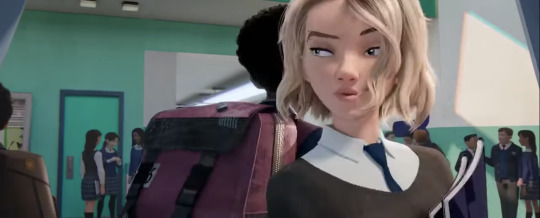
“She vibes with Miles after he had been bitten by the spider, and she purposefully bumped into him there, in case you didn’t catch that.”
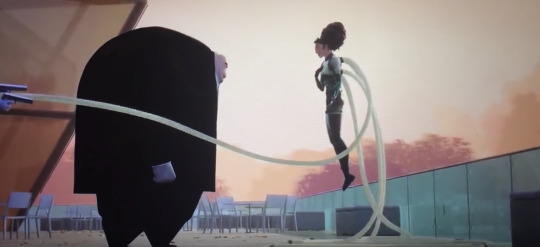
“We were trying to make Ock such an intelligent and socially awkward person that then turns into this really formidable equal to Kingpin.”
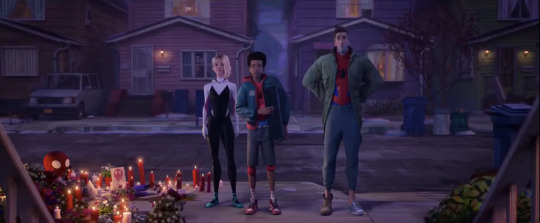
(When Peter thwips May’s doorbell and then exhales with his hands on his hips.)
“One of my favorite poses in the movie.”
“That pose gets a laugh all by itself.”
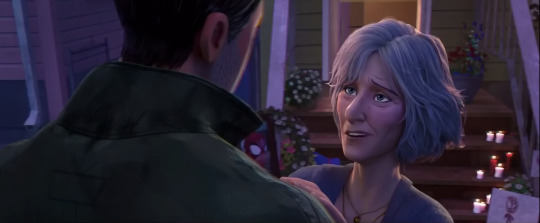
“‘You look tired’ is a thing my mom says to me every time I see her.”
“It’s accurate.”

“I fought hard to have (May) kick that door open.”
“I tried to cut that and then you uncut it, correctly.”
“Let’s be honest, she’s not treating her house very well.”
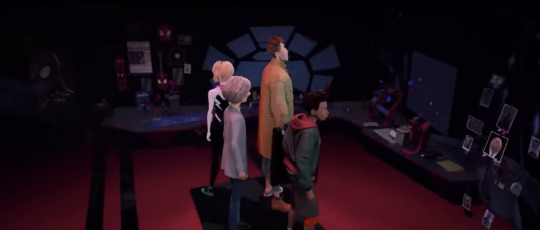
(In the Spidey Lair)
“Lots of Easter eggs here.”
“We should’ve put an actual Easter egg in this shot.”
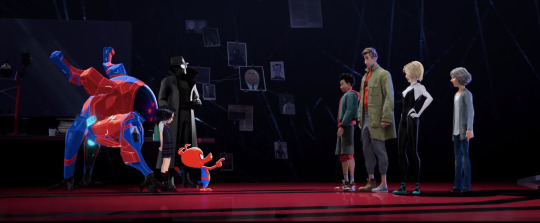
They debated for a long time putting the B-team spiders in the picture at all, knowing it would be more work, wanting to make their characters worth being in the picture without taking away from Miles.
“Nothing worked in the movie until it had something to do with Miles and his story.”

(On the spider team testing Miles:)
This angle was “late-breaking, on the backside”: “This made it feel like they all cared about Miles, even though they maybe didn’t believe in him.”
“Just Peter going ‘Cool it.’ For the longest time we didn’t have something like that.”
(Pretty sure this is Peter Ramsay) “When you’re making a movie it’s like you’re building an emotion machine. You’ve gotta have all the parts calibrated the right way, make sure it’s properly oiled, cause if it isn’t, the gears are gonna stick, and you’re not gonna feel right.”
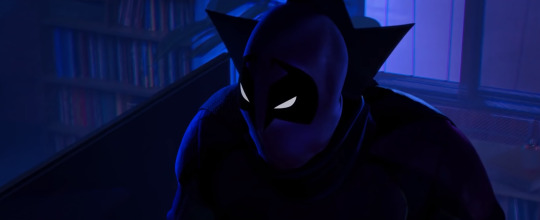
The Prowler Sound™ is not a jaguar or cat, but an elephant.
“We only did the dark scenes first cause they were easier to light.” (Some of those scenes they mention are Miles running from the Prowler, the cemetery scene, Miles writing the note in Aaron’s apartment.)
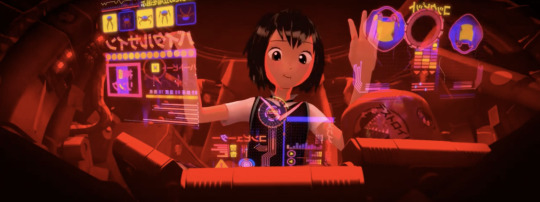
They tried about a million songs for Peni while she makes a new goober. (The song used is not in the soundtrack, but it’s “Want It Here” by Xenia Pax.)
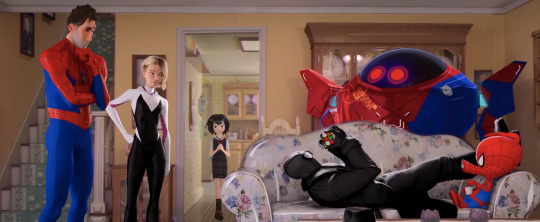
(On Peni’s Heelies)
“This shot’s not long enough to get her from the kitchen to the couch.”
“Is that why?!”
“That’s one hundred percent why. Just put those little wheelies on here!”
In the first draft, there was an idea there RIPeter was a grad student under tutelage of male Doc Ock so that’s how Liv and Ock knew each other.


“The table pushing into Miles. That was something my older brother, when we would fight when we were kids, he would do that to me.”
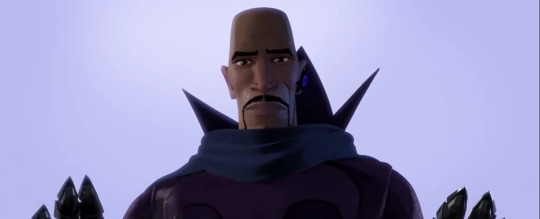
(When Aaron closes his eyes, refusing to kill Miles:)
“That little look. ‘Cause he knows what’s coming.”
(They’re all quiet as Miles carries Aaron to safety, caught up in the scene.)
“We’re all kind of gripped.”
“We’re supposed to be giving interesting anecdotes here, guys, come on.”
“It was so cold that day…”

Prowler’s death was the first session they did with Mahershala.
“He’s a method actor, and his death scene, it was like he was really dying.”
“We gave animators the freedom. You can make Miles unattractive. He can ugly cry, because this is raw and it feels so emotional.”
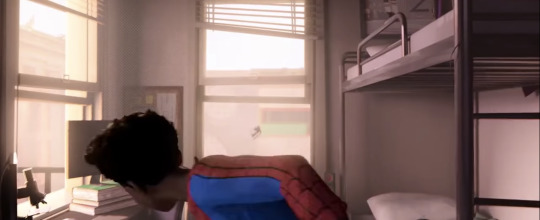
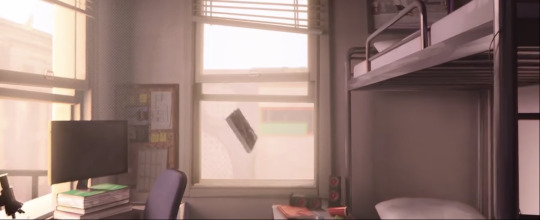
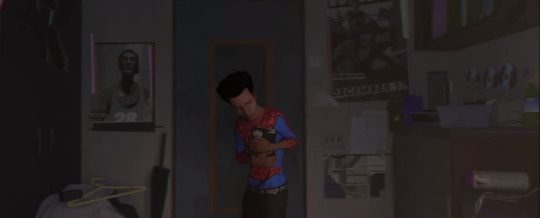
(When Miles throws his sketchbook out the window, only for it to immediately come flying back in:)
“It’s a one-shot transition from deep emotion and regret and pain. We said, ‘He’s gonna throw the one thing out that really represents his uncle, yet it’s gonna come flying back in.’ It was hard to make that shot work.”
“It’s a great story statement that you can’t lose the things that make up your past.”
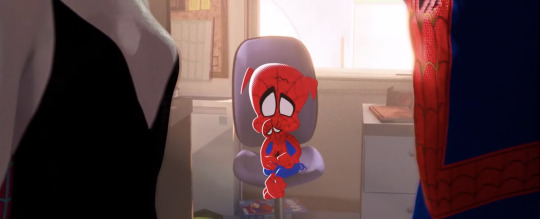
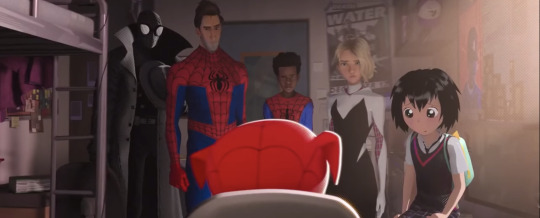
When everyone is talking about someone they’ve lost, an alternate line has Ham saying “I lost my uncle. He was electrocuted, and it smelled so good.” It got a lot of laughs, but the team says that from then on, the audience “resisted” Ham because he killed the mood, and it was hard for people to see him as anything other than a goofy cartoon, so they changed the line to “Miles, the hardest part about this job is you can’t always save everyone.” (Megan’s note: I think they probably didn’t bother to re-animate the others’ facial reactions after changing Ham’s line, because judging by the reactions from Peter and Miles in this shot it feels like Ham just said something annoying/out of place lol.)
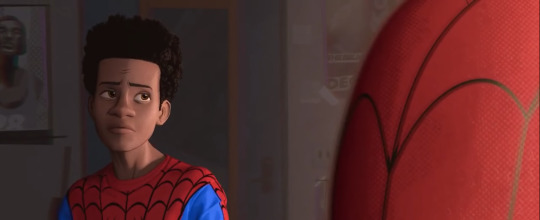
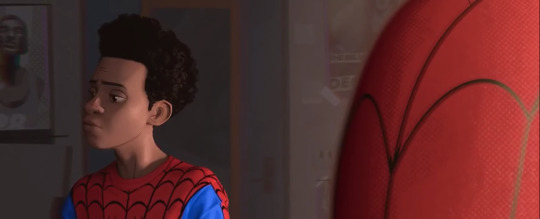
When Peter says “It wasn’t their decision” (for Miles to stay behind), Miles has a very quick reaction shot where he turns away, bites his lip, and shakes his head. Someone mentions it’s one of their favorite shots of Miles.
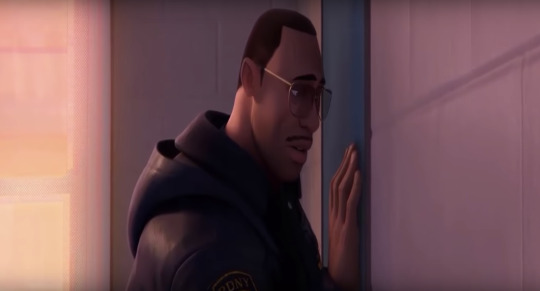
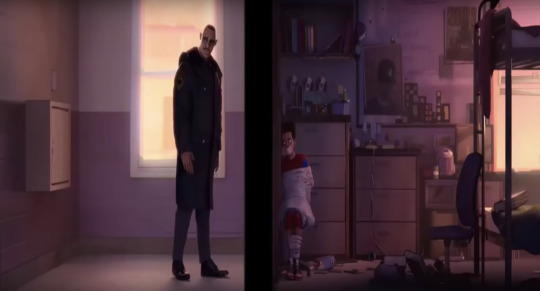
(On the scene with Miles and his dad at the door)
“When Brian Tyree Henry saw this scene [with a rough performance, just animation], he got the movie. It made such an impression on him. He was very happy to come in and pick any lines up for us and just keep working.”
“We were working on the shots on layup for this. The idea of having them be on thirds to start, then coming closer, and finally ending with the final split-screen shot at the end.”
“And Jefferson crosses the scene, which I think is really interesting. They start off on opposite sides of the screen. He makes the first move.”
“It’s amazing to me to see Miles transformed by his father.”
“It feels earned.”
“In an earlier version of that scene, Aunt May gave him a version of that speech, which was nice, but it needed to be Dad.”
(Later on, someone mentions:) “Tom was the first one to say ‘It shouldn’t be Aunt May at the door, it should be Dad.’ And we all sort of slapped our foreheads going ‘That’s absolutely right.’”
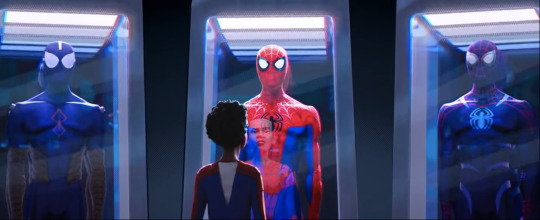
“After our premiere, my 9yo son [Luca? Luka?] asked me this. ‘So Papa, you know Miles spray-paints one of those suits and it becomes his suit. Super cool, Papa, but it shouldn’t fit him. It’s way bigger.’”
(Laughter)
“Did he have to wait a few hours for it to dry?”
"We cut out the sequence where Aunt May sewed it tighter and altered it.”
“And they had the hair-dryer express drying it. ‘Your friends are in danger.’ ‘Well just let me let it dry first!”
“I tell you, spray paint, five minutes and you’re dry.”
“She pre-altered it. She knew he was coming. She said, ‘It took you long enough.’ It all happened in advance.”

“The scene of Miles falling and everything slowing down and I always appreciated that Phil called out he was ‘falling and rising’ and the same time.”
“It made the movie. A rare thing that goes from the stage directions all the way through production and onto the screen.”

“This sequence used to end with him getting hit by a truck. But really felt like it was time for Miles to get a big victory.” (Megan’s note: This scene is shown in draft stage in the alternate universe cut. Miles makes his leap, free-runs over some trucks and buildings, and his scene is interrupted when he gets hit by a truck and crashes to the ground. There’s a moment where he collects himself, the pushes himself to his feet and runs off into the city to join the others at the collider. I interpret this idea to be their showing how Miles fully embraces the “Get back up” lesson, since Miles’s pose in the sketches imitates the same one in the basement when the spiders are hazing him and he’s on the ground.)
“And now people applaud.”
“There’s a general attitude with this movie that was like, ‘How can we do things differently?’ That was a case of when we were like, ‘What if we didn’t have the audience feel really good in this moment?” (Laughter) “What if we had them feel really bad? Right at the moment they want to feel good, what if we made them feel terrible?”
(Joking) “Let’s poke THEM in the eye.”
“I think in early drafts, we just were like, Miles is losing and falling short the whole movie until the very end. And when we put that up, we realized that you needed to see him slowly winning and winning and winning until he won even bigger at the end.”
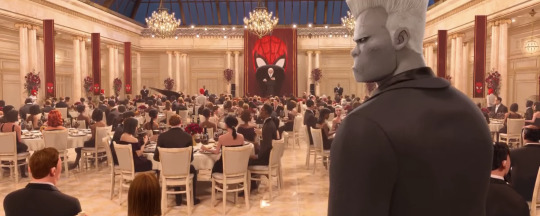
A set-up that never fully made it in the movie is that Fisk runs charities for Spider-Man and that’s why the dinner was set up like it was.
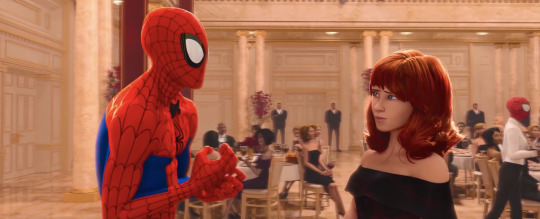
The bread scene was on the chopping block for a long time. “By adding this interaction, and making it about Peter and MJ and something real, all of a sudden this scene was worth it.”
“It’s necessary to know what Peter’s giving up by sacrificing himself.”
“It lasts just long enough because we learned that if you stay way from Miles too long--” (They interrupt here to point out two cameo people at dinner, “Danny and Josh,” who I couldn’t get a cap of) “--We lose our connection to the movie in a way. But at this point we care enough about Peter to want him to get back to MJ too.”
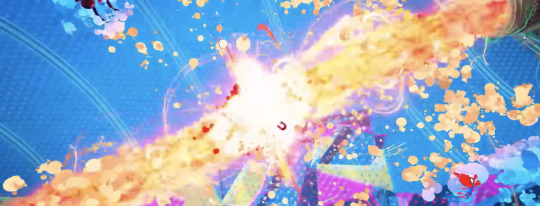
“The servers that were holding the movie were moving slow by the end of this shoot. And we had the best computers.”
“At a certain point I think we overloaded Imageworks’ server. There was a moment they were afraid the movie was going to break their machine.”
“Which was our whole idea. Our whole approach was, how do we break these pipes that make the movie?”

(During the final collider fight sequence, but they don’t specify what idea this was about specifically:)
Chris Miller: “One of the only times I can ever remember saying ‘Okay you’ve gone too far.’ There was one brand where I was like, ‘I don’t get this.’ A few of the drawings that were somehow even more insane than this.”
“What you’re saying, Chris, is that there’s a version of this scene that’s even crazier than this?”
“Literally the only time I can remember going, ‘Okay guys, you’ve done it. You’ve broken it.’”
“I’m sure there’s are filmmakers watching this, so I think this is a learnable lesson from this sequence. Which is if you want to put something super crazy in your movie, wait until the very end when a lot of movie has been spent on your movie and your release date is 3 to 4 months away and they literally cannot stop you or else they have no movie.”

One of them points out Miles webs a turntable to propel himself upward. (Megan’s note: Miles also does this just as his own theme starts playing, which starts off with a record-scratch. I thought that was cool.)
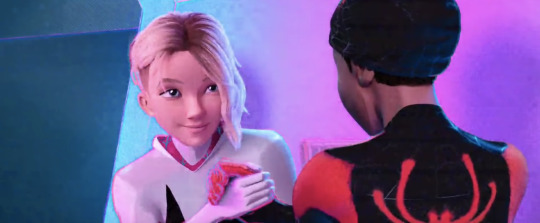
(The moment when Gwen calls Miles “Spider-Man”:)
“That choice went through a lot of iterations like “What’s the end of their relationship?” That she calls him Spider-Man instead of giving him a kiss on the cheek? It makes me well up just thinking about it.”
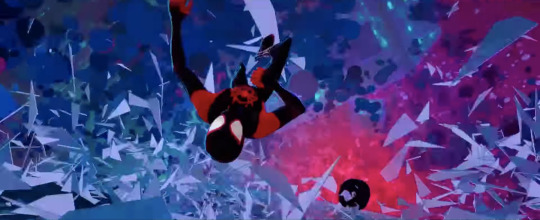
Kingpin breaks the glass of a building and the pieces fly toward Miles. Bob Persichetti calls these “Dorito chips.”
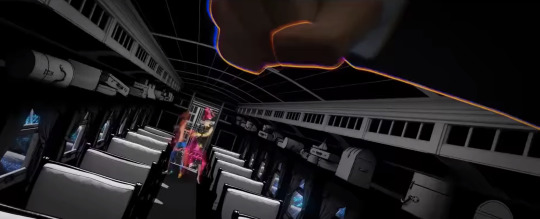

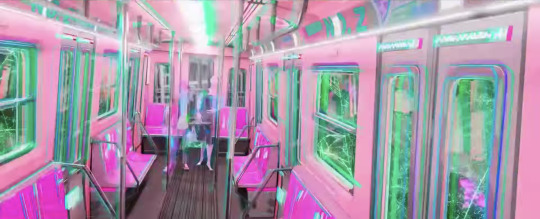
After the train enters a collider steam, there are versions of the interior of the train that flash from all five dimensions. There’s a futuristic Peni version, an old-timey Noir version, there’s a Gwen version… “As it passes through the beam, you get to see five versions of the train existing at once.”
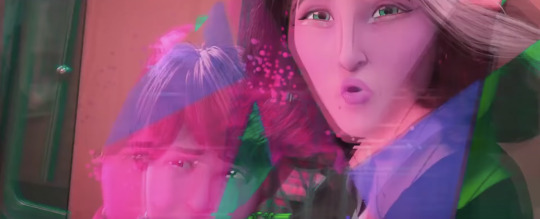
(Vanessa and Richard seeing Kingpin)
“This idea of repeating mistakes (for Kingpin). No matter what, he was gong to keep repeating these mistakes.”
“He’s still who he is.”

“It was my dream to have Kingpin headbutt Miles and it finally came true.”

Each one of these character is in a black costume, and black surrounds them, and yet you can still see what’s happening.

“I remember people wanting to cut the shoulder-touch at the end.”
“Who wanted to cut this?!”
(Overlapping chatter)
“No names in the screen.”
“I remember feeling, oh my god. You’re LUCKY you got the shoulder touch in.”
“The fact that you could pay off a set up that wasn’t even a set up…”
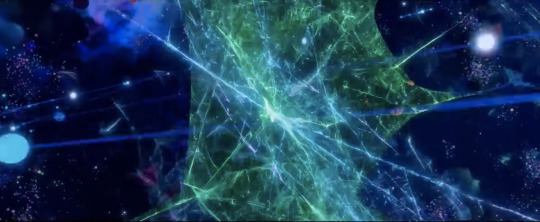
(On Miles seeing inside the universe as the collider explodes)
“And then this. How long can it be? Let’s make it way too long!”

“The Anvil (that clanks at the end) was in Ham’s pocket?”
“In the hammer space.”

(Miles hugs Jefferson)
“This was the moment everybody went ‘Oh, YES.’ No matter what, we have to get to the hug, and the disguised voice, and the ‘I love you.’”
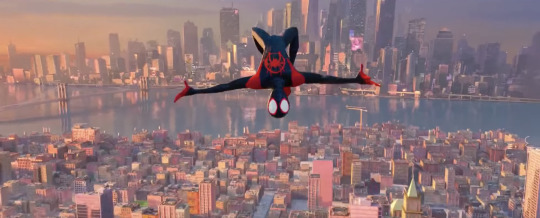
Someone describes the ending soundtrack as “Miles’ playlist meets Aaron’s playlist meets a superhero movie.”
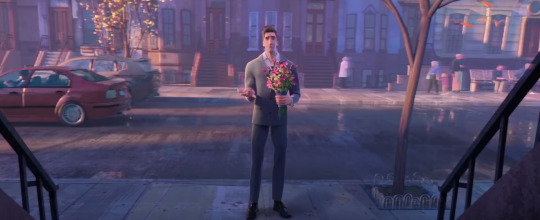
They indirectly confirm Peter B and MJ do get back together. “Peter B gets his happy ending.” Another bit someone mentions was a late addition.

“I like that the movie starts and ends with Miles in his bedroom by himself.”
“We could do a whole other commentary saying completely different things.”
“Probably four.”
“We should do an alternate universe commentary.”
“You’re your own champion, I think that’s the idea. This is a story of empowerment. A champion is not coming from outside of you to come and save you. It’s your job.”
(As the credits roll)
“Every name you see right now, we’ve seen them cry.”
“We’ve made them cry.”
“Every name you see right now has yelled at us.”
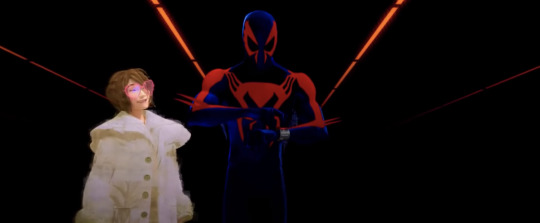
(On the post-credits scene)
“We thought of this (post-credits scene) two months ago.” (They recorded this commentary in Dec 2018.)
“We wanted to get Miguel in there and show the opportunities of where the multiverse could go.”
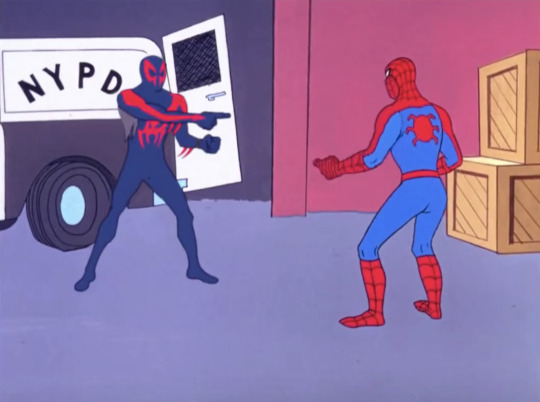
“I looked this up. This IS the most expensive dumb joke of all time.”
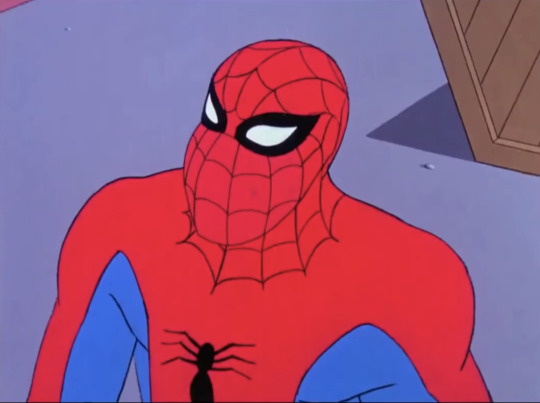
“We didn’t finish cleaning the cell on that close-up of Spider-Man.”
28 notes
·
View notes
Text
So, Let’s Talk ‘Love Death and Robots’ (Episodes 1-9)

Netflix's newest foray into the world of adult-oriented animation Love Death and Robots is one more nail in the coffin of the notion that any adult cartoon has to suck off the teat of Family Guy or South Park.
The spiritual successor to the 80s sci-fi animation anthology Heavy Metal (in more ways than one, since LDaR was originally supposed to be a Heavy Metal reboot but lack of funding and copyright hell got in the way), Love Death and Robots gives us 18 different short stories brought to the screen in the medium of animation that range in all emotions from shock, horror, disgust, sympathy, hope, and, yes, even sadness.
Just like I did with Season 4 of Black Mirror, I am going to give my personal thoughts on each segment for those who want to know what they're getting into. However, since each of the stories in Love Death and Robots only range between 8 and 17 minutes, I will not go into spoilers.
Also, to do things a bit differently, I will also add in the ratings of 'Did it Have a Robot – Yes? Or No?', to reveal if the sci-fi elements in a story were prominent or if it was more fantasy-oriented, and 'Could this Stand Its Own as a Feature Film/TV Series?' to reveal, well, just that.
Tl:Dr – I personally found Love Death and Robots to be a very-much welcome breath of fresh air to both the fields of adult animation and anthology shows. I forget what medium/site posted it but there's the sentiment of Love Death and Robots being what Black Mirror has been striving to be for its past two seasons.
And, yes, that comment is pretty damn appropriate. Love Death and Robots elegantly combines the darkness and unease of the technological unknown of the scientific condition with looks at the human condition as well as snarky dark humor. If you can stand blood, gore, and the occasional female-presenting nipple, you should definitely give it a watch.
And now, for the actual thoughts on each story individually. Remember, no spoilers.
Episode 1 - Sonnie's Edge
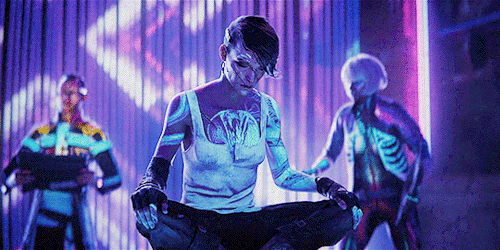
Be still, my Teratophile heart. Love Death and Robots' first entry hits the ground running, slashing, and biting with a strong female character and the dismal underground world that she’s successfully made her bitch. The first half of this short grabs you and doesn't let go until the second half starts and, admittedly, slows things down. Breathtaking for sure, Sonnie's Edge isn't my personal favorite of the anthology, but I can definitely see where a good chunk of the money went for LDaR.
… I also see this story getting the same treatment by tumblr that this website did to the San Junipiero episode of Black Mirror.
Did it Have a Robot – Yes? Or No?
Bio-Mechanical Engineering of minor-kaiju type monsters. Also, the mental link software used for fighters to connect with said creations.
Could this Stand Its Own as a Feature Film/TV Series?
Yes, yes, a thousand times yes to a TV series of Sonnie's Edge. Unlike some of the other stories in LDaR, the nuances and universe set up by the brief glance we got would work wonders if worked into a 12 episode show.
Episode 2 – Three Robots
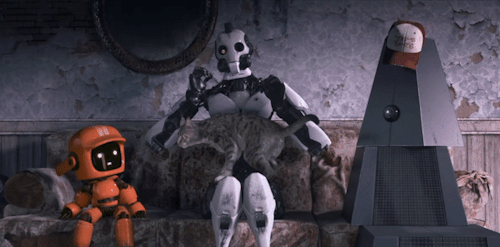
In the biggest full-frontal flip of tone, Three Robots yanks us out of the grimy Cyberpunk future of Episode 1, to a comedic look at a post-apocalyptic one with our titular three robots taking a sight-seeing tour through a long-decimated city. Discussions are had about human nature from a neutral, but still comical, outside point of view and that's all I will say because, going any further will bring in spoilers.
Did it Have a Robot – Yes? Or No?
Three of them, in fact, each representing a different aspect of robotics: one sleek and cold-looking, one humanoid with a neutral face, and the human-friendly models.
Could this Stand Its Own as a Feature Film/TV Series?
Honestly... No. The story, as well as its ending serve their purpose best at the length and scope it has in its run-time.
Episode 3 – The Witness
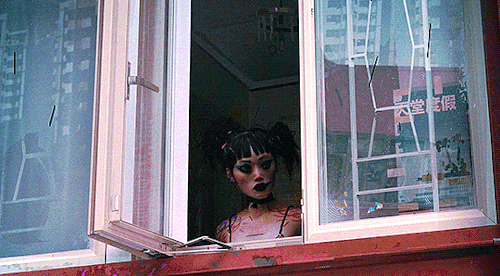
'Yeah, but –'
No.
'If you just –'
No.
'It really is one of the best on--'
NAH, G, THIS AIN'T IT!
There needs to be a phrase: 'Cool Universe; Shit Story, Brah' to slap onto pieces of media that have a great aesthetic and a great universe on display... But just an awful story.
Because The Witness fits that phrase to a tee. If anything, the only aspect that The Witness has going for it is the stark color scheme against the dismal urban landscape and the sex.
Lots. And. Lots of boob-shots and bush-shots in this one, folks.
Did it Have a Robot – Yes? Or No?
Did it? I don't even know what kind of technology was displayed in this episode. Apartment-based leather sex-clubs?
Could this Stand Its Own as a Feature Film/TV Series?
This would probably have been much better if it had an hour or so to build up the characters and the twist rather than flashing everything at a breakneck pace and forcing us to sit through a drag of a story.
Episode 4 – Suits
(No gif for this one; tumblr, you guys are slacking)
Best. In. Fucking. Show.
This one is definitely one of my top two favorites for the entire series. Everything is there: character, universe, writing, it's all great. Especially since, considering that it follows the 'Last Stand' trope and it would have been extremely easy for the writers to go 100% grim and miserable.
No, that... * sigh * that comes later.
You like farmers? You like mechas? You like farmers in mechas fighting aliens? You will now!
Did it Have a Robot – Yes? Or No?
Yes, several of them!
Could this Stand Its Own as a Feature Film/TV Series?
If we ever got to a point where Pixar made films for adult audiences, a feature-length look at the universe of Suits would be the vein they would need to hit.
Just maybe with a less noticeable frame-rate 'style'.
I'd also like to add this: a lot of people these days seem to have the issue with sci-fi and fantasy-oriented media because they feel as though they only cater to kids/teens (either the characters will be 'young adults fighting “teh systemzz” or high school bullshit). That and the worlds depicted don't draw anyone in due to how... unrelatable they are.
The fact that the characters in Suits are your typical hard-working, middle-aged farmers just trying to live their lives... while still having to fight carnivorous aliens in mecha-suits re-purposed from farming equipment really makes the short seem that much more human.
Episode 5 – Sucker of Souls
(No gif, again...)
Oh boy! The Castlevania Cinematic Universe looks great!
Seriously, this was the first moment during my viewing of LDaR were I was left wondering 'I thought... this was a sci-fi anthology..?'
That being said, though, I'm always a sucker for unique hand-drawn animation and the abrasiveness of the characters flow nicely together. Even though you can pretty much tell, at the five minute mark, that things may not end up too well, it's a fun ride in the same vein as the Brendan Fraser Mummy films.
Did it Have a Robot – Yes? Or No?
Well, you see, the thing is, I – No.
Could this Stand Its Own as a Feature Film/TV Series?
It probably could be a good Adult Swim animated series (in the same vein as The Venture Bros). But, other than that, it stands fine on its own.
Episode 6 – When the Yogurt Took Over

(Gif not from the show but still appropriate)
This... Seems to be the dividing point for a lot of people in regards to LDaR. You have a lot of people saying 'Oh, this one was dumb; it didn't make sense' or 'the animation was too cute to be so gruesome'.
Everyone is entitled to their own opinions. However, a lot of the people complaining that it was dumb or didn't make sense probably didn't grow up with the same dark comedy/gallows humor that many of us did/have sought out. Things like Little Shop of Horrors, Dr. Strangelove, Sayonara Zetsubou-sensei, Dead Like Me, Metalocalypse, Black Dynamite (the animated series), and others that I can't find right now because Google keeps trying to recommend me to Family Guy of all things when I type in my searches.
The story here is short, poignant, and pretty close to home despite the title giving you what you're getting on the tin.
Did it Have a Robot – Yes? Or No?
Not really a robot... But the scientists in the story were working with genetic engineering. So, there you go.
Could this Stand Its Own as a Feature Film/TV Series?
Mm... No. This is another 'watch it as is and get the best effect' story.
One more thing, though: The Narrator of this story is none other than Maurice LaMarche.
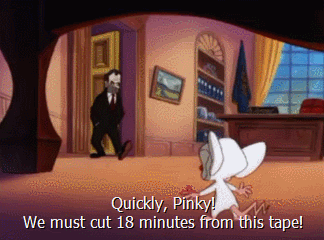
Mother-fucking BRAIN from Pinky and the Brain!
Episode 7 – Beyond the Aquila Rift
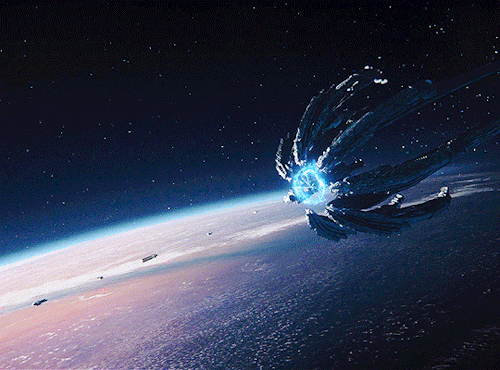
It is... so hard to do Cosmic Horror correctly in recent times. The notion of creating tales that show just how small we are in the grand-scheme of the sleeping nightmare behemoths who keep the universe running in the space between their frantic thoughts... Is overwhelming to a lot of people. So a lot of first-time attempts at it ultimately fail.
This story, Beyond the Aquila Rift, is one of my favorite entries to LDaR. Right up there with Suits.
And I will leave it at that.
Did it Have a Robot – Yes? Or No?
Space-travel, hibernation gel/tubes, space-stations.
Could this Stand Its Own as a Feature Film/TV Series?
And even that is a hard maybe because while you could build up the characters and their relationships a bit more, the resolution of this story works fine either way.
Episode 8 – Good Hunting
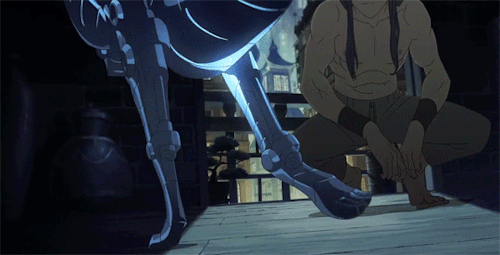
Is... Issat – Is that GOOD Steampunk in front of me? Oh Lord, it's been years! More hand-drawn animation for this one but the way it melds not only technology, magic, imperialism, and friendship but still incorporates the message that technology and progress can be used for great good and great evil... It depends on the morality of those wielding/pushing for it... Is really a high point in both writing and execution.
The animation, especially whenever the technological aspect comes in, really shines.
… You know, in hindsight, that last line could be seen in bad taste.
Did it Have a Robot – Yes? Or No?
The whole set-up is British Imperialist forces bringing Steampunk and subjugation to China. So, yeah, a lot of copper and a lot of steam in here.
Could this Stand Its Own as a Feature Film/TV Series?
I know I've been shoving everything into 'could shine as a film on its own' category, but Good Hunting really is the type of story I would love to see expanded out and directed by someone like the late Satoshi Kon (Paranoia Agent, Paprika, Millennium Actress).
Episode 9 – The Dump
(Honestly, I’m not even sad that I can’t find a gif for this one)
This one... Ah... This one.
I ... Hm.
Y-you want to see old, dangly redneck penis? Y-you see old, dangly redneck penis for a good few seconds in this one.
But, yeah, this one is definitely... a story. Your typical 'stuffy white-guy pencil-pusher comes to scare old, grungy countryman off of his land/old, grungy countryman decides to tell stuffy white-guy pencil-pusher the story of why he's on said land...
And to go any further would be spoilers.
It's not bad, it's just... Interesting.
Did it Have a Robot – Yes? Or No?
Well, it depends. Do you see pollution as more an aspect of sci-fi or an aspect of socioeconomic discussion?
Could this Stand Its Own as a Feature Film/TV Series?
I don't think anyone would want to see more of this story in either form, truth be told. It exists fine on its own.
And that's Part 1 of my little write-up on Love Death and Robots. This got a little long so I'll be posting Part 2 tomorrow and linking it HERE when I do! Seriously, if you can you should definitely watch the series and support some good adult animation so Netflix will push for more stuff like LDaR, Bojack Horseman, Aggretsuko, and The Kirlian Frequency... And less stuff like that damn 'Brickleberry But They're COOOPS This Time~!!'
63 notes
·
View notes